
QUBE PORTS VICTORY: Wharfies lock in massive wins in new EBA, p6
HOWARD CONSPIRACY CONFIRMED: New evidence unearthed from '98 waterfront war, p29
GAZA WAR FRONTLINE: Humanitarian crisis through the eyes of MWJ's reporter, p52


QUBE PORTS VICTORY: Wharfies lock in massive wins in new EBA, p6
HOWARD CONSPIRACY CONFIRMED: New evidence unearthed from '98 waterfront war, p29
GAZA WAR FRONTLINE: Humanitarian crisis through the eyes of MWJ's reporter, p52
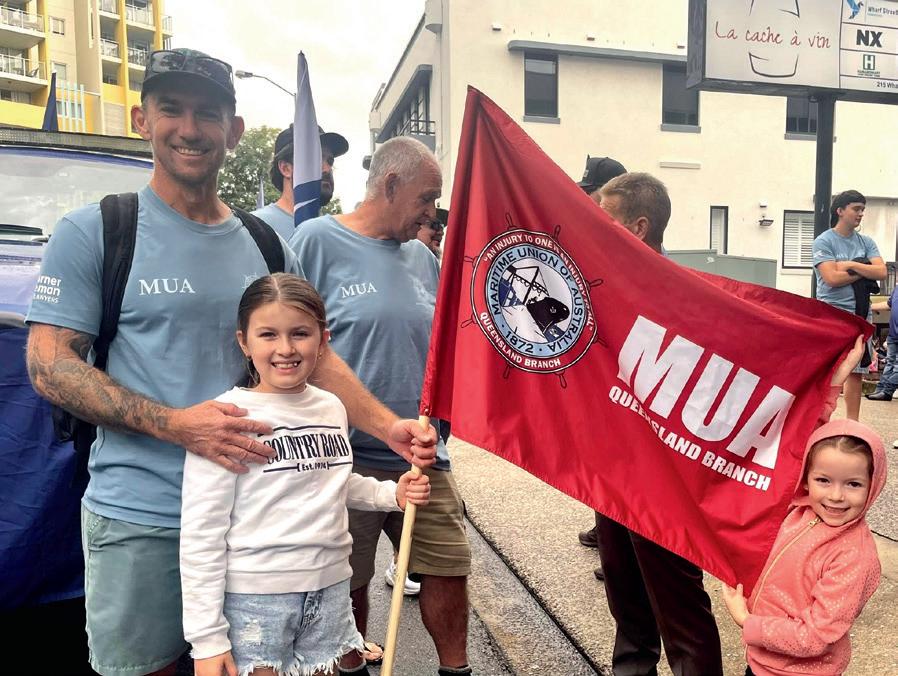
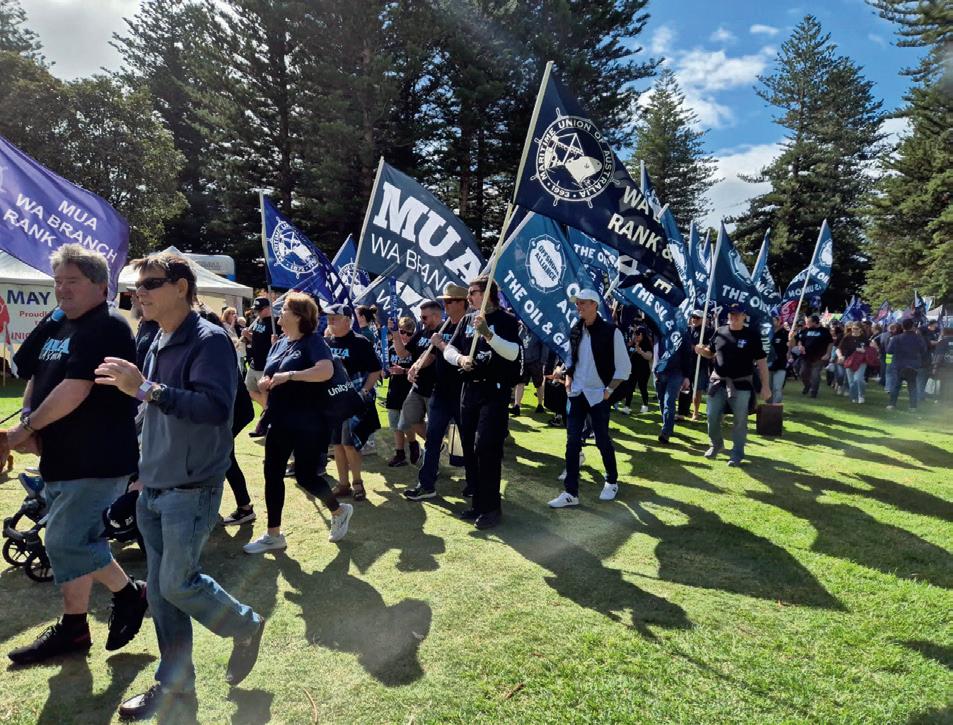
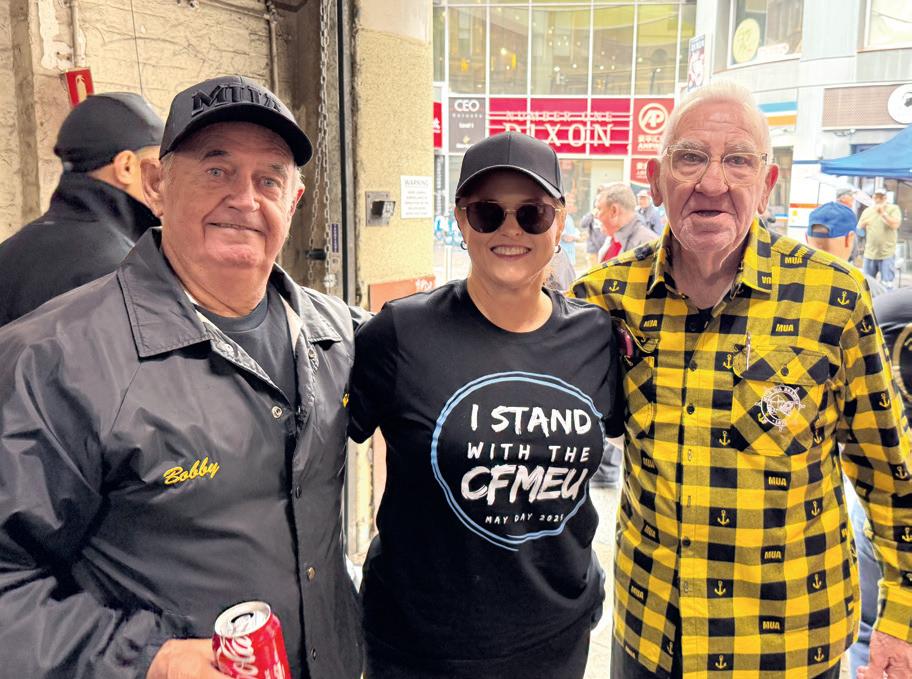
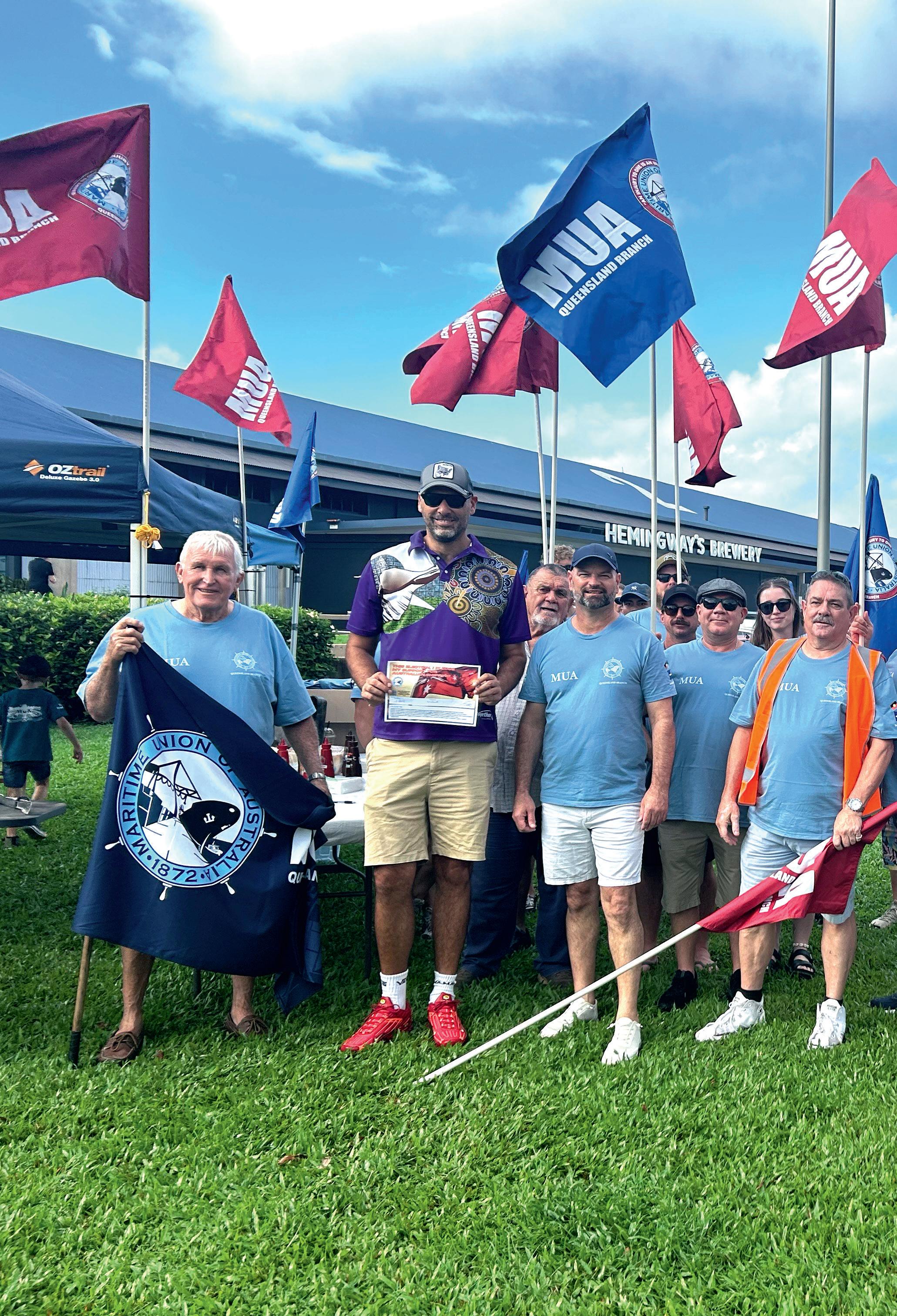
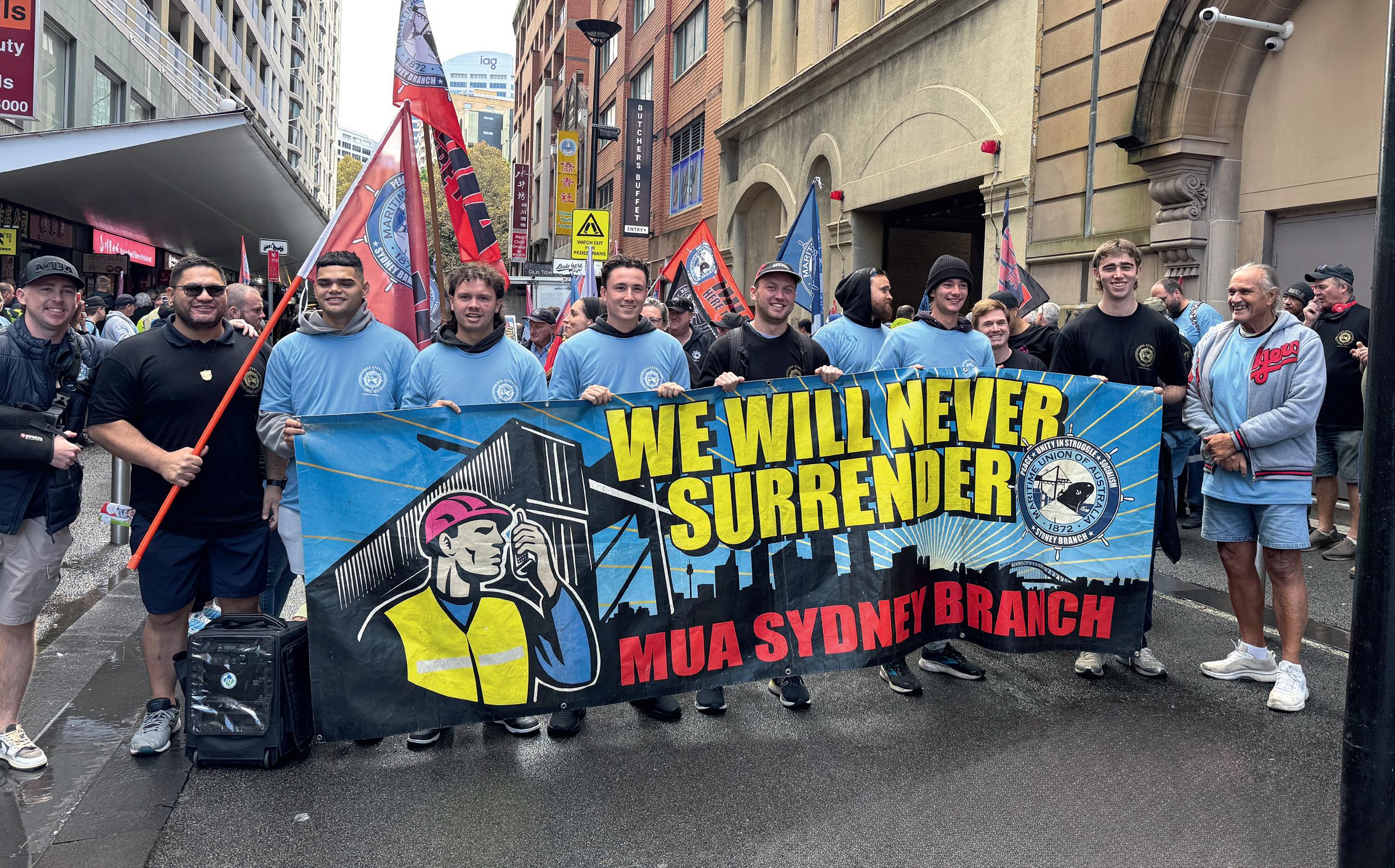

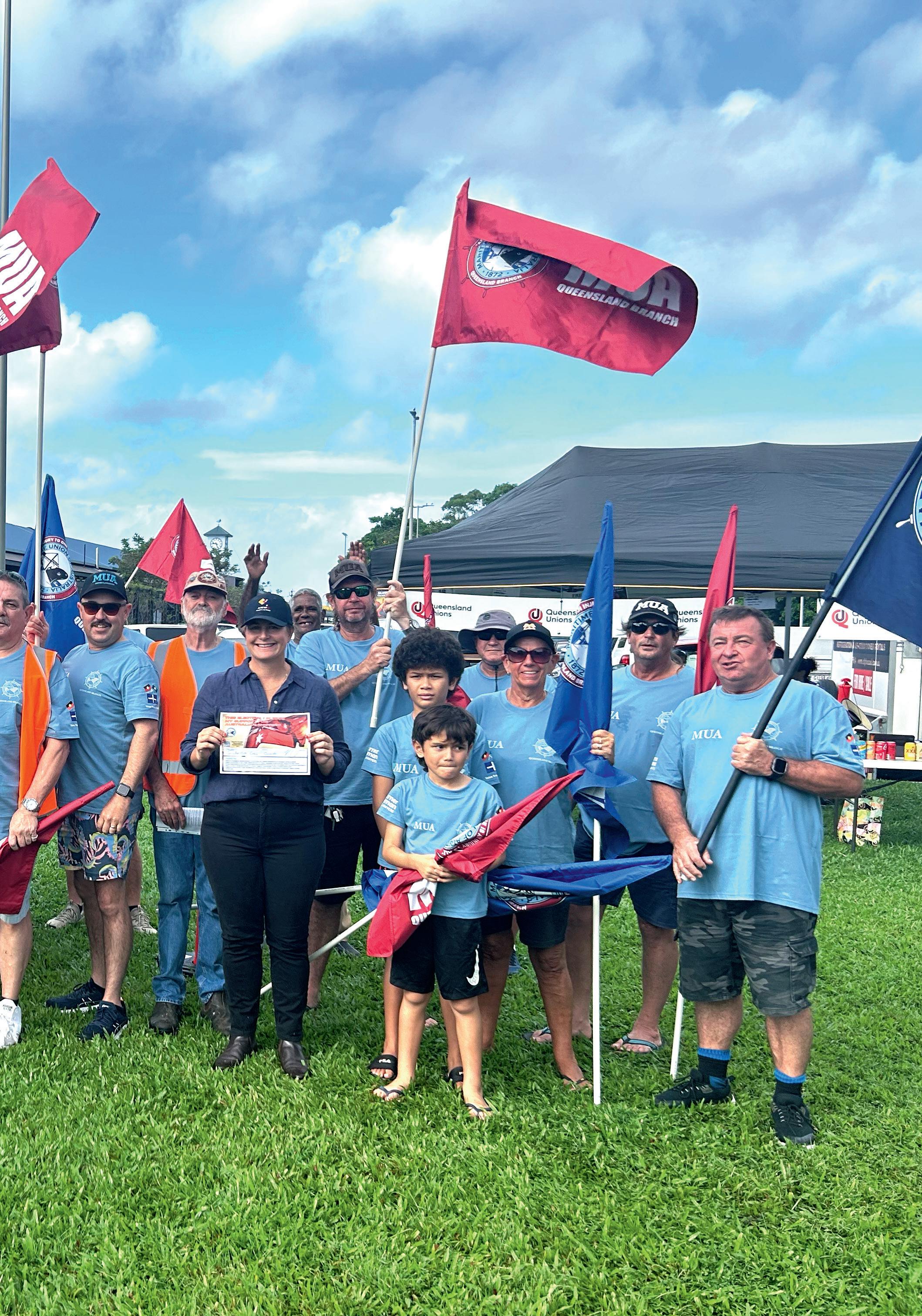

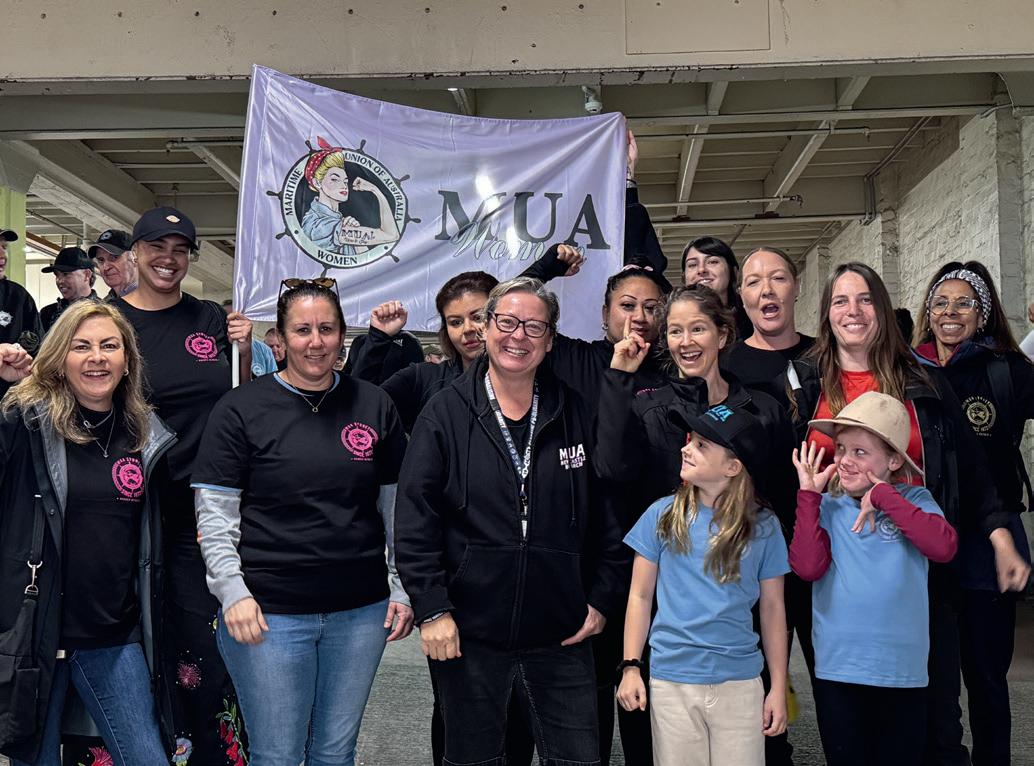
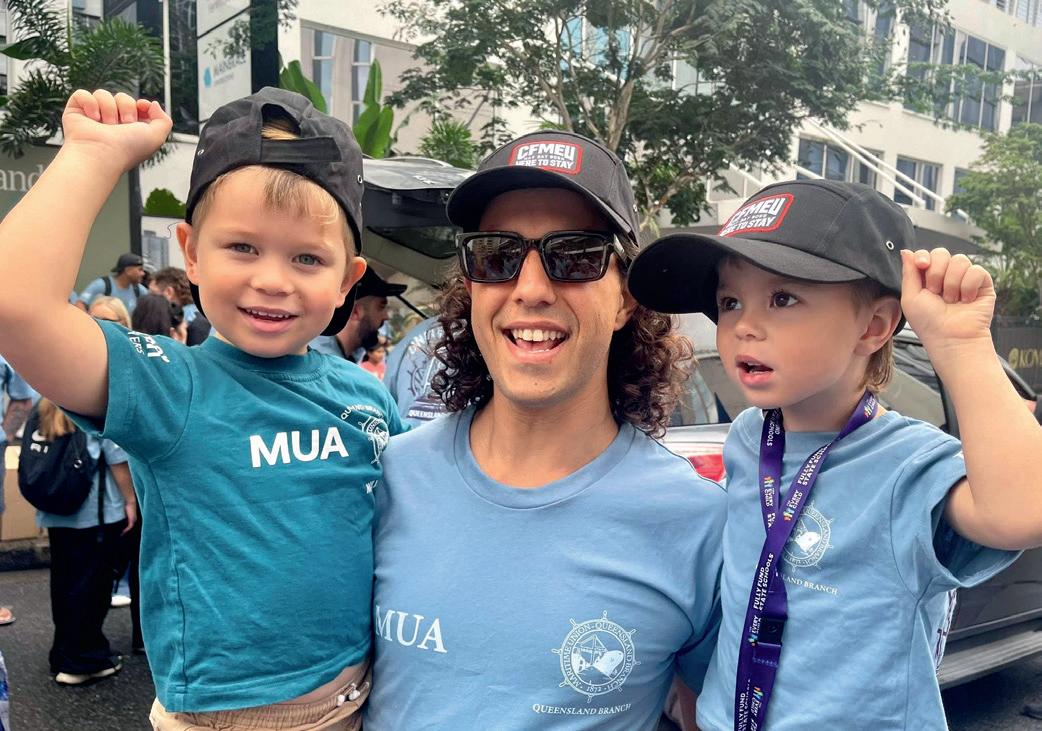

Robots proven to be slower, less safe than wharfies
MUA stands with First Nations against CSG in forest fight
New evidence reveals Howard Govt plot
Union organises P&Ds on Sydney waterfront
Israeli starvation and blockade tactics causing unimaginable suffering
FRONT COVER: DP World cyber fantasy - illustration by Lx9 Design
INSIDE COVER: May Day 2025 celebrated by MUA branches across Australia
EDITOR IN CHIEF Paddy Crumlin DESIGN Louise@Lx9Design.com
PRINTER Planet Press
Maritime Workers’ Journal
365-375 Sussex Street Sydney NSW 2000
Contact: (02) 9267 9134
Fax: (02) 9261 3481
Email: journal@mua.org.au
Website: http://www.mua.org.au
MWJ reserves the right at all times to edit and/ or reduce any articles or letters to be published. Publication No: 1235
For all story ideas, letters, obituaries, please email journal@mua.org.au
At a time when national and international security are at a critical point of concern and with 99% of Australian imports and exports being transported by sea and so through our ports, our supply chains have never been more critical. So too are the government policies and legislation that secure them.
The social progress and economic prosperity which is made possible by Australia’s international trading is fundamentally delivered by Australian maritime workers. These workers, be they seafarers or wharfies or other Australian workers in the supply chain, stand at this critical juncture within our globally connected supply chain and provide their labour in all manner of circumstances.
We have consistently delivered this supply chain security through 150 years of our nation’s and union’s history, including through two world wars and countless other major crises.
We have consistently adapted to change of all kinds and consistently delivered the job regardless of the challenges and attacks on us including at times misinformation, lies, and political attack from the media, international ship owners and conservative political and commercial self interest. Today we are proud to be uniquely flexible and committed workers who fully understand the role we play in Australia’s economic and social wealth and we are fully engaged in a network of international seafarers and dockworkers who consistently face with the same or similar political attacks.
DP World are the latest reiteration of these attacks. You can read more about it on Pages 12 to 14, however as a starting point, the international dockworkers movement, the MUA and the ITF reject the nonsense that robots can do our jobs productively, safely, and efficiently. All metrics and
data demonstrate that this approach to automation is a political and industrial confrontation and not a framework for better and more decent work including productive outcomes.
Automated terminals are slower, more dangerous and extraordinarily more expensive. The only conclusion that can be made is that it is a tool in the worst tradition of union busting and industrial confrontation.
This attack by DP World is camouflaged by the excitement surrounding AI widgets, including by making the false connection that AI can play an effective role in container terminal operations. The dinner-party chat around ChatGPT is understandably focused on generative or language-model AI tools’ capacity to ape words and phrases it has copied into its database from 30 years of website publishing.
While these tools are mostly directed at some low-level white collar work. This is a legitimate focus for the trade union movement as a whole, but it cannot be implemented at the expense of the workforce. The ACTU has already flagged this as a matter for the upcoming Productivity Roundtable.
As the Federal Government continues to put in place the agreed and recommended policy, legislative and treasury measures to enable their signature commitment to shipping policy through the Strategic Fleet, Australians along with the international community continue to engage with the new challenges and tensions being caused by Donald Trump’s return to the White House. AUKUS continues to be reviewed, with a price tag of $368 billion. Notwithstanding ongoing debate on the process, the Australian Government is under enormous pressure from the US, alongside NATO countries, to deliver a significant defense budget increase. Missing in much of the debate is the need for
a massive investment in strategic infrastructure, particularly in domestic maritime supply chains through cabotage and the strategic fleet. The Australian Government has committed to securing that supply chain including by establishing its own liquid fuel security and ensuring our shipping and container port infrastructure isn’t at risk of interference and disruption by foreign governments or political and commercial interests.
Our imports and exports are currently under immense pressure from international shipping cartels who control scheduling, capacities and port calls. The current cabotage legislation is riddled with loopholes, inconsistencies, gaps and manipulative practices. There is an international crisis in maritime skills and training. National security issues in ports along with the focus on the delivery of a Future Built in Australia are all heavily dependent on the strategic, social and economic dividend payable from investment in the new Australian shipping capacities.
’98 Patricks conspiracy confirmed yet again
Consistent with the almost continuous political and industrial attacks and conspiracies against the Maritime Union of Australia, this edition of MWJ reproduces an ABC article by Dr Geraldine Fela exposing new evidence about the Howard Government conspiracy to destroy the MUA and replace Australian wharfies on the waterfront with mercenaries trained in Dubai along with the undermining of the domestic shipping industry including the removal of the Seafarers’ Engagement System and the subsequent abuses of cabotage.
This dispute was a turning point for our Union in the years after amalgamation of the Seamen’s Union of Australia and the Waterside Workers Federation. For decades, we have demanded accountability, transparency and justice in the wake of the obvious collusion between the Howard
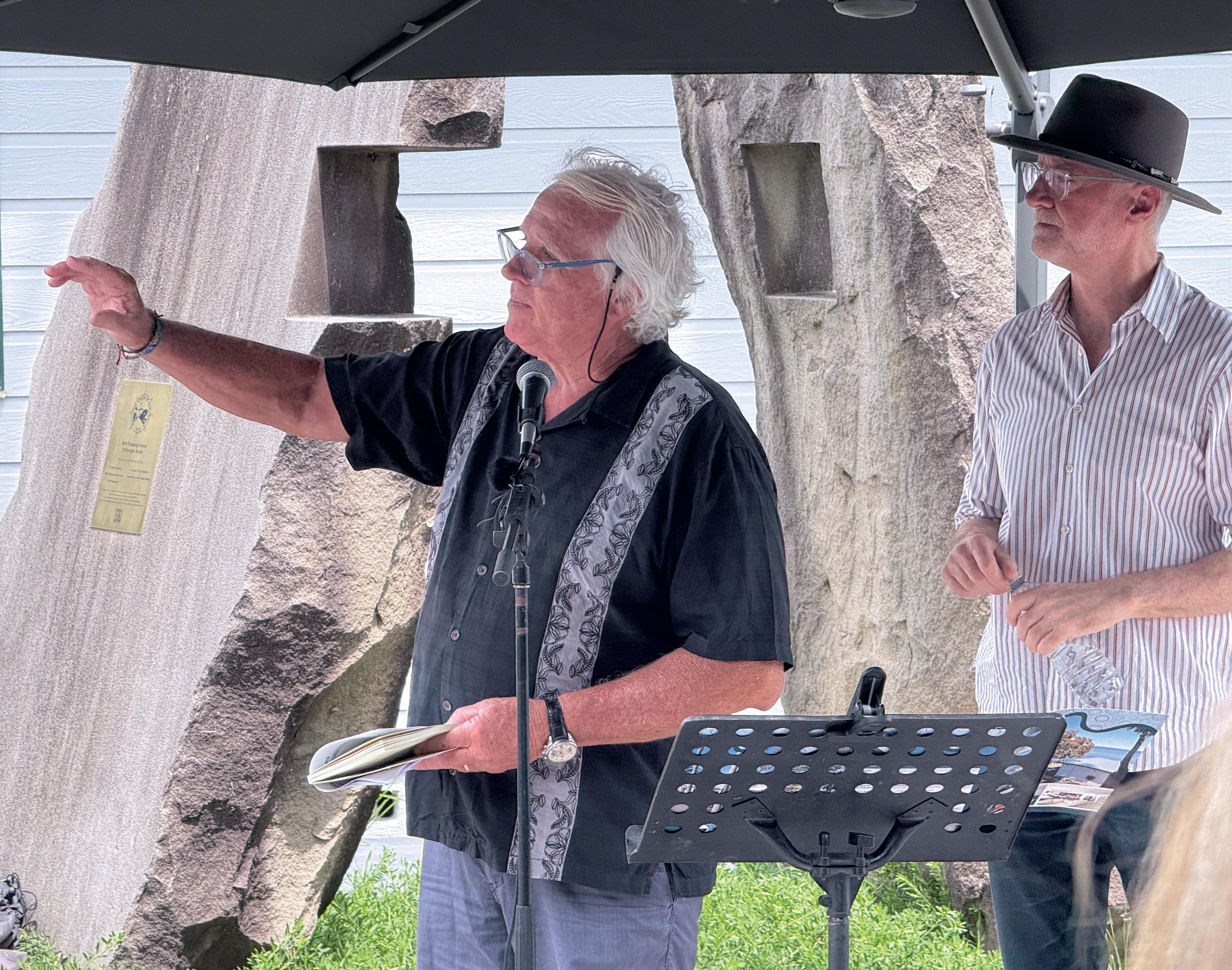
We have consistently adapted to change of all kinds and consistently delivered the job regardless of the challenges and attacks on us including at times misinformation, lies, and political attack from the media, international ship owners and conservative political and commercial self interest.
Government, the disHonourable Peter Reith and Patricks Corporation.
Dr Fela’s investigation, part of an ABC re-investigation with accompanying podcast, lifts the lid with new evidence about the dispute which will hopefully put to bed much of the disinformation and political bullshit that has been spun by the Conservatives about the dispute in the 27 years since.
Read Pages 29 - 31 for more. The revisiting of the conspiracy again emphasises the political nature of the attacks by DP World as no more than union busting and the importance of closing the loopholes to resecure our domestic maritime supply chains.
The retired MUA Deputy National Secretary Mick Doleman has recently finished his biography, Back from the Dead, in partnership with ABC journalist Piia Wirsu. This book immortalises Mick’s and his shipmates’ extraordinary experience when their ship, the Blythe Star, sunk off the southern coast of Tasmania in 1973.
Despite the ordeal, Mick returned to his seagoing career but came ashore to serve as a Victorian Branch official through the 1980s before joining the National Office in 1997. He still
serves maritime workers through his work as the Chair and Deputy Chair of Unity Bank. Mick is a hero of our union and a much loved figure in international trade unionism whose entire working life has been devoted to hard work; for his family, for his comrades and for the community. Mick’s story is at the heart of the courage and commitment shown by Australian seafarers in the face of extraordinary challenges. It reinforces the lessons to Australians for the future. Back from the Dead is on sale now and signed copies are available through your branch or the MUA website. •
Maritime workers stand to benefit from the outcome of the May federal election as certainty is restored for offshore energy projects that were under threat of a Peter Dutton-led government, and long awaited shipping reforms come into view over the horizon.
The Maritime Union joined with the Electrical Trades Union and the Plumbers Union to fund a major ad campaign in targeted marginal electorates which may have proven pivotal to the election result.
At an early stage, the three blue collar unions took the view that it was in the interests of their respective members to ensure Peter Dutton’s nuclear energy proposal never became a reality.
Nuclear energy, in the form proposed by Peter Dutton, would have been eye wateringly expensive and required massive public funding while delivering less energy into the grid than existing renewable energy types.
With television, social media and streaming video platform advertising funded by a significant cooperative investment by the three unions, the communities in marginal electorates across Australia were left in no doubt
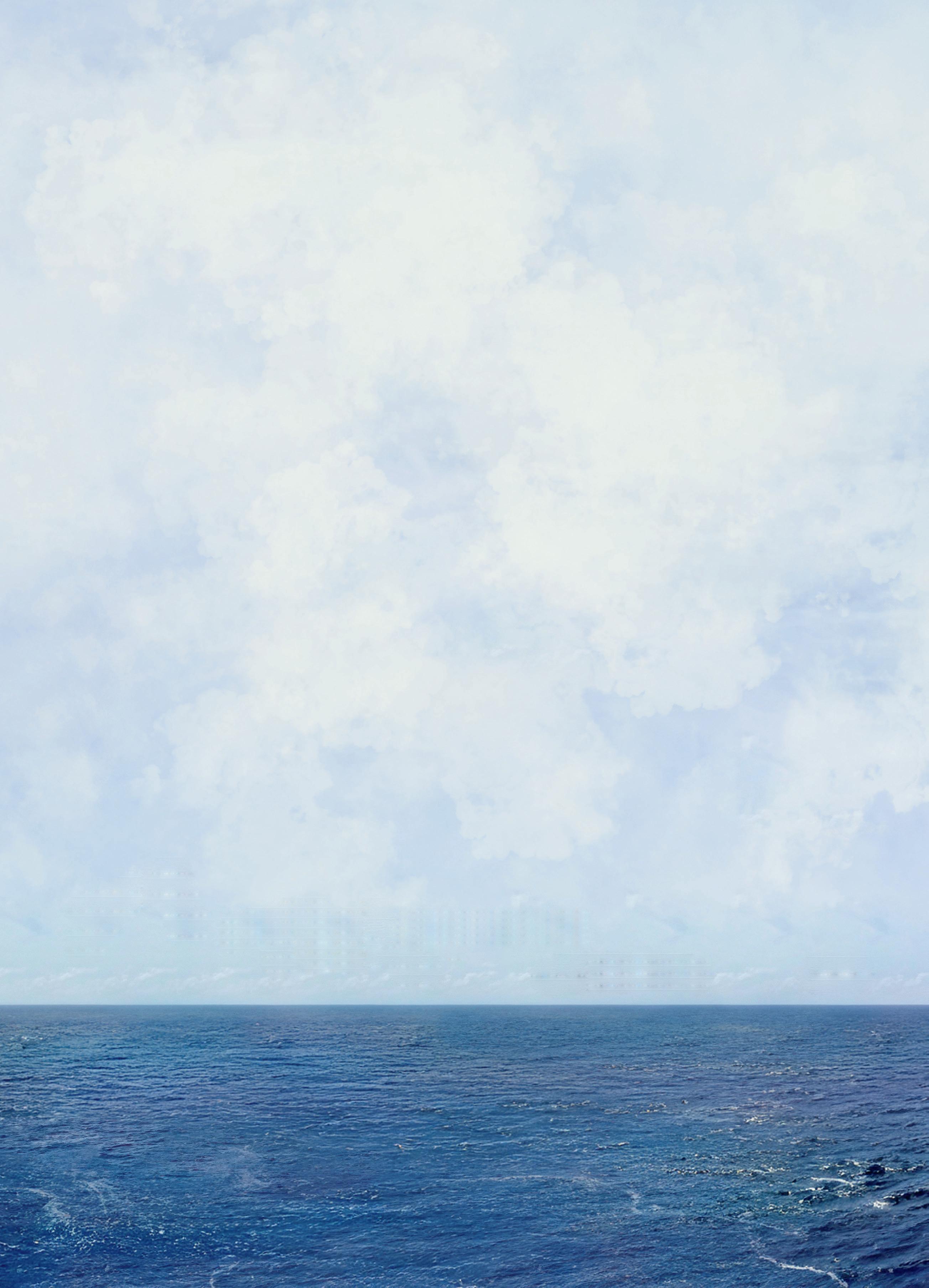
about the real cost of voting for the Liberal and National Parties.
Further, maritime specific ads also attacked the risk of Peter Dutton winding back key maritime sector projects that were already delivering new jobs for our members.
“Peter Dutton would have been a terrible leader of this nation, and would have made it is daily missing to attack our industries, our jobs and our families in the tradition of great social destroyers before him like John Howard and Tony Abbott,” said MUA National Secretary Paddy Crumlin.
“The Australian community has rightly identified and responded to Peter Dutton’s antisocial policy agenda with a message at the ballot box that could not be clearer to the Liberals and Nationals,” Mr Crumlin added.
The response from industry has been immediate, with renewed enthusiasm and investment interest
in offshore energy projects around the Australian coast that will be delivered by Australian seafarers.
The MUA now looks forward to key overdue reforms such as the Strategic Fleet implementation being put into action by the Albanese Government.
“The Union has been involved in the development of the Strategic Fleet policy from its earliest stages, and we are determined to see new Australian flagged and crewed vessels enter in to service in the coming year which will provide that baseline capacity, training, economic and strategic sovereignty as well as long term employment which the Australian maritime sector needs,” Crumlin said.
“We have been very clear with the Minister for Infrastructure and Transport that our priority after the Ministry is sworn back in is to see the Australian Strategic Fleet put in to action and developed into a long-term
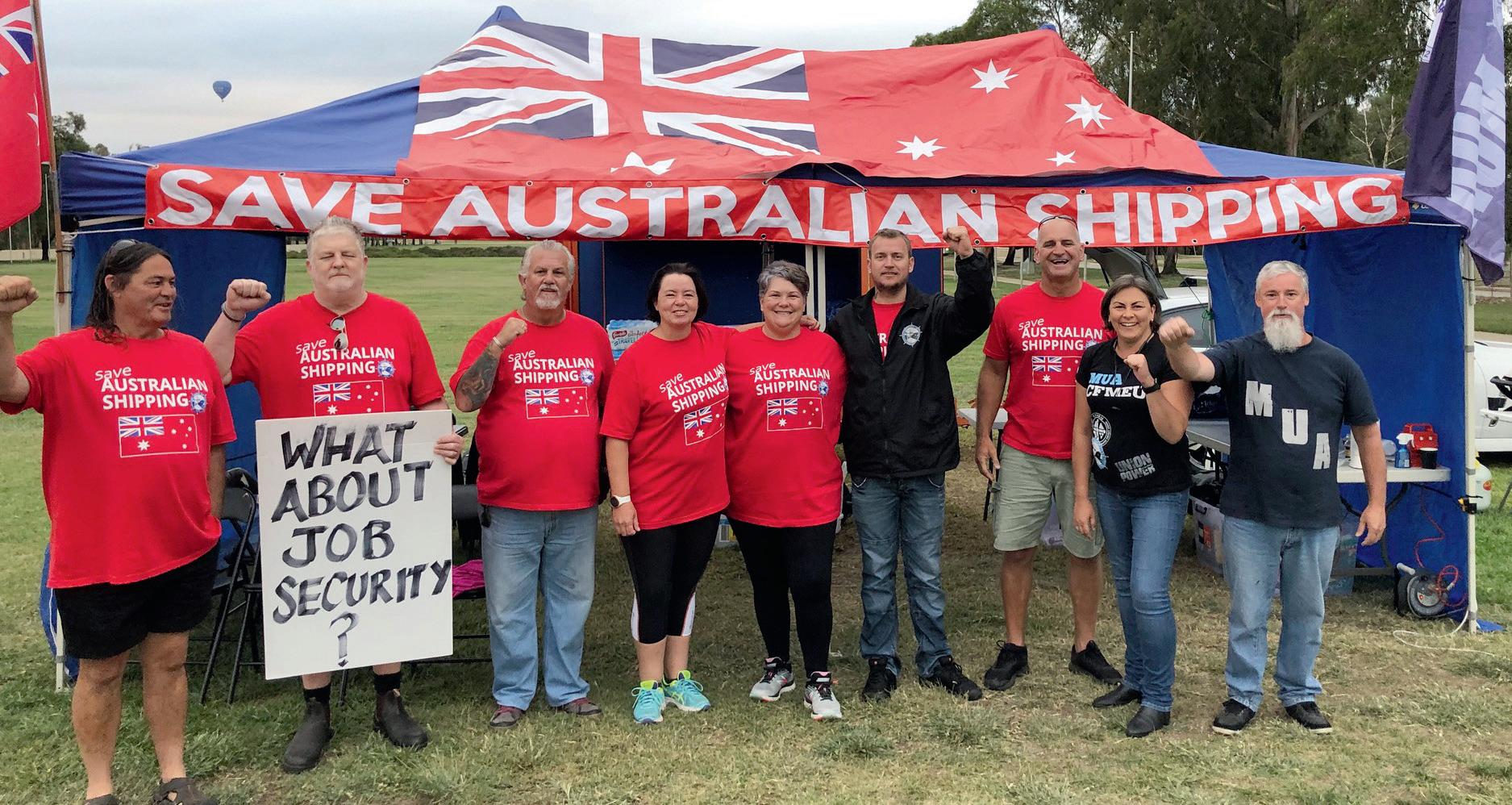
success story for Australian seafarers,” Crumlin added.
A number of federal MPs, senators and candidates signed the new Pledge for Australian Shipping, which called for a decisive implementation plan for the Australian Strategic Fleet in the new Parliament.
Funding and training spots already delivered
Working closely with the other two maritime unions, the AMOU and AIMPE, MUA officials have been advocating for important funding streams and training opportunities to underpin the strategic fleet once it becomes operational.
Following lobbying efforts coordinated by our National Office team, the Federal Government announced on 4th March that it will be investing $16.9 million to support skills and training in the maritime industry. The funding will give up to 20 trainee seafarers each year, for four years, access to berths to complete their sea time. We know sea time is a barrier to entry and this support will kickstart our push for an industry training levy so all trainees have the same opportunity.
$2.5 million will also flow to Industry Skills Australia (ISA) to address the training barriers to alleviate the maritime skills shortage. Assistant National Secretary Jamie Newlyn sits on the board of ISA and with Glen Williams, Newcastle Branch Secretary, has been pursuing our training agenda on maritime projects. This includes establishing the National Maritime Skills Network, co-ordination of sea time for trainees through a group training model and guiding the workforce supply and demand forecast study.
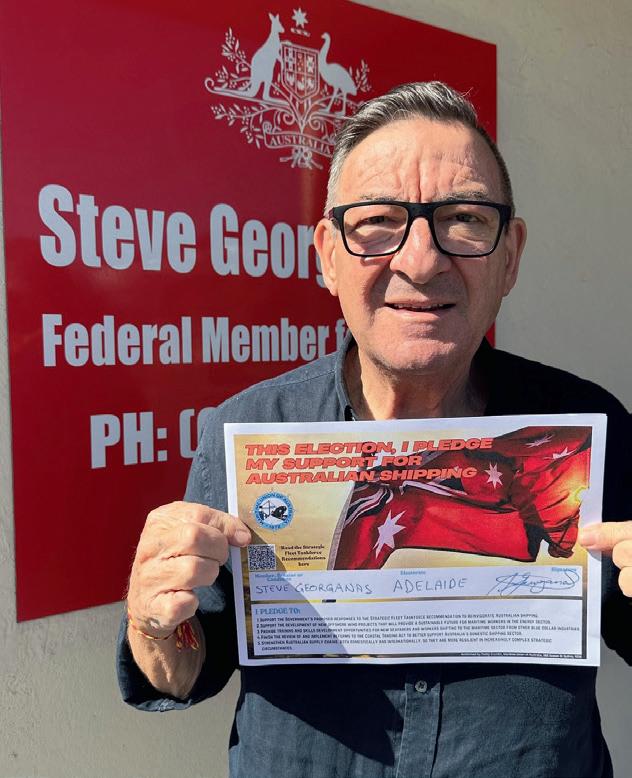
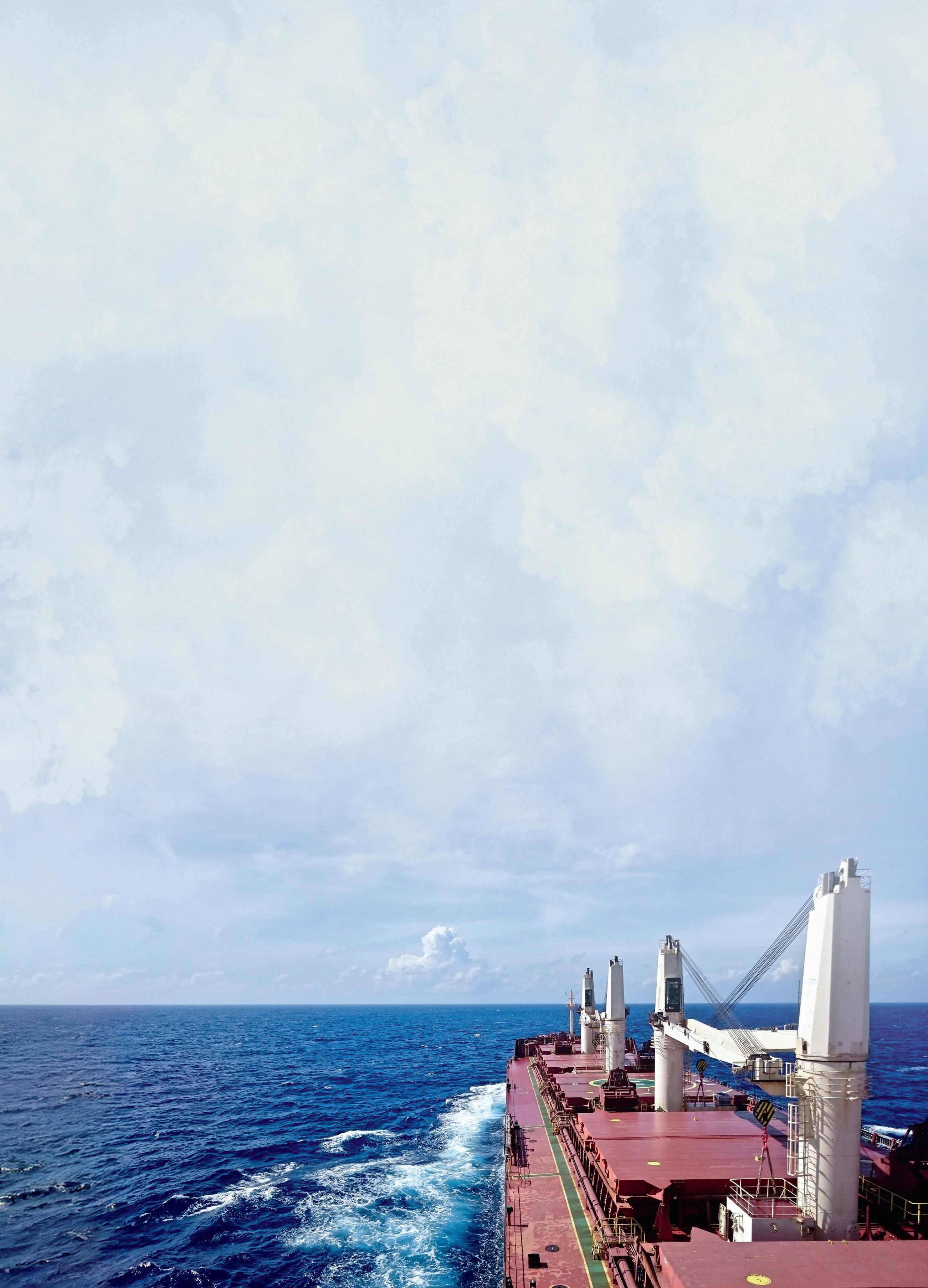
Following coordinated campaigning by MUA branches, state Labor governments have also come to the table, committing: $21 million under the Backing Queensland Maritime Jobs initiative with grants for coastal shipping, maritime employment and maritime training and $5 million for a Supply Chain Resilience Fund if the WA Labor Government is re-elected. This fund will support initiatives to build WA’s shipping capability particularly in during emergencies and will complement the Australian Strategic Fleet.
Following the ITF Inspectorate’s Nowhere to Hide campaign in various states across Australia last year, where a light was shone on the exploitation and wage theft happening in Australian waters, the Federal Labor Government has provided
“We have been very clear with the Minister for Infrastructure and Transport that our priority after the Ministry is sworn back in is to see the Australian Strategic Fleet put in to action and developed into a long-term success story for Australian seafarers”
additional funding for the Fair Work Ombudsman & AMSA to work together to address wage theft on temporary licence vessels.
The government has started a review into the impact the two Award-Free voyages have had on international and Australian seafarers. The MUA is pushing for the regulation to be scrapped so all workers will be entitled to a minimum of Australian Award wages and conditions while working in coastal trading.
These crackdowns and reforms will help level the playing field for Australian seafarers once rogue shipowners are caught and punished for bending employment rules on the Australian coast.
“We know policy change can seem slow and the cumulative impact of these major steps forward isn’t immediately felt. There’s more to do to create an even playing field so Australian shipping can compete fairly with international shipping companies, but each step takes us closer to our shared goal,”
Paddy Crumlin
said. •
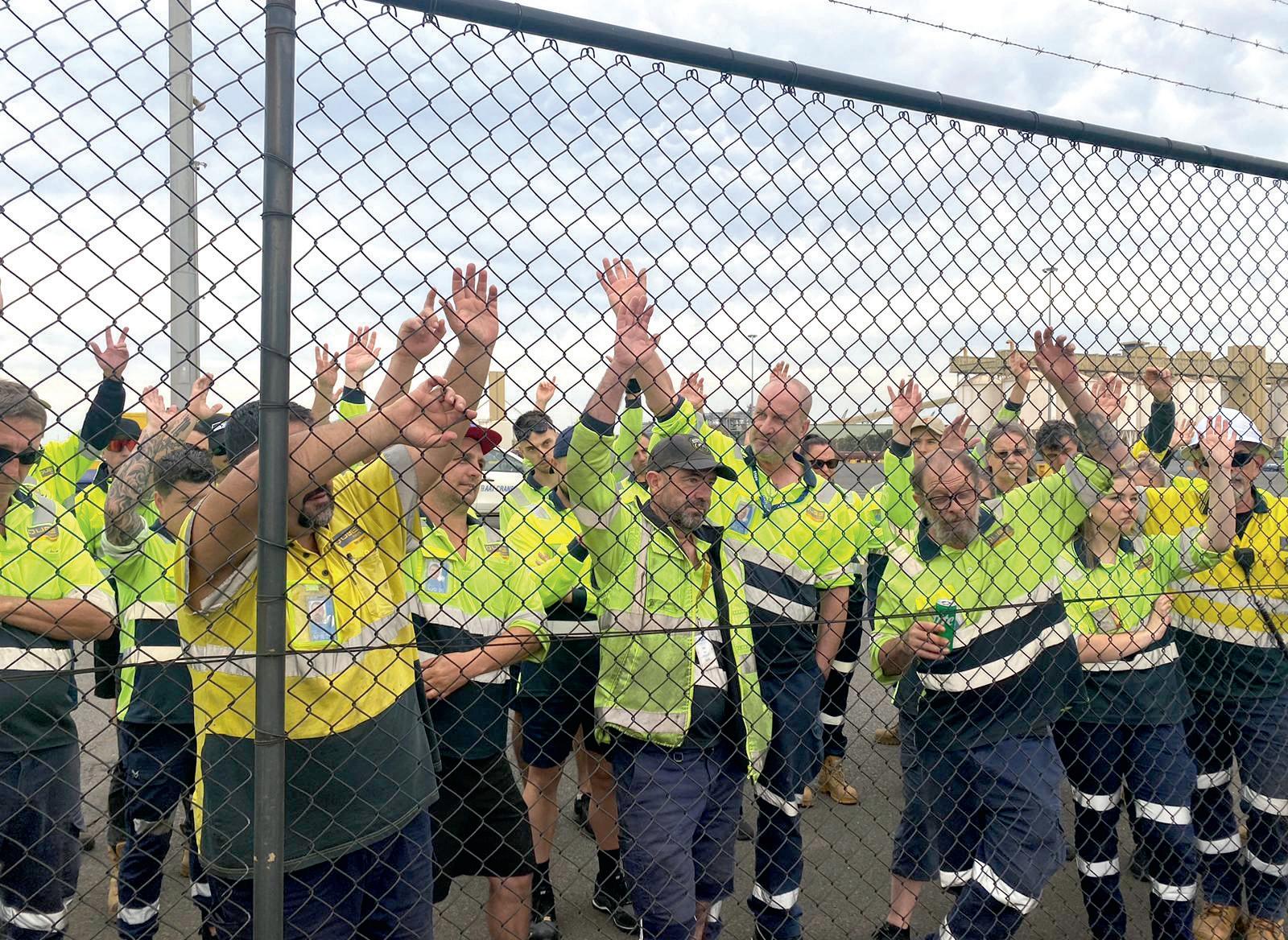
New employment agreements voted up by MUA members at Qube ports workplaces have delivered massive wins for wharfies across Australia. The agreements have now been overwhelmingly endorsed through ballots and meetings of MUA members in every state.
Despite Qube’s campaign strategy to delay agreements and reach an intractable bargaining outcome, the workers prevailed.
Industrial action and the unity and steadfastness of the workforce gave Qube no choice but to move from their hard line position of gaming Australian industrial relations laws.
In dispute were outrageously dangerous fatigue and safety problems and work-life balance complaints that every other Australian worker would consider obscene. The poor working conditions at Qube had taken huge tolls on members family life and made it near impossible for Qube workers to build a life with their families around their roster. Attending weekend sporting events
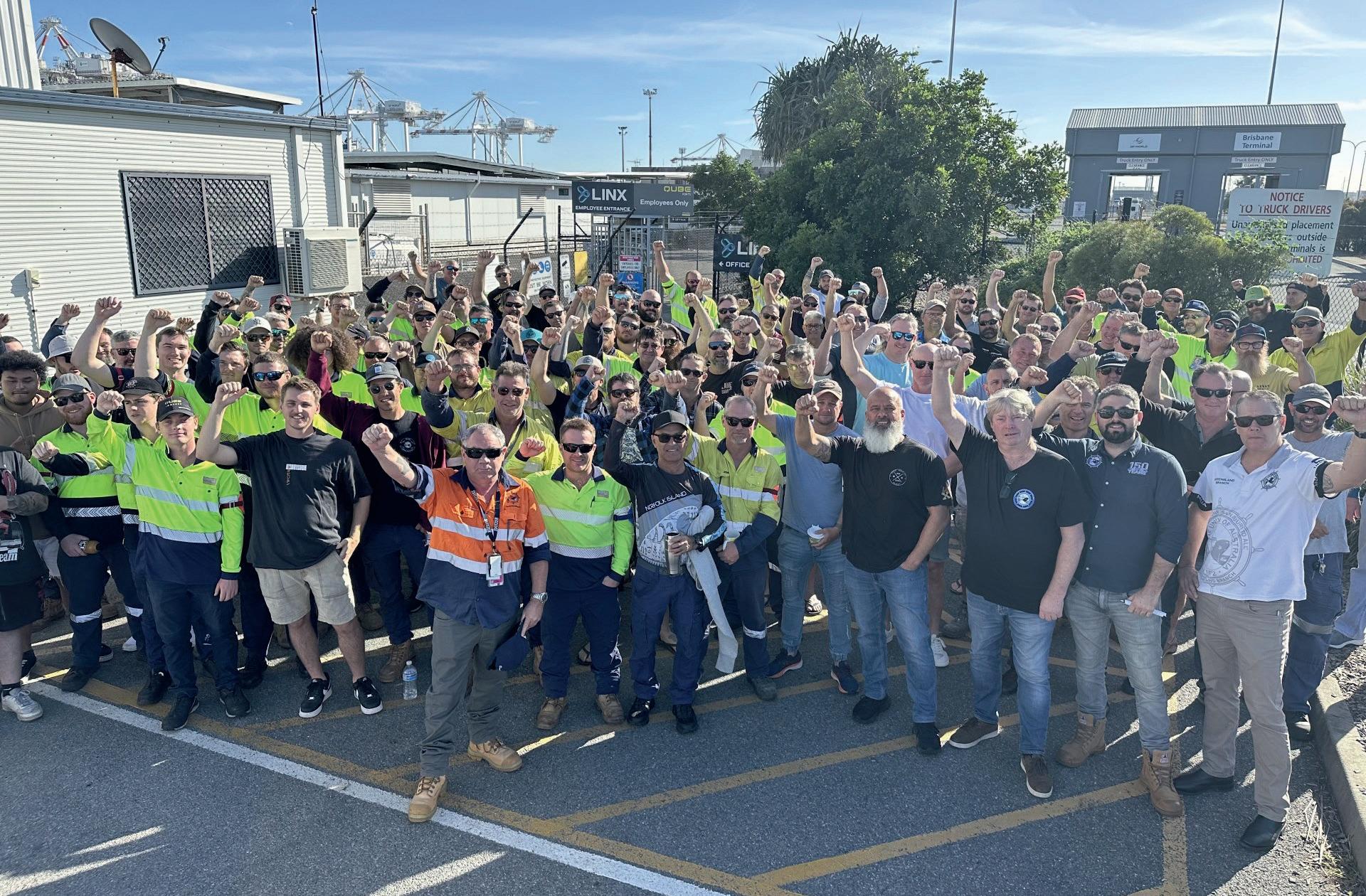
with kids or being able to pick them up from school was an impossible aspiration for any Qube employee under the old arrangements.
Australian wharfies striked across ten ports in an International Day of Action in December last year and were joined by representatives of the international dockers movement via live video conferences across Australia. The International Day of Action was in response to Qube Ports’ refusal to bargain genuinely or sincerely.
“We told Qube, if you want to provoke disputation and industrial action against your commercial interests, we will respond and meet that challenge,” said Warren Smith, MUA Deputy National Secretary, who led the campaign.
The MUA had repeatedly called on the company to engage in meaningful and genuine bargaining and deal with the safety, fatigue and work-life balance concerns that employees were raising, but for many months it appeared the company preferred industrial action over negotiation.
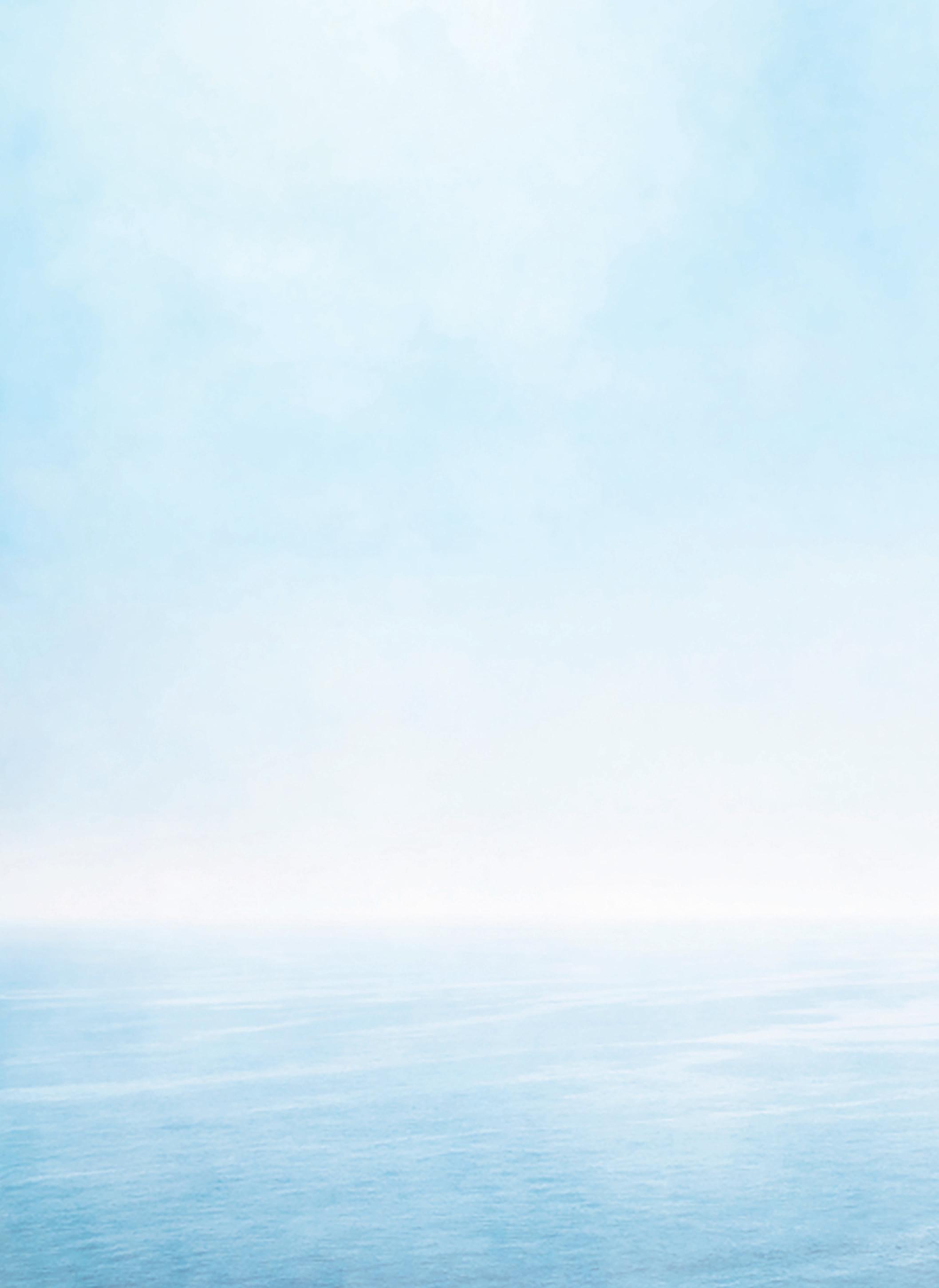
MUA members employed at Qube’s bulk and general ports across Australia took protected industrial action commencing in September 2024. Ballots of members for industrial action have been returned with between 97 and 100% support in every instance.
Company buckles under pressure in April
Facing mounting losses during long period of industrial action, the company finally buckled and began negotiating in earnest, with agreements landed in the second quarter of 2025.
The endorsement of the new agreements delivers a 4-year term, with 5.5% pay increases each year, along with significant rostering and fatigue improvements that will provide a better work-life balance for over 1000 wharfies across Australia.
“This is the best agreement ever delivered for workers employed by this company. The agreements were won through months of consistent industrial action and hard fought members’ struggle. Wharfies
“We told Qube, if you want to provoke disputation and industrial action against your commercial interests, we will respond and meet that challenge,”

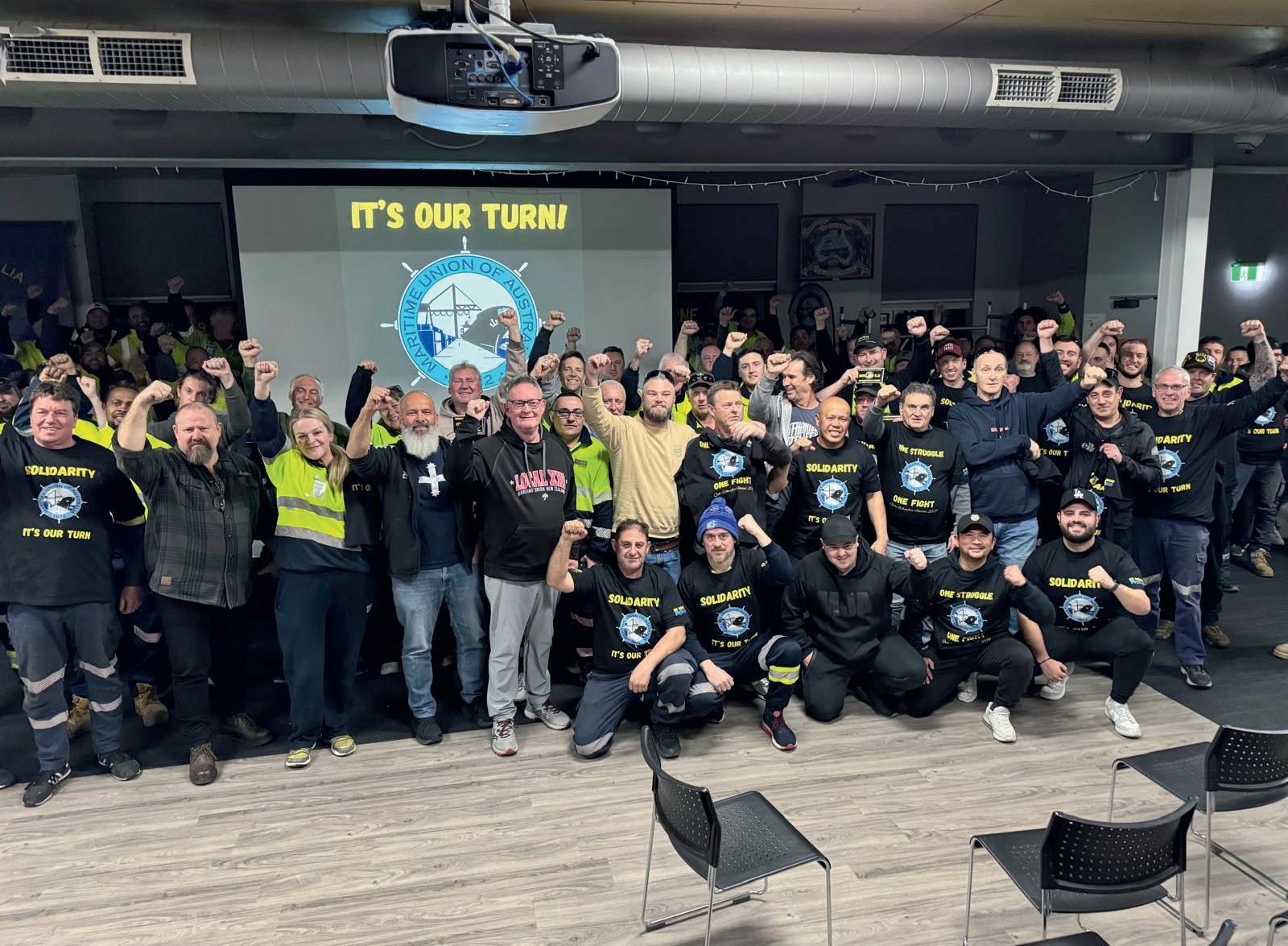
held the line and won against the company’s intransigence and corporate greed,” said Mr Smith.
Subsequently the MUA has offered an ongoing peace deal to Qube but at this stage the company has rejected proposals for a normalisation of relations, instead seeking to have workers work for free after taking industrial action through a manipulation of antiworker laws.
Multiple Federal Court cases remain live including the suing of twenty Melbourne wharfies and MUA officials by Qube management, while at the same time a Qube Company director is being sued by the MUA.
“Workers should not have to work for free and be punished for industrial action, which is Qube’s position. When this petty resentment is wound back the MUA will strongly support the process of normalising relations with the Company,” said Mr Smith.
Throughout the campaign, the company played dirty tricks and tried to intimidate the workforce,
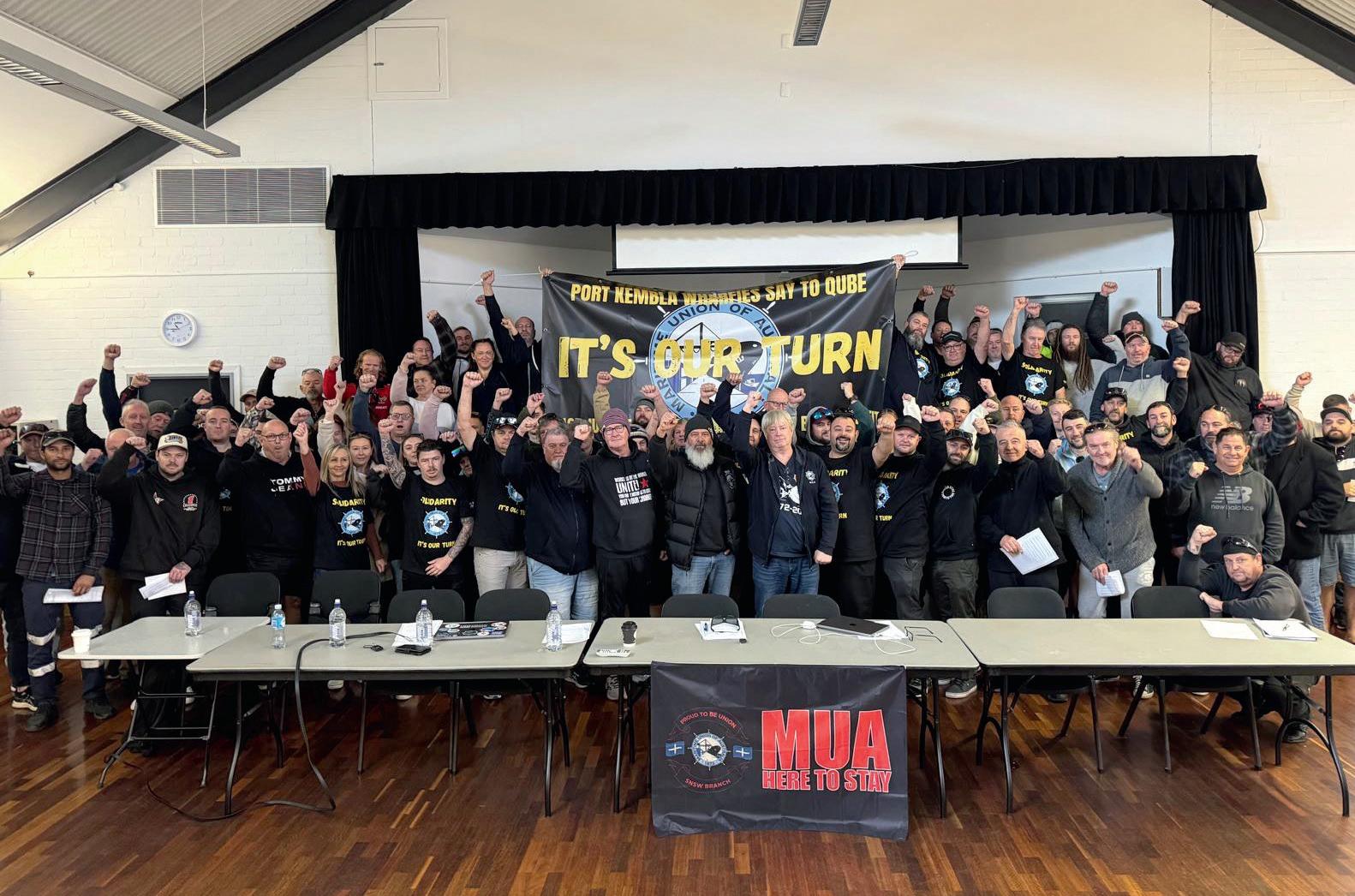
but the solidarity of wharfies with the backing of the international dockers movement, through the International Transport Workers Federation and the International Dockers Council, saw Qube buckle.
Wharfies employed at Qube have prevailed with new agreements in every port which strengthen conditions, deliver big pay increases, and offer vital work-life balance provisions that were long overdue.
Maritime Union of New Zealand National Secretary Carl Findlay explained that New Zealand wharfies wholeheartedly supported the MUA in their struggle, with delegates heading across the Tasman in both directions, and protest events held in New Zealand ports.
“Qube is now operating in New Zealand ports, and Qube management need to be aware their actions in Australia will have consequences for their international brand and credibility unless they change their attitude towards their workforce,” Mr Findlay said amidst the industrial action. •
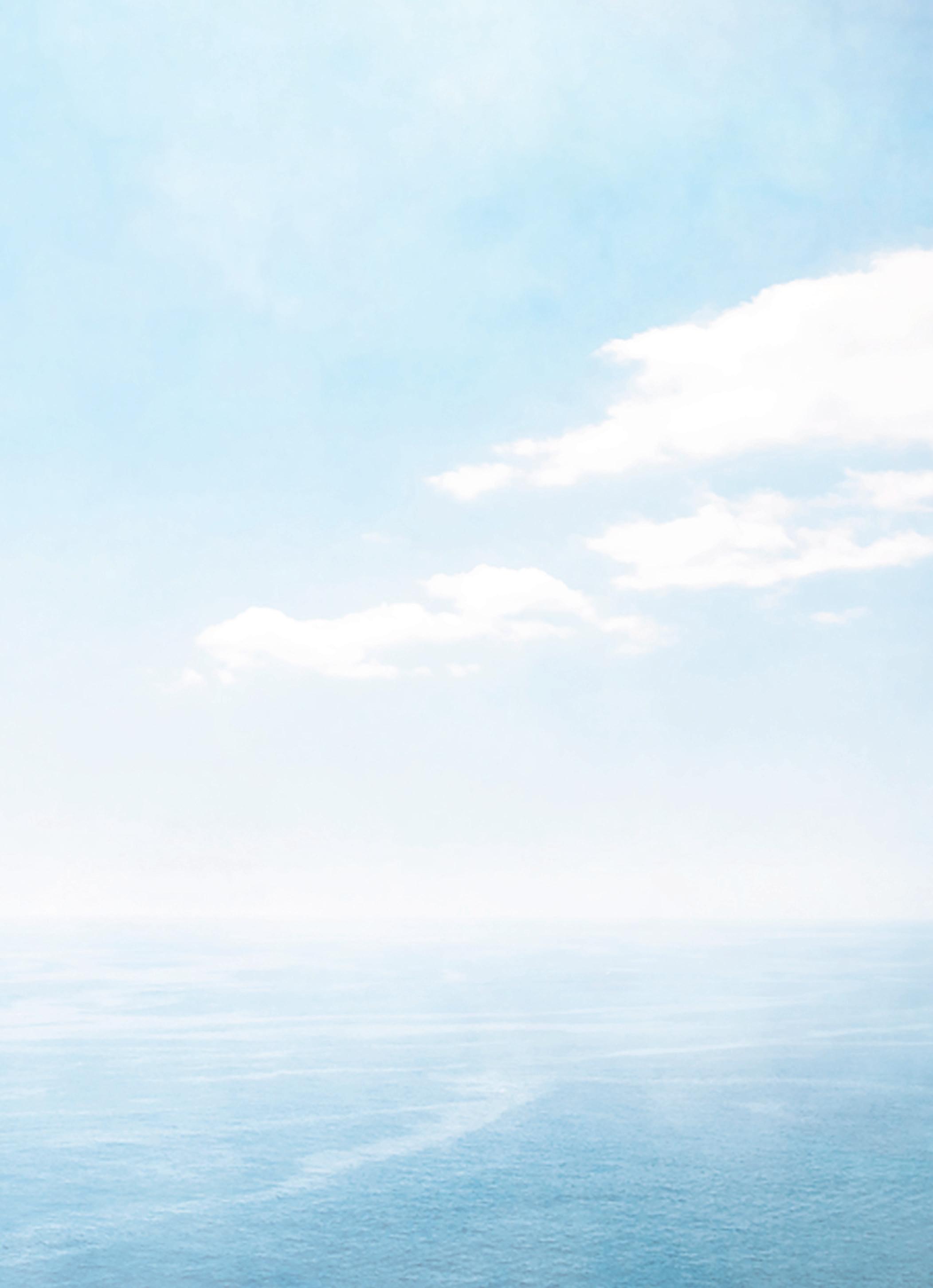
Highlights of the new agreement are:
• 5.5% + 5.5% + 5.5% + 5.5% wage increases over four years
• 1% Superannuation increase above the legislated Super Guarantee
• 2pm allocation of shifts (instead of 4pm)
• 10 hour breaks between shifts
• 48 hour break when now reduced consecutive shift maximums are reached
• Paid Domestic and Family Violence Leave
• New rostering and Planned Time off provisions
• Income Protection
• Improved Public Holiday arrangements
Earning more than $101,000* per year? Take out Union Health hospital cover to avoid getting hit with ex tra tax charges , like the Medicare Lev y Surcharge.

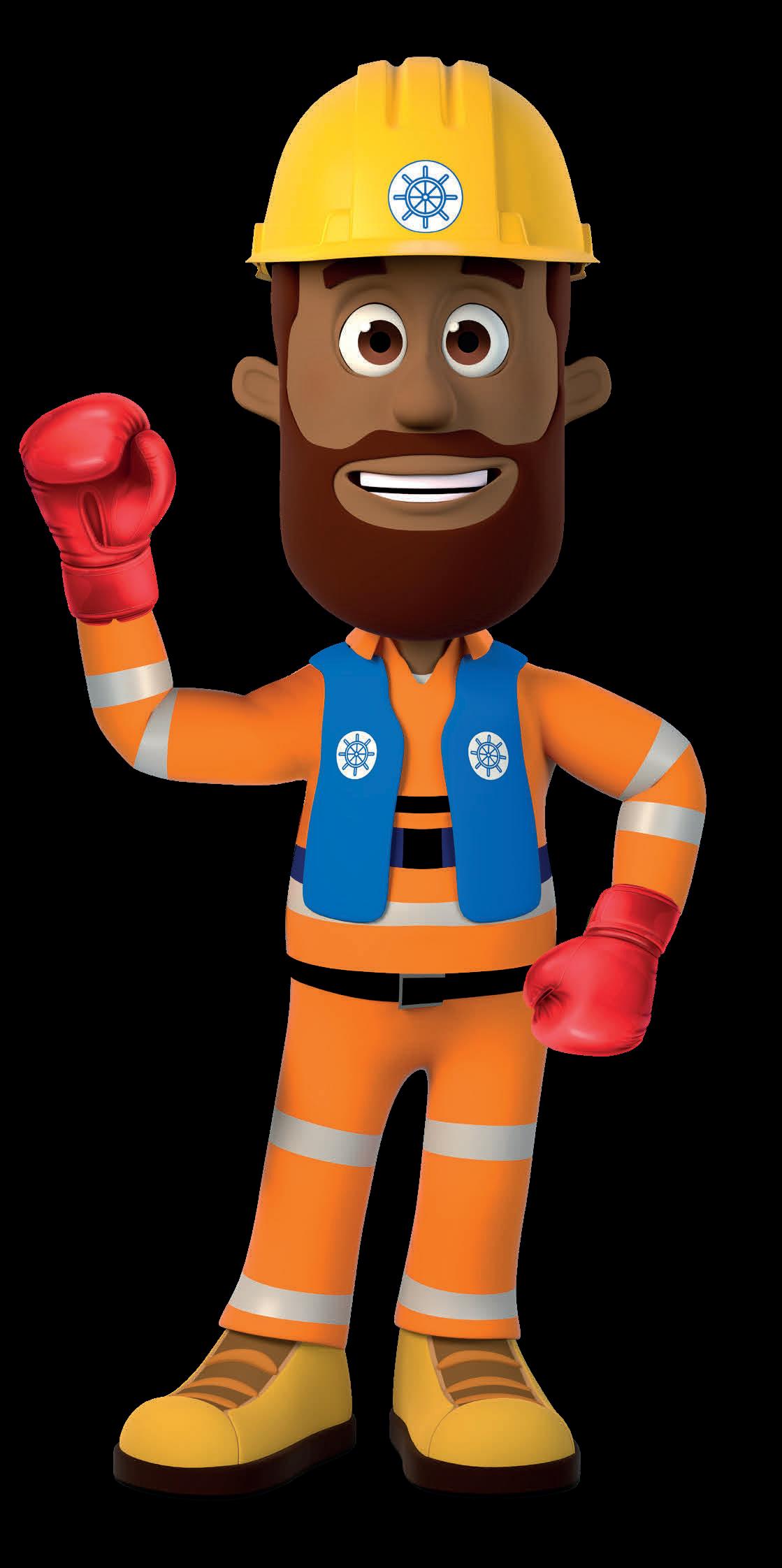
In an historic achievement, some eight months before expiry of the current 2022 Patrick Enterprise Agreement, members endorsed the Patrick Stevedore 2026 Enterprise Agreement across Patrick’s four Australian container terminals this week with almost completely unanimous support throughout the membership nationally.
This was finalised on the same week as the Union marked the 27th anniversary of the 1998 War on the Waterfront against the Patricks corporation and the Howard Government.
The new agreement delivers a signon bonus plus steady pay increases for Patricks wharfies through to 2028 plus guarantees of No Forced Redundancies and No Outsourcing.
MUA officials and delegates first met with Patricks managers in late 2024, with bosses at the national container network operator indicating an interest in rolling over the current agreement and avoiding lengthy negotiations.
“The Union has been negotiating productively with Patricks management for the past few months and is pleased to announce it has signed on to a new deal, expiring at
the end of 2028, which will improve wages for our members across the country,” said the MUA’s Assistant National Secretary, Jamie Newlyn.
“The process which has unfolded between the MUA and Patrick this year shows what is possible when the company is willing to work in good faith with its workforce on a fair enterprise agreement that both sides are happy with”, Newlyn added.
Main features of the Agreement are:
• $2000 Sign on Bonus delivered when agreement is registered at the Fair Work Commission
• Annual pay rises that are the higher of either an annual percentage increase or CPI:
• 1 Jan 2026: 3.25% or CPI
• 1 Jan 2027: 3.25% or CPI
• 1 Jan 2028: 3.5% or CPI
• Superannuation increase of 0.5% to 12.5% from 1 July 2025 and will remain 0.5% above the SGC.
• Protect Income Protection increase of 0.25% to 2.25%
• Expanded Personal Leave (Sick Leave) payout provisions to include termination
• No Forced Redundancy due to Automation
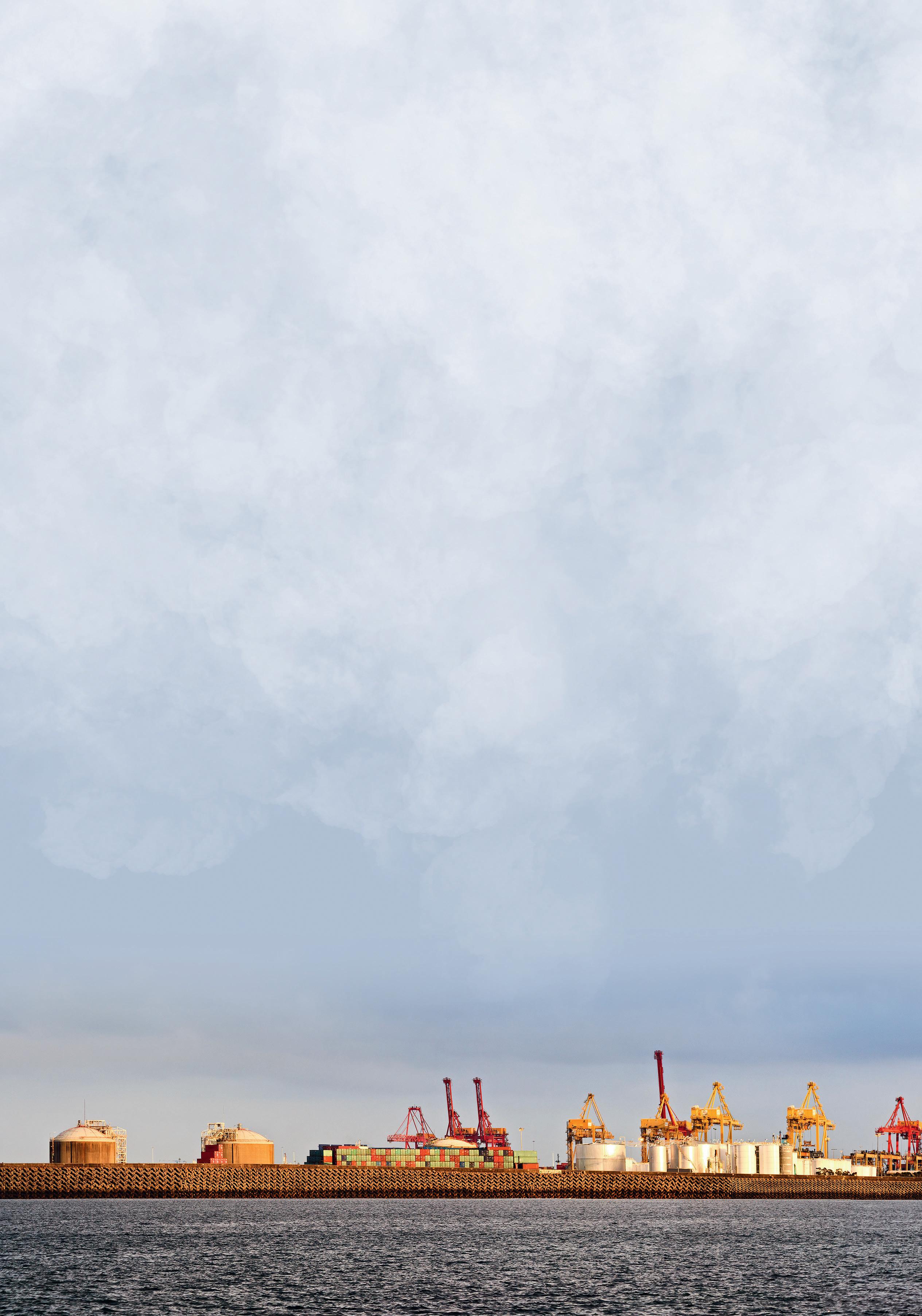
• No Outsourcing of work covered by our members under this agreement
The Agreement and associated deeds will be submitted to Fair Work Commission for registration along with declarations required by FWC from the Union and employer.
“It was not lost on members or officials the irony and the timing of this historic vote, held in the first week of April on the 27th anniversary of the 1998 Patrick Dispute, with a number of MUA members from the four terminals involved in meetings and negotiations who had lived through that extraordinary dispute still working today and being the beneficiaries of this new agreement,” Mr Newlyn said.
“To achieve an agreement with Patricks without industrial action, the first time since that historic dispute in 1998, is a testament to the delegate committees and the maturity of members who recognised that the current uncertainty of the political and industrial landscape along with the geopolitical and trade tensions we see in today’s global economy required a unified position that ultimately delivered and gives certainty to members for the next four years,” Mr Newlyn said. •
Maritime workers at DP World Australia’s four container terminals in Brisbane, Melbourne, Fremantle and Sydney will convene in August this year to tackle the prospect of a reckless move by DP World Australia to roll out an unproven and potentially unsafe automated container transport system that risks safety, jobs, and operational reliability in Australia’s already strained supply chain.
The push to impose automation from the top down — without early consultation before decisions seem to have been made and without proper trials or rigorous safety testing — has sparked fierce criticism from rank-and-file wharfies. They are demanding transparency, safety assurances, and respect for workers’ voices in any technological change.
The push, spearheaded by an overseas-controlled stevedoring giant, threatens to repeat the mistakes seen in failed or dysfunctional automation projects elsewhere in Australia and around the world. The MUA is calling out this automation agenda for what it
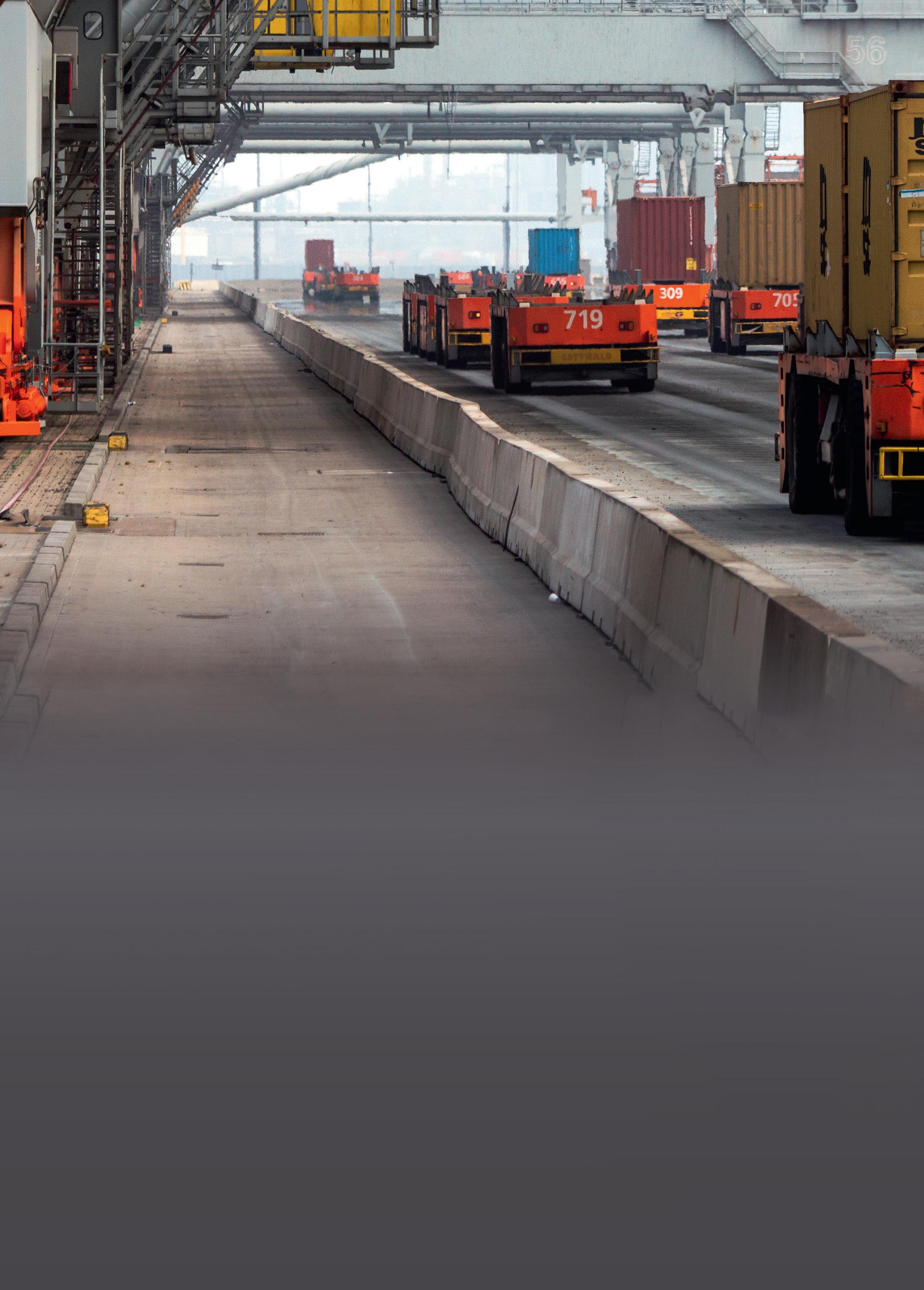
is: a cost-cutting measure that places profit ahead of people and introduces significant new risks into an already complex and high-pressure working environment.
The EBA signed between DP World Australia and its workforce in 2024 includes an automation clause which stipulates ‘no automation without agreement’, with National Officials of the MUA making the observation that agreement can only be achieved through genuine consultation, engagement and dialogue; something which DP World appears at this early stage to be reluctant to participate in.
At the heart of the dispute are newly proposed automated horizontal transport systems that DP World claims will lift productivity, reduce carbon emissions and “enhance safety” at four of Australia’s largest container terminals. In Sydney, the proposal is for an automated rail transport interface.
Of course, there is no evidence that automated systems are quicker, or can improve the box rate at
Australia’s notoriously congested terminals. In fact, all evidence indicates that skilled human operators are not just quicker but safer than automated systems, especially in adverse weather conditions or when working under extreme pressure.
In terminals where automation has already been introduced — such as at Patricks Port Botany in Sydney and the Victorian International Container Terminal (VICT) in Melbourne — the track record is hardly flawless. Automated systems have been plagued by reliability issues, cyber security vulnerabilities, frequent outages, near misses involving both automated equipment, as well as collisions and tip-overs that simply do not occur when equivalent machinery is operated by highly skilled waterfront workers.
“Both in Australia and internationally, workers have witnessed first-hand how automation fails to deliver on the promises made by its vocal proponents. Worse, it puts workers’ lives at risk when systems don’t behave as expected and imperils our supply chains when
hackers infiltrate their systems,” said MUA National Secretary Paddy Crumlin. DP World was the victim of a massive cyberattack in November 2023 which shut down its four terminals for almost a week.
“When Russians attacked DP World Australia two years ago all they could do was snoop through the company’s IT files. Under automation, who knows how far their reach would be?” Mr Crumlin asked.
The global picture isn’t much better. In the United States, efforts to automate terminals at ports like Los Angeles and Oakland have met with fierce opposition from workers and local communities, with major studies showing that the promised productivity gains rarely materialise — while job losses and industrial unrest spike.
In Europe, major hubs like Rotterdam and Hamburg have likewise seen the mixed results of automation. Delays, equipment breakdowns, and a disconnect between human oversight and
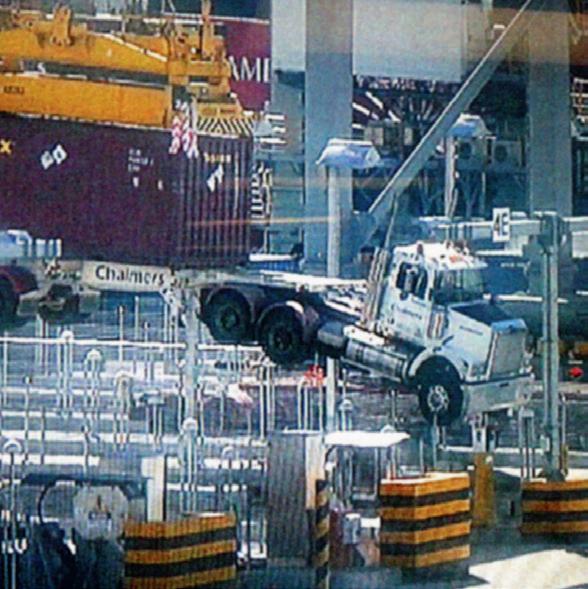
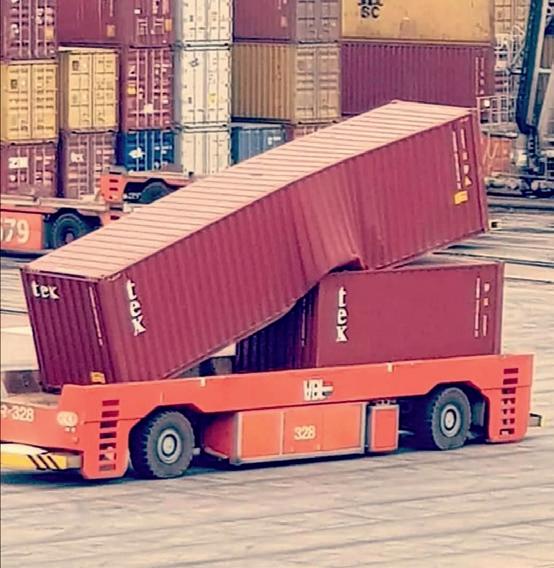
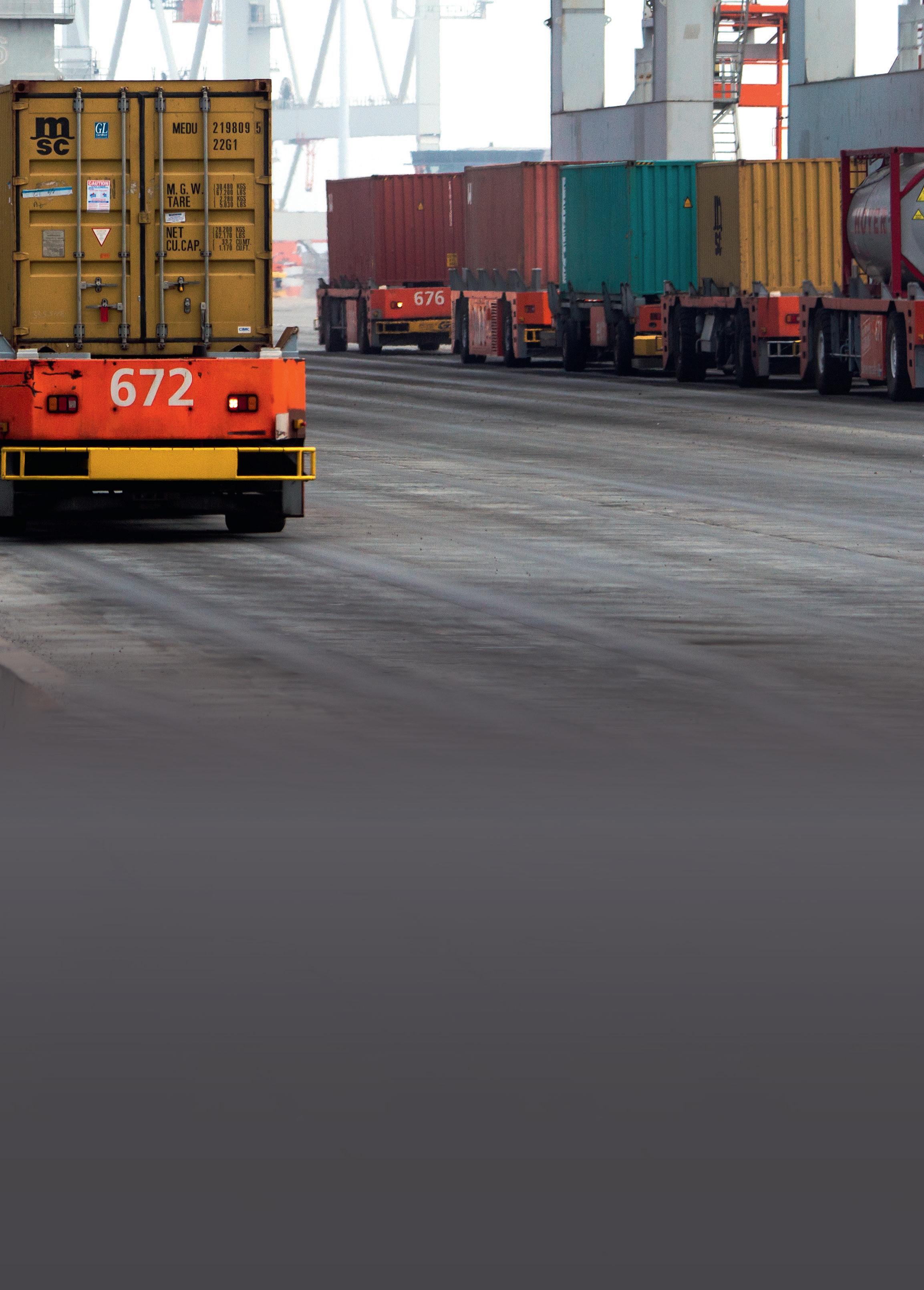
automated processes continue to cause bottlenecks and safety issues.
“Everywhere you look — whether it’s Hamburg, Auckland, Long Beach or Melbourne — rushed and corporate-led automation has caused more problems than it’s solved,” said Jake Field, Acting Assistant National Secretary of the MUA.
“There is no silver bullet in this industry for productivity or safety – both require commitment and vigilance. Wharfies have consistently adapted to new technology for over 150 years, but the introduction of new technology must be driven by evidence, safety, and proper consultation, not by anti-union ideology or the balance sheet of a foreign shipping company,” Field said.
Workers demand transparent consultation and safety-first
The waterfront has a long history of embracing new technologies — from the container revolution of the 1960s and 70s to modern vessel scheduling systems and the highly skilled work required to operate gantry and
straddle cranes. The reality is that Australian wharfies do strategically important work effectively, quickly and safely, and these truths are a long way off the tired stereotypes peddled by conservative media about the Australian waterfront. What the union demands is that any mode change be safe, fair and negotiated.
“No one is saying we should freeze time,” said Jake Field. “But if a new system means fewer jobs, more accidents and slower ports then we would be doing ourselves and the Australian economy a disservice by agreeing to it,” Mr Field explained.
The Union has also pointed out to DP World that the partial automation of certain elements of terminal operations is not likely to make significant or systematic improvements and will instead disjoint and segment workflows and transport activities.
“We know from the experience in Patricks’ terminals that often our members have to stand around waiting for the robot to catch up. In this sense, automation is a time waster, not a silver bullet,” Field
“We know from the experience in Patricks’ terminals that often our members have to stand around waiting for the robot to catch up”
JAKE FIELD
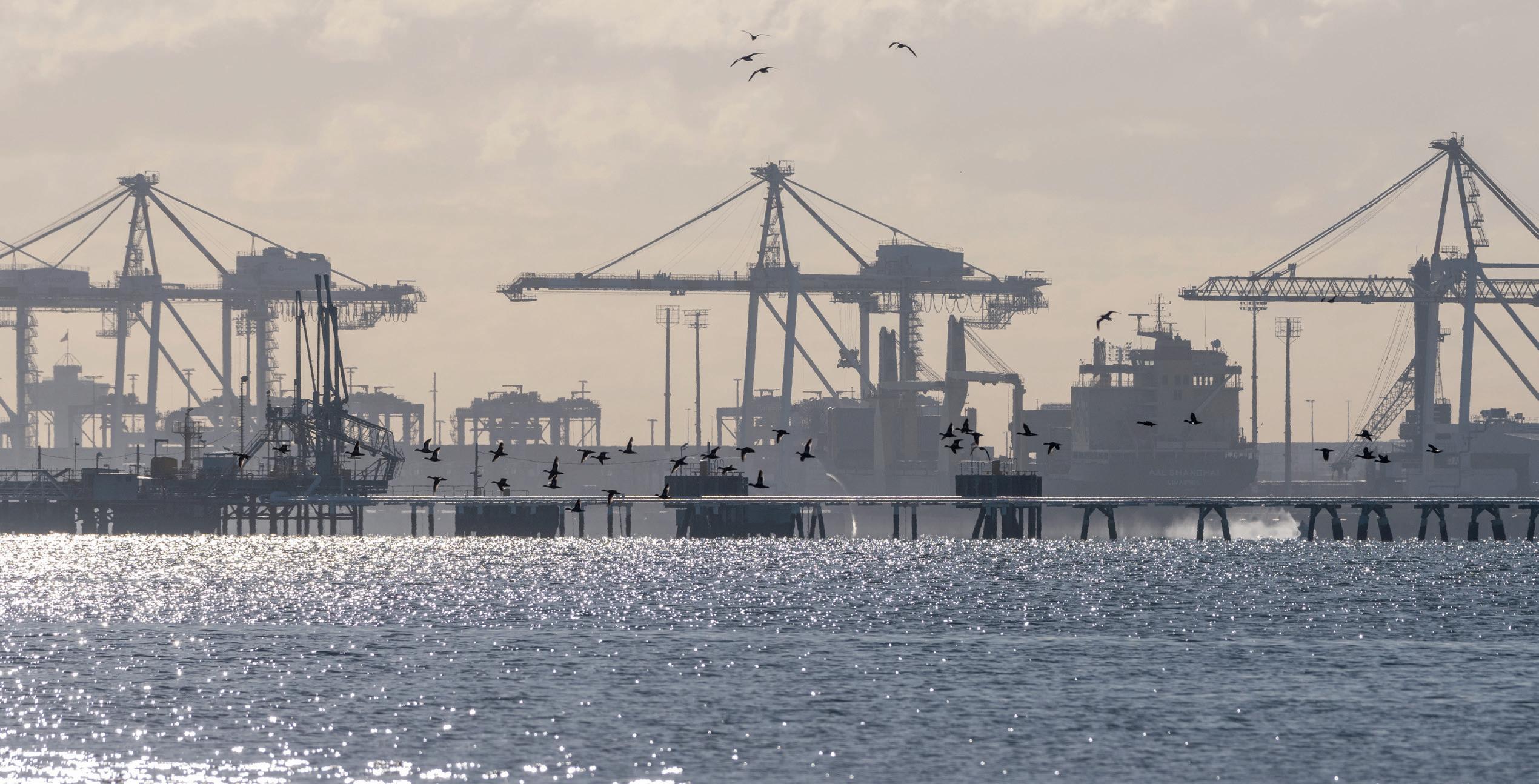
said. For this reason, the union has proposed a consultation framework and member-led conference bringing together delegates from around the country to discuss the challenges and limitations of automated functionality on the waterfront.
“Our members are the ones who will operate, maintain and live with these systems every day, so it makes sense that they should be the ones leading the process, not bean counters or anti-worker ideologues from overseas,” Mr Field said.
With global supply chains already under immense pressure from geopolitical instability, climate-related disruptions, and labour shortages, introducing unproven automation risks further weakening resilience at the worst possible time.
“The pandemic taught us how fragile our supply chains really are,” said Mr Crumlin. “Ports need to be agile, adaptable and staffed by an experienced and highly skilled workforce with the capacity to respond to rapidly changing conditions. A system based on machines that freeze when the software crashes or veer off course because of cobwebs and rain in their sensors is not resilient, it’s brittle,” Mr Crumlin noted.
The MUA warns that introducing
half-baked automation could lead to more port congestion, not less.
Any breakdown in an automated system, especially one that isn’t fully integrated or has not been adequately tested under real-world pressure, can bring an entire operation to a standstill.
“Our ports are lifelines for the nation — whether it’s food, medicine, fuel or building materials, the public relies on maritime workers to deliver,” Mr Crumlin said. “Undermining that with an unproven automation proposal is short-sighted and dangerous.”
As the dispute escalates, support for Australian maritime workers has begun to build across the broader union movement, as well as within sections of the political and community landscape.
Transport Workers’ Union (TWU) National Secretary Michael Kaine backed the MUA’s position, stating: “Automation without accountability or safety puts every link in the transport chain at risk. We stand with wharfies in demanding safe and just outcomes.”
Michael Wright, National Secretary of the Electrical Trades Union (ETU) said that “blue collar work has always been under attack by business owners and government, but its workers’ skills, experience
and capacity to adapt or respond in challenging situations that means these automation proposals are always going to fall well short of expectations.”
Globally, dockers and seafarers through the International Transport Workers Federation and the International Dockers Council have begun to raise their concerns with DP World managers in the company’s other global networked terminals.
“DP World’s attempt to impose automation on Australian dockworkers isn’t innovation, it’s union-busting by machine,” an IDC statement said. “No automation without consent! No job cuts disguised as progress. Real progress means investing in people, not replacing them with machines.”
DP World members from all four Australian terminals will converge in Sydney during August, and the Union has repeatedly written to the company setting out a consultation framework that brings together representatives of the rank and file from each worksite in a nationally coordinated process.
“Our members will not be bullied into silence while their jobs and safety are sacrificed,” Mr Crumlin said. “We’re ready to fight, for as long as it takes, to defend safe, skilled jobs and a sustainable future for our ports.”. •
BY WARREN SMITH, MUA DEPUTY NATIONAL SECRETARY
The MUA is increasingly concerned about the impact of AI on maritime workers, especially those in container terminals. These sites are most at risk due to the rapid pace of automation, which AI is now accelerating. We’re also seeing AI starting to appear in bulk and general cargo operations.
AI in itself is not automation, but it enables it. By collecting and analysing huge amounts of data, AI systems make decisions that extend the reach of automation. This creates new risks: more control over workers, less human oversight, and decisions driven purely by the profit motive rather than by the imperatives of worker safety, industrial justice or public benefit. Productivity is often used as a justification, but the real goal is greater corporate profit.
There’s nothing inherently wrong with technology. The problem is when it’s used by employers to boost profits at the expense of workers. It’s not about progress for society, it’s about extracting more value from labour, or replacing it altogether.
As the MUA’s National Secretary, Paddy Crumlin, told the DP World Automation Conference in Sydney as MWJ went to print, we are not going to be switched on and switched off by remote control or told there’s no longer a role for us just because it’s easier for the boss to do away with us and the families and communities we support.”
To respond, the MUA has partnered with international unions including the FNV Havens from the Netherlands, the ILA and the ILWU in the USA, and the ITF Dockers Section to develop a resource for bargaining around AI in the workplace. The result is No AI Without Us: A Dockworker Bargaining Toolkit on AI, available from the ITF and on the MUA’s website. While it currently focuses on Europe, the toolkit contains valuable insights for dock workers everywhere.
The MUA’s key concerns include:
• Job Displacement: AI amplifies the impact of automation. For example, new systems claim to allow one operator to control up to 14 auto-stacking cranes, compared to three today.
• Biometric Surveillance: Monitoring heart rate, eye movement, facial expressions, and stress levels is technically possible, but it must be rejected.
• Wearable Tracking: Smart helmets, vests and watches that track physical and location data are a clear invasion of privacy.
• Opaque Algorithms: AI is increasingly used to make decisions on hiring, rostering, and promotion, with little transparency or accountability. Every decision must still have a clear explanation, and workers must have the right to appeal and review. Management must remain responsible for all decisions.
AI may seem like something hidden away in back-room computers, but it will have very real effects on the ground. If allowed to be rolled out unchecked by greedy bosses, it will result fewer jobs, greater surveillance, and increased pressure on those who remain.
These technologies are already being misused. AI is only as good as the data it’s trained on. If recruitment software is programmed with biased assumptions, it will deliver racist, sexist, or unfair outcomes. If a safety system is based on flawed data, the result will be unsafe workplaces. That’s why transparency and oversight are crucial.
Likewise, workers and unions must have rights over the data we generate through our labour. Every crane movement, every task on a straddle or forklift is captured and used to train AI. Our skill and experience, which is our tacit knowledge, is being fed into systems that aim to replace us. That knowledge has value, and employers should not get it for free. They pay for our labour, not our ideas or the history of skills passed down through generations.
Take Tesla as an example. Every time you drive, your driving data (speed, braking, steering inputs, reaction times) is collected to help train self-driving cars. The same thing is happening with cranes and cargo terminals. Our data has value, and we need to treat it that way.

The conversation around AI and technology is just beginning. It’s already shaping our lives and workplaces, and that will only increase. While technology itself is not the enemy, the problem is how it’s proposed by employers to be used: in their eyes, for profit rather than for people. We must fight to make sure the benefits of technology are shared. That means better wages, shorter working hours, and fairer conditions, not longer hours and fewer years in retirement.
These should be the goals guiding our claims and negotiations into the future. •
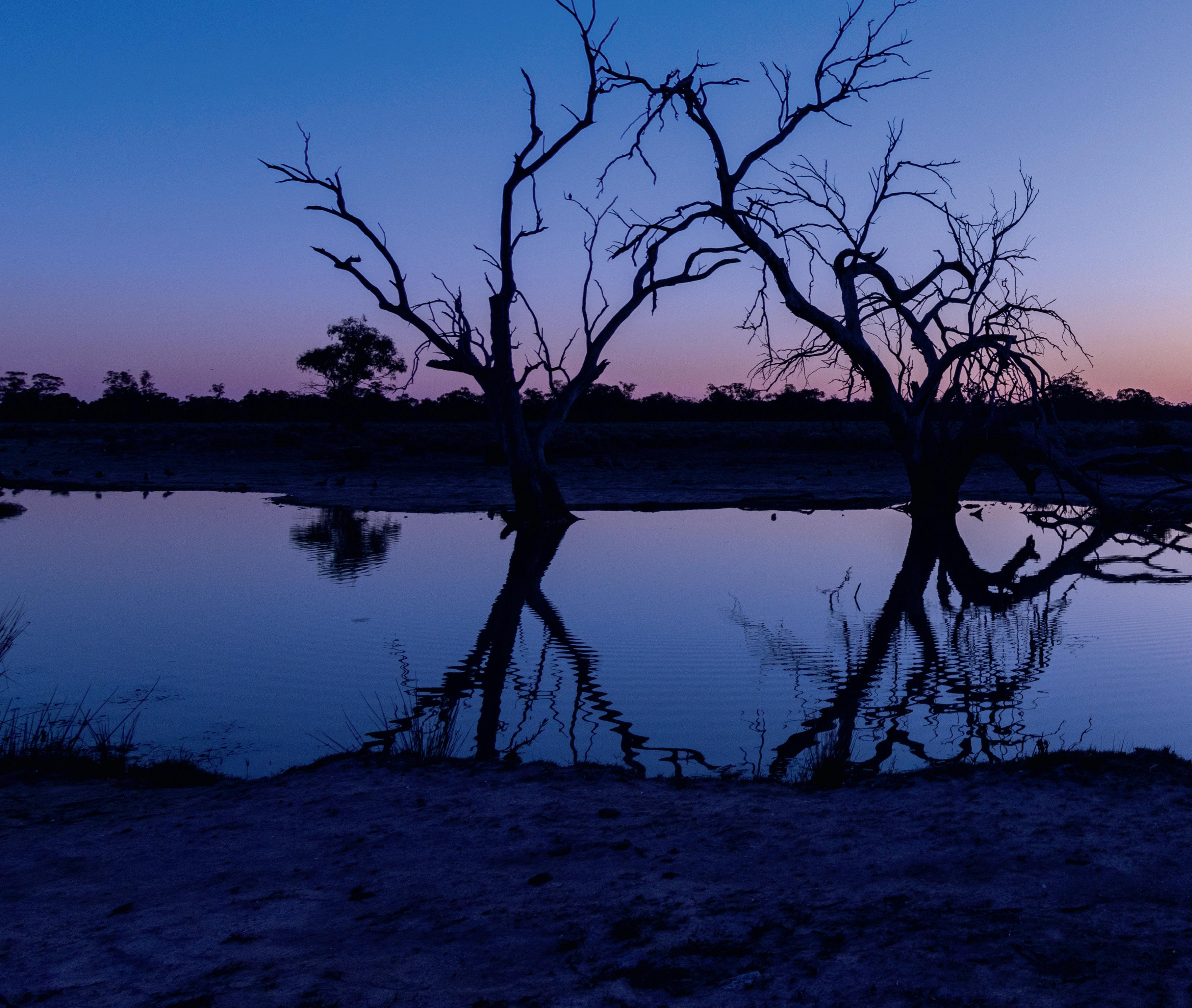
Several years ago, the NSW Union movement were invited by the Gomeroi people, the Traditional Owners of the expansive natural wonder that is the Pilliga, to walk the country with them. Gas mining giant Santos were crashing through the renowned forest and its custodians toward their goal to dig 850 gas wells across over 400 hundreds sites. The Gomeroi wanted unions to see first hand why they were fighting Santos’ plans.
I joined one of three delegations of nurses, teachers, electricians, disability care workers and doctors. For every creek we crossed to every hill we climbed to enjoy the vistas of bush and plains, our Gomeroi guides had a story, including for how the Pilliga flows into the Great Artesian Basin – the country’s largest groundwater system and the lifeblood of the Australian inland.
The Pilliga Forest is home to an incredible diversity of bird species, and a refuge to 13 species of threatened mammals – five of which are otherwise locally extinct. To the Gomeroi, and to anyone who has
witnessed the great Pilliga wilderness and enjoyed its beauty, the hundreds of well sites that Santos plans to dig will be like skin disease – boils erupting across the body of their mother.
The Gomeroi Traditional Owners have tried using their paltry Native Title rights to put a halt to the destructive Santos plans. They have lost cases in the Native Title Tribunal to halt their country – our country’s – destruction on cultural grounds. Today an appeal against the decision, this time on the grounds of climate – have been rejected, removing one more hurdle.
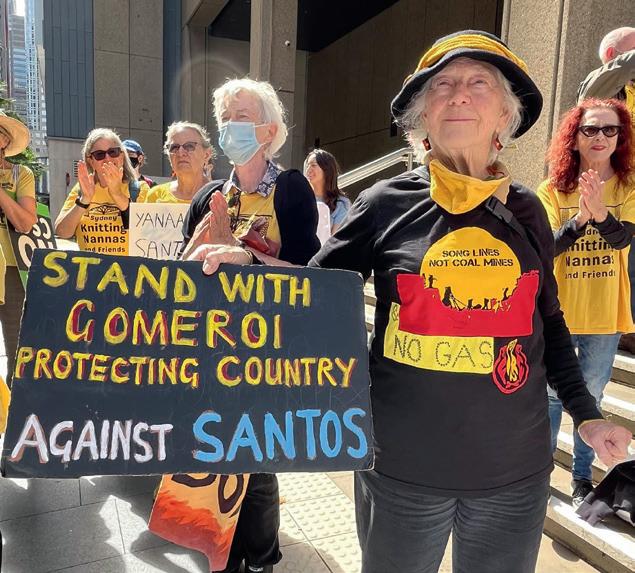
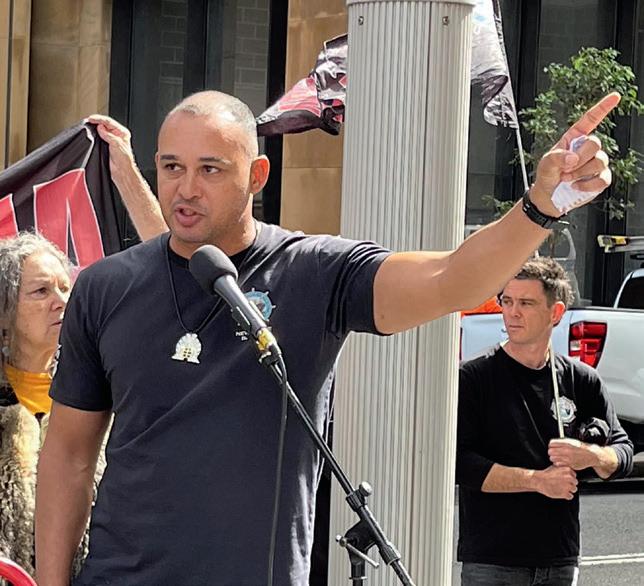
In their Native Title Appeal, the Gomeroi argued that Santos’ proposed mine would generate staggering greenhouse gas emissions at a time the world is on the brink of runaway climate change. The highly respected late climate scientist Professor Will Steffen gave expert evidence at the appeal, noting that the project was expected to create between 109.75 million and 120.55 million tonnes of extra carbon dioxide into the atmosphere. Steffen also noted that Gomeroi Country would experience “more extreme heat, more intense droughts, harsher fire danger weather, all of which will
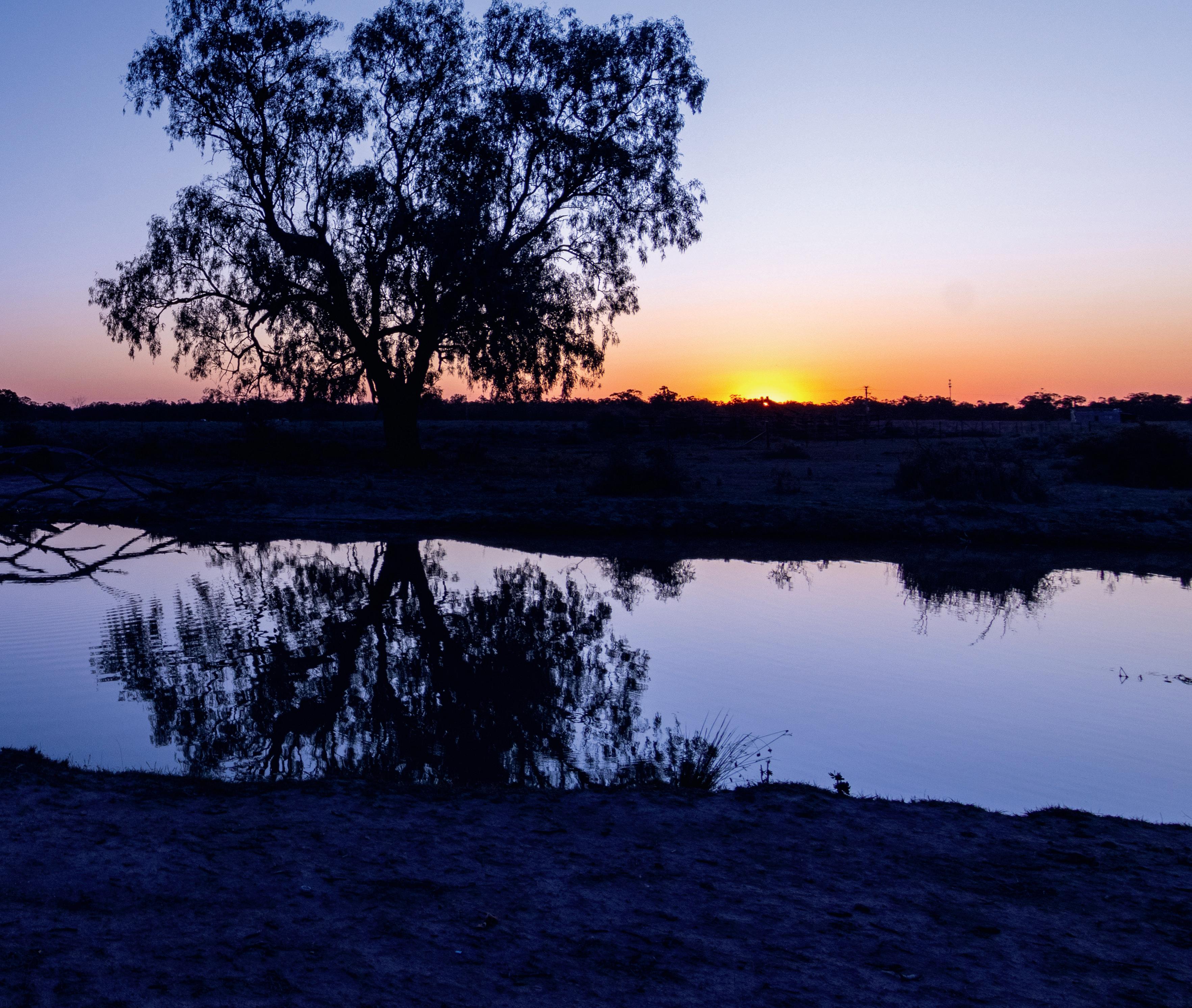
continue to increase in frequency and intensity” if this project were to go ahead.
The rationale that Santos has publicly given for the construction of this mine is that Australia ‘needs the gas’ for the energy transition. But this is not true. Australia is one of the world’s biggest producers of gas, though governments have allowed mining companies to export the vast bulk of these resources directly into the global market at eye-watering profits. These profits have been bloated by the sad fact that they have paid very little in tax back to the Australian people.
Australia is already producing enough gas to last Australia a millennia. We don’t have a supply problem. We have past mistakes that can be rectified. The fix should not include the destruction of the national treasure that the Pilliga is.
Earlier this month, we all watched as Prime Minister Albanese swelled with pride and joy in acknowledging First Nations peoples in his victory speech. I shared his pride and I regained some of the hope that
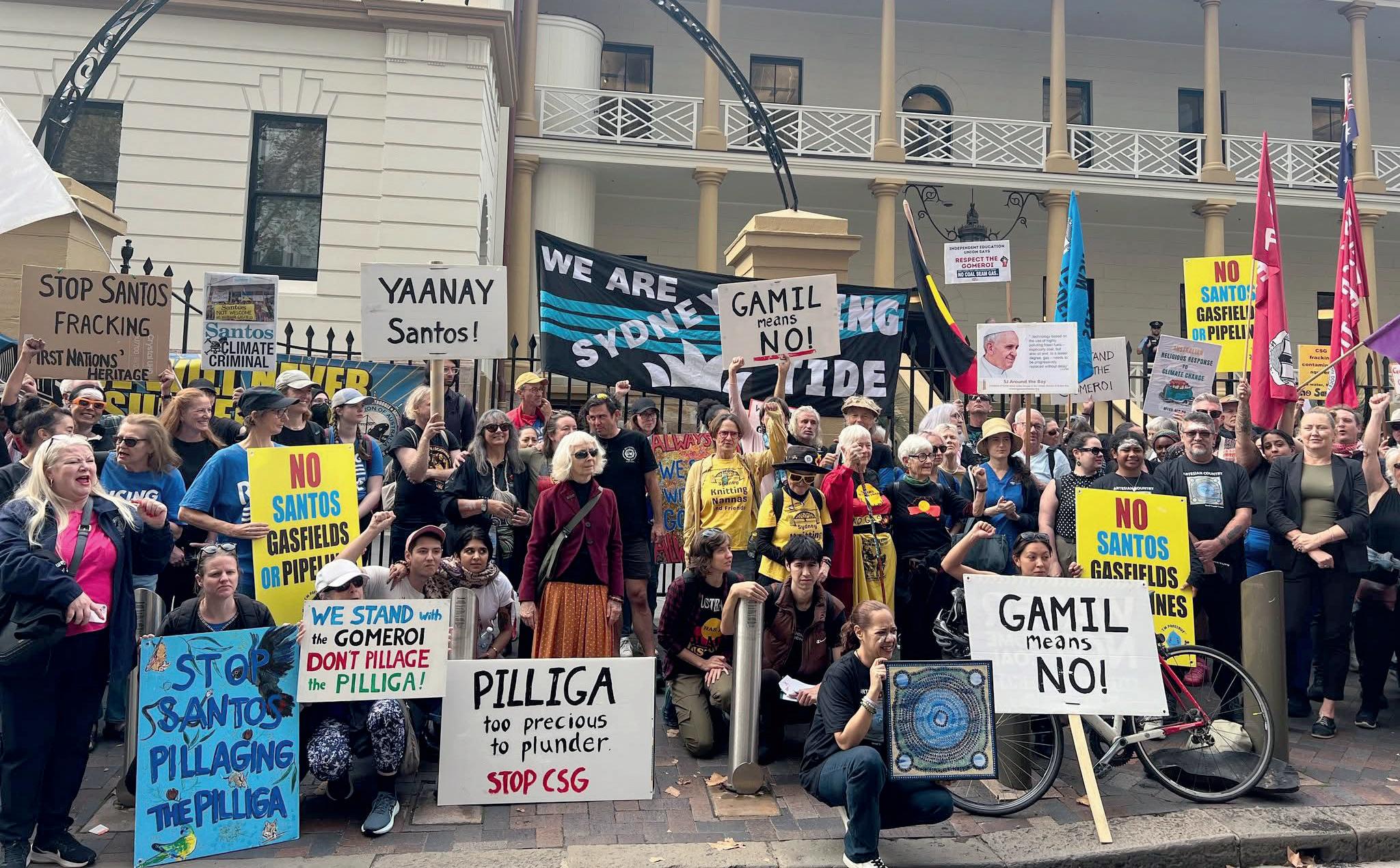
I had lost from the unsuccessful referendum. Australians want progress – but not at the harm of others as Peter Dutton’s Coalition had pitched through three years of opposition.
Gomeroi Traditional owners continue to show incredible tenacity in their opposition to this mine since it was announced over a decade ago. Again and again, the Gomeroi nation have patiently explained to anyone and everyone why this land is so precious. Union’s have listened. Farmers and concerned citizens in the Pilliga and beyond are listening too.
We invite Prime Minister Albanese and his re-elected Federal Government to listen too. Please put an end to Santos’ project in the Pilliga.
Thomas Mayo is the Maritime Union of Australia’s Assistant National Secretary
Australia is already producing enough gas to last Australia a millennia. We don’t have a supply problem. We have past mistakes that can be rectified.
In February, the MUA Sydney branch launched its campaign to introduce Family and Domestic Violence Solidarity Leave into every Maritime workplace.
MUA Sydney Branch Secretary Paul Keating said “Family and Domestic Violence continues to occur in Australia at catastrophic levels. In Australia a woman is killed by a man known to her approximately every four days. We cannot continue to sit by idly and allow this to continue”.
In early 2023 the Federal Government made 10 days paid Domestic Violence Leave a workplace right for everyone working in Australia. This was a huge leap forward. The MUA is pushing that initiative further, by introducing Family and Domestic Violence Solidarity Leave.
Sydney Branch Organiser Shane Reside said “this leave is for maritime workers to render assistance to their loved ones in times of crisis. For example, if my sister in Brisbane was to call me today in tears because her partner has torn the house to pieces, I could get in the car, drive up to Brisbane, pick her and the kids up and bring them back to safety. That would all be covered by this category of leave.”
MUA Sydney Womens’ Representative Taamara Husband said “we’re calling it solidarity leave because that is exactly what it is: solidarity. Women should never be alone in the face of Family and Domestic Violence. But who is available to help really? We know people in Australia are working longer hours than ever before. This leave is about making our time available to our loved ones so we can be there to care for them when the worst happens”.
“As a community we have to take responsibility for ending gendered violence – we cannot continue to let women suffer in silence. This leave provision socializes the responsibility of caring for people experiencing violence. Large institutional employers wear the cost of the leave, and maritime workers can carry their loved ones through crisis” Taamara said.
Coinciding with the campaign launch, forty Union delegates from across every MUA workplace in Sydney participated in a day-long training about Family and Domestic Violence Solidarity Leave. The training focused on how to recognize when our loved ones are experiencing violence, what we can meaningfully do to help them, and how to support the roll out of this leave across the industry.
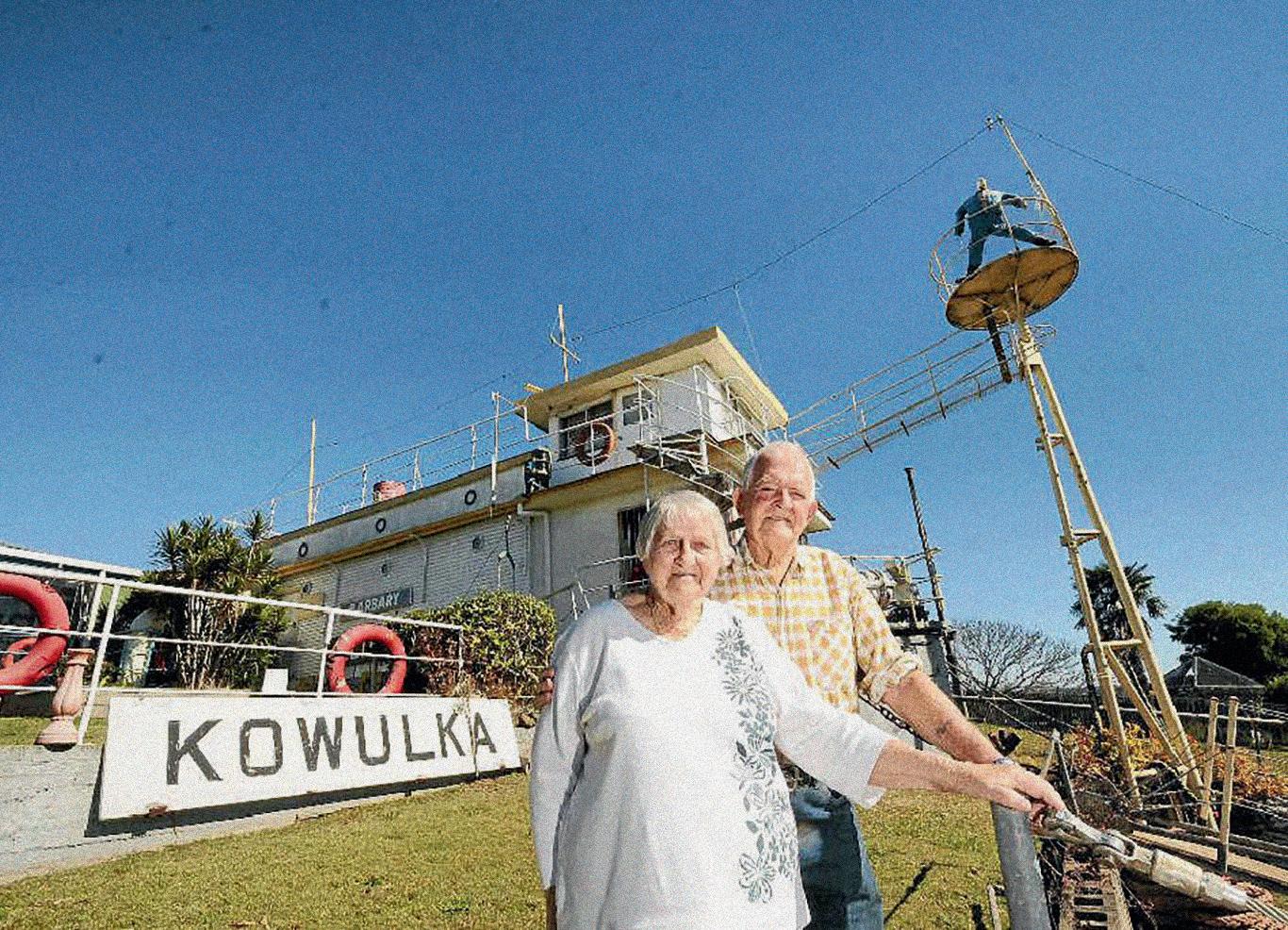
In recent years, Wayne Finch has been working hard to find a new home for many of the artefacts and items in the Finch family’s maritime collection that was once the Finch Maritime Museum until various regulatory hurdles imposed on the museum forced it to close. Wayne is a retired seafarer and member of the MUA (2299).
“First and foremost I would like to thank everyone who donated money or exhibits to the Museum. It’s been very much appreciated,” Wayne Finch told the Maritime Workers Journal.
The Finch Maritime Museum started life in the mid 1960s in Kyogle as a garage off the side of the Finch family home. Established by his father, Frank, the car got thrown out of the garage the moment the museum got its start. In fact, the car got moved a few times until the Museum was the full length of the house. The couple converted nearly half their house into the shape of a ship and for more than 40 years collected maritime memorabilia and displayed the items for the enjoyment of visitors.
Frank Finch, like his son, was a lifelong seafarer. While in the merchant navy between 19421988, Frank brought items home from his trips. As they grew up, three of his eight children including
Wayne also joined various ships and have all contributed to the museum.
“The exhibits kept coming until there was not much room for an able bodied person to move through the space,” Wayne recalls. “Whilst Dad was alive it remained where it had been for 60 odd years but when he died, I went looking for a bigger space to house it all.
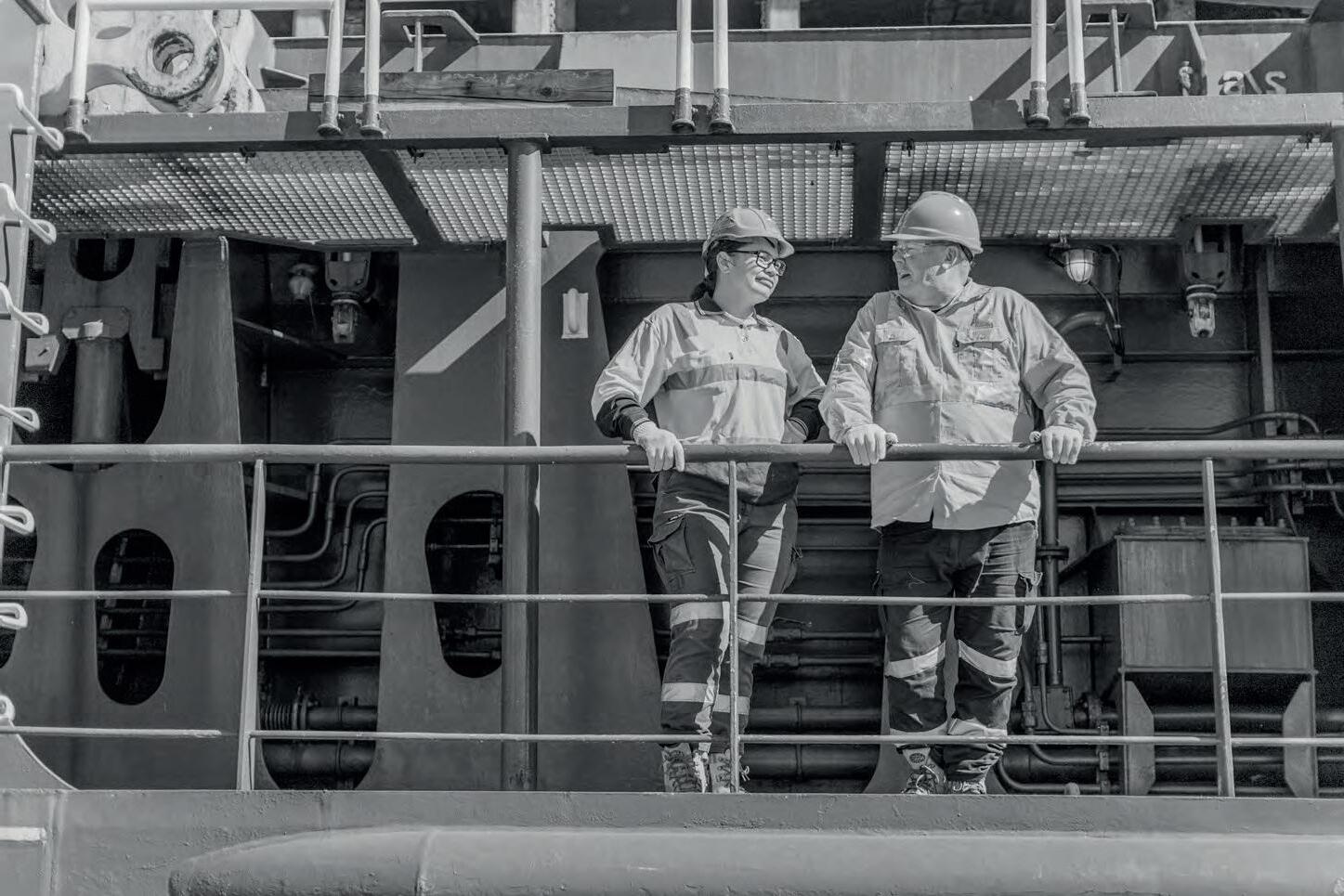
Frank looked at various options. None was panning out. “The final option wasn’t as big as I had wanted, but it was in the main street, so I rented it and started to buy display cabinets and furniture to exhibit the artefacts properly. Six weeks in and the council turns up with “a don’t bother, it ain’t gonna happen” notice.
“They weren’t budging. Eventually I had to look for somewhere else for the collection to go,” Wayne told MWJ.
“If you’re ever in Casino, visit the Military Museum in Ballina, visit the Naval & Maritime Museum in Mt Larcom, Queensland. The local RSL has still got a little bit of the collection here in Kyogle, but the rest has been redistributed amongst the MUA branches with some also going to the Union’s reopened school in St Georges Basin. Any monies left will also be going to the Union School in Dad’s memory. •

Family Home Guarantee – for single parents/legal guardians with at least one dependent4*
Buy a home with a deposit from just 2% and no LMI.5
Community Support Loan3*
Relieve financial hardship during industrial action.
First Home Guarantee4*
Buy your first home with a deposit from just 5% and no LMI
Loan refinance offer*
Challenge
New car fleet discount7*
Get your car and your low-rate car loan all through Unity Bank, from the comfort of your home.
This is an abridged version of Kyle McGinn’s final speech to the Parliament of Western Australia in May 2025
While I might be slightly more sophisticated than when I first entered Parliament, I like to think that I have maintained my integrity and never lost sight of what motivated me to answer the call and put my hand up for the gig in the first place—that is, my commitment to improving the lives of Western Australians, particularly those Western Australians who lack institutional power, which is the majority of the working class.
I need to thank the mighty MUA WA branch, which at the time was led by Christy Cain. If not for them, I would not be standing here addressing you today. No offence intended to my union comrades in this room, but the rank and file of the MUA are the GOAT of unionists. It is because with their backing, I have managed to make some significant inroads into changing the landscape for maritime workers and their industry, which I will touch on shortly.
What some members probably do not know is the main reason I was working as an organiser in the Pilbara in the first place was because I had essentially been blacklisted from the
maritime industry for sticking up ships due to safety breaches and breaches of the agreements. Although I consider this somewhat of an achievement, the fact of the matter is the situation for workers, even in industries where the union is strong, is that they are routinely punished for standing up for safety and for actions to better their wages and conditions.
Things have improved significantly in this space thanks to what the Labor government has achieved in both the state and more recently federally with wage-theft laws, multi-employer bargaining, pay rises for aged-care workers and early childhood educators, to name a few. On a state level, embedding industrial manslaughter into law has been one of the crowning achievements of the McGowan government’s first term. I was humbled to be a part of that historic moment. It was truly amazing for workers across this state.
Helping those who are struggling has been one of the pure joys of this job. When we advocate for groups that find it difficult to find their voice, we galvanise the communities that we work in. There have been many organisations that I have fought and advocated for or supported because I did not believe they were being heard. Something as simple as being invited to a local event and chucking a sausage on the barbie or
running a raffle for the local causes has led to some great grassroot outcomes for communities in Western Australia.
It probably comes as no surprise, but I much prefer being out in the electorate and meeting the members of the regions who are often at times doing it tough while contributing great amounts to our society, whether it be through being land custodians as traditional owners, working in the resource industries to contribute to our economic prosperity or delivering the services and building the essential infrastructure to ensure that WA remains not just the envy of Australia but the envy of the world. But it has not always been sunshine and rainbows, and in a shock to precisely nobody, I have had a few run-ins around the electorate. Some of my parliamentary colleagues love to catastrophise and are not afraid to jump on the old dog whistle in a shameful effort to appeal to someone’s more basic tendencies. Although I have enjoyed calling them out on this, it is a shame job that they resort to such tactics, but it has been a privilege to be the one to slam them back for it.
The other big challenge I encountered during my tenure is something a little bit more difficult to talk about, but I would feel remiss if I did not use my position to talk about it. I was about a year and a half into my first term, and I was struggling. Things were not
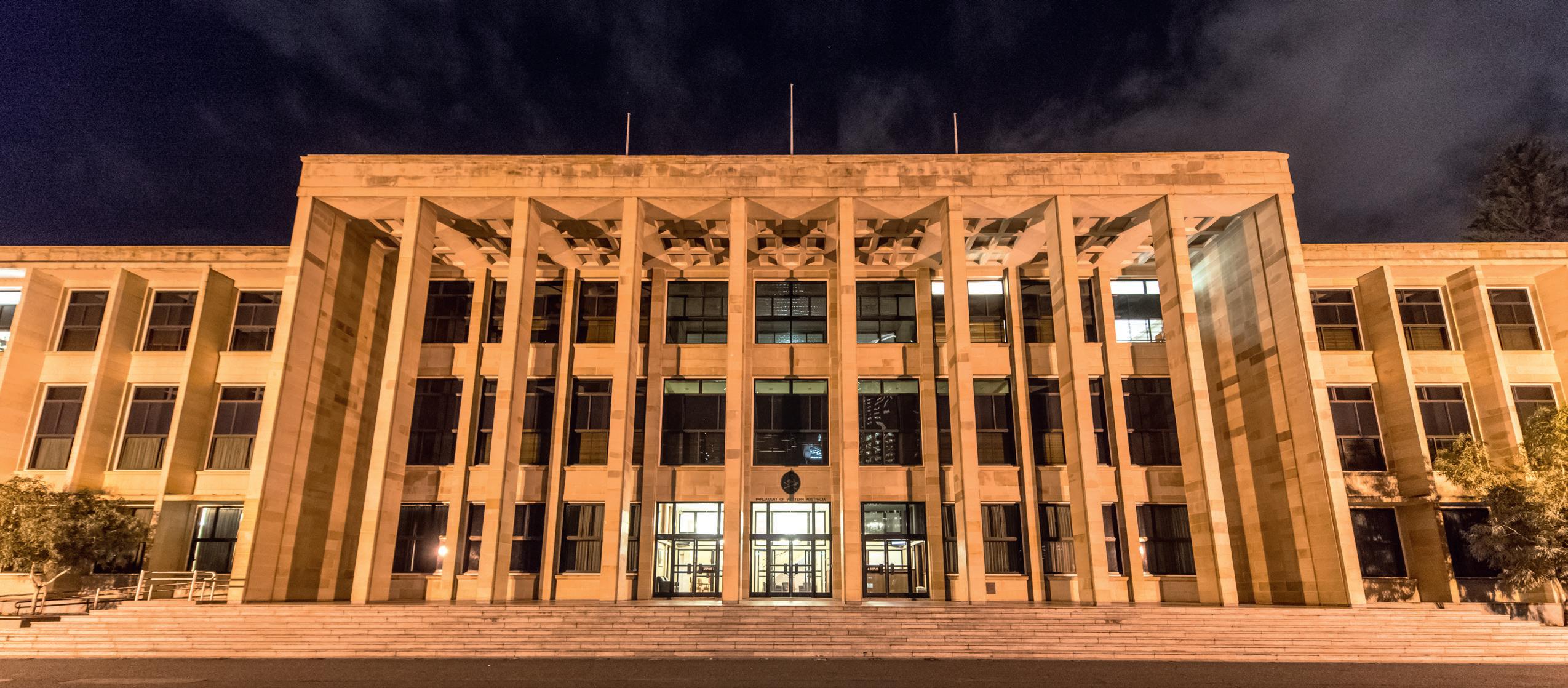
going well at home, and I was still on the steep learning curve of this job, and this job is tough. This job is very tough. I was in Karratha with Minister Papalia. I got off a plane, and I had a sudden feeling that I was having a heart attack. It was hard to describe. I had heart palpitations, my vision was blurry and I felt like I was going to pass out. Fortunately, or unfortunately, it was not a heart attack but instead a panic attack. Shortly afterwards, I was diagnosed with severe anxiety, and I have been on Lexapro ever since.
I found the strength in asking back then, even though it was incredibly difficult. Standing here today and talking about mental health struggles is still difficult. I do not normally shy away from talking about hard topics, so that is why I do not want to leave here without mentioning it. There is no shame in asking for help. Please, fellas in particular, trust me on this— ask for help.
As I have mentioned, workplace health and safety is an issue I am incredibly passionate about. I was fortunate enough to contribute to the WorkSafe inquiry by the Standing Committee on Public Administration in my first term. Being on the Stena Clyde and seeing mates killed on the job was a formative moment for me. Vale Peter Meddens and Barry Denholm; I am sorry you never made it home, comrades.
My brothers and sisters will always be the mighty Maritime Union of Australia. I came up in the rank and file of the MUA, and being in Parliament and advocating for the cause felt like repaying my dues. I am completely aware, though, that I am still indebted. I served as the co-chair on the WA Shipping Supply Chain Taskforce, which recommended, among other things, the return of a coastal ship. Australia is an island nation, and Western Australia is essentially its own island within that island. We have almost 100% of our goods imported and exported on foreign ships. It is a shame. It is an absolute shame. Ships that are flagged in countries such as Liberia, a country known for its regular coups
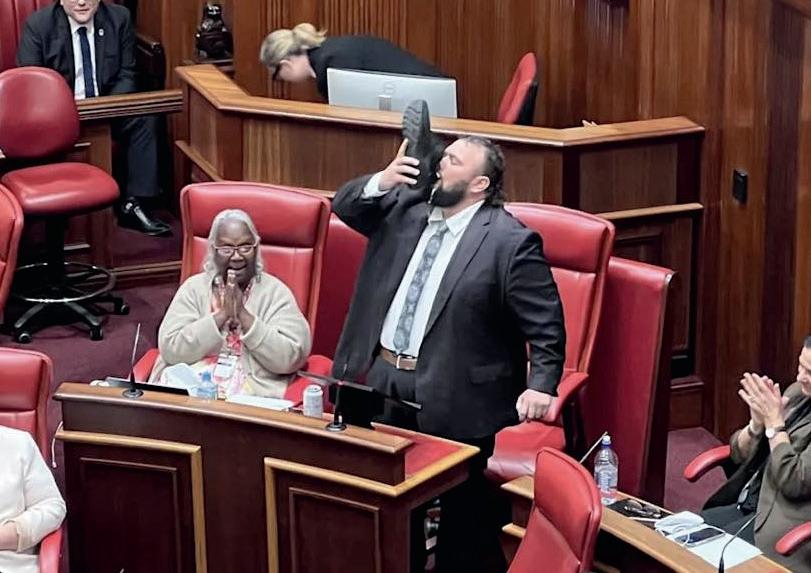
Helping those who are struggling has been one of the pure joys of this job.
and warlords, are crewed by exploited labour from around the world. Even if the shipowner is doing the right thing in terms of international laws—trust me, members, the ones that are doing the right thing are the minority—the seafarers aboard the ships calling into ports from Esperance to Fremantle to Broome and Hedland are on just US$666 a month. They are away from their families from nine to 12 months at a time. Like I said, this is when the shipowner is abiding by international law. I can assure members that the majority are not.
Imagine a truckdriver delivering goods from the east coast of Perth is not allowed to go home for nine months and is paid 250 bucks a week. I know—it sounds like a Gina Rinehart dream, but I reckon even those opposite would agree that we would not cop it for our truckies, so why do we cop it for our ships that travel between the east and the west coast? It is one of the proudest moments for me over these eight years to be a former seafarer and to be the co-chair of a taskforce looking into seafaring. I cannot stress how much I believe people who work in the industry should be at the table. That is something I have been proud of for the last eight years in this chamber. I am so proud to have worked for this government to recognise the issues in seafaring, and I look forward to continuing to work as a civilian in rolling out the $5 million Supply Chain Resilience Fund that was announced during the election. We will see an Australian flagged and Australian crewed coastal ship returned to us
and this will be a win for every single Australian.
I did not deliver everything I wanted to deliver for Maritime Union of Australia members during my term, but I can assure the rank and file, and also the people in this room, that I will be successful in ensuring that unnecessary and unproductive automation on the wharves remains a pipedream for greedy bosses whose motivation is not even just profit, but subjugation. Automation on the waterfront is proving around the world to be a failed experiment. It is no more productive than human labour. It is a hoax, it is a joke and it should not be allowed in Western Australia. It is a security risk and a risk to micro-economies. Call me a Luddite if you will, but we must protect our waterfront at all costs.
Standing up in this chamber to take a swing at a corporation or two has been a sweet pleasure of mine. I am honestly going to miss that. Rio Tinto and Chevron, I will see you on the outside. I did not even graduate high school, and I was able to stand in here and hold power to account. We need people from working-class backgrounds just as much as we need those with law degrees to be able to contribute to discourse. I hope into the future the Labor Party continues to give workingclass people off the tools the chance to be in this place to drive change. If you are not at the table, you are not heard. I feel that other accidental pollies are exactly what this place needs. While it is a bittersweet moment to be leaving— part of me thought I could have achieved a little more—my contribution to the betterment of the lives of Western Australians is not over. I will see you in the future as I keep up the fight outside this place.
I thought so long and hard about how I will finish this speech—my constituents in the Goldfields, I think, will be particularly appreciative. There was only one way to do it and I am used to getting told off, so we might as well get this over and done with, but I would like to say to the members and the constituents across WA, thank you for two fantastic terms. Cheers! •
The two unions forming the Offshore Alliance, the Maritime Union of Australia (MUA) and the Australian Workers’ Union (AWU), issued a call in June on the Federal Minister for Resources, Madeleine King MP, to ensure that responsibility for the dismantling of the Northern Endeavour is not offloaded to a European breaking yard. Such a move would be in direct contradiction of the government’s policy commitments to build a sovereign decommissioning and green metals industry under the “Future Made in Australia” agenda.
MUA National Secretary Paddy Crumlin said, “Towing the Northern Endeavour to Denmark or Norway for dismantling is not just an absurd outsourcing of jobs—it’s a 15,000-nautical-mile climate contradiction. By the time it gets there, we’ll have burned more fuel hauling steel across oceans than it would take to recycle it here at home.
“The ALP’s own platform commits to establishing a
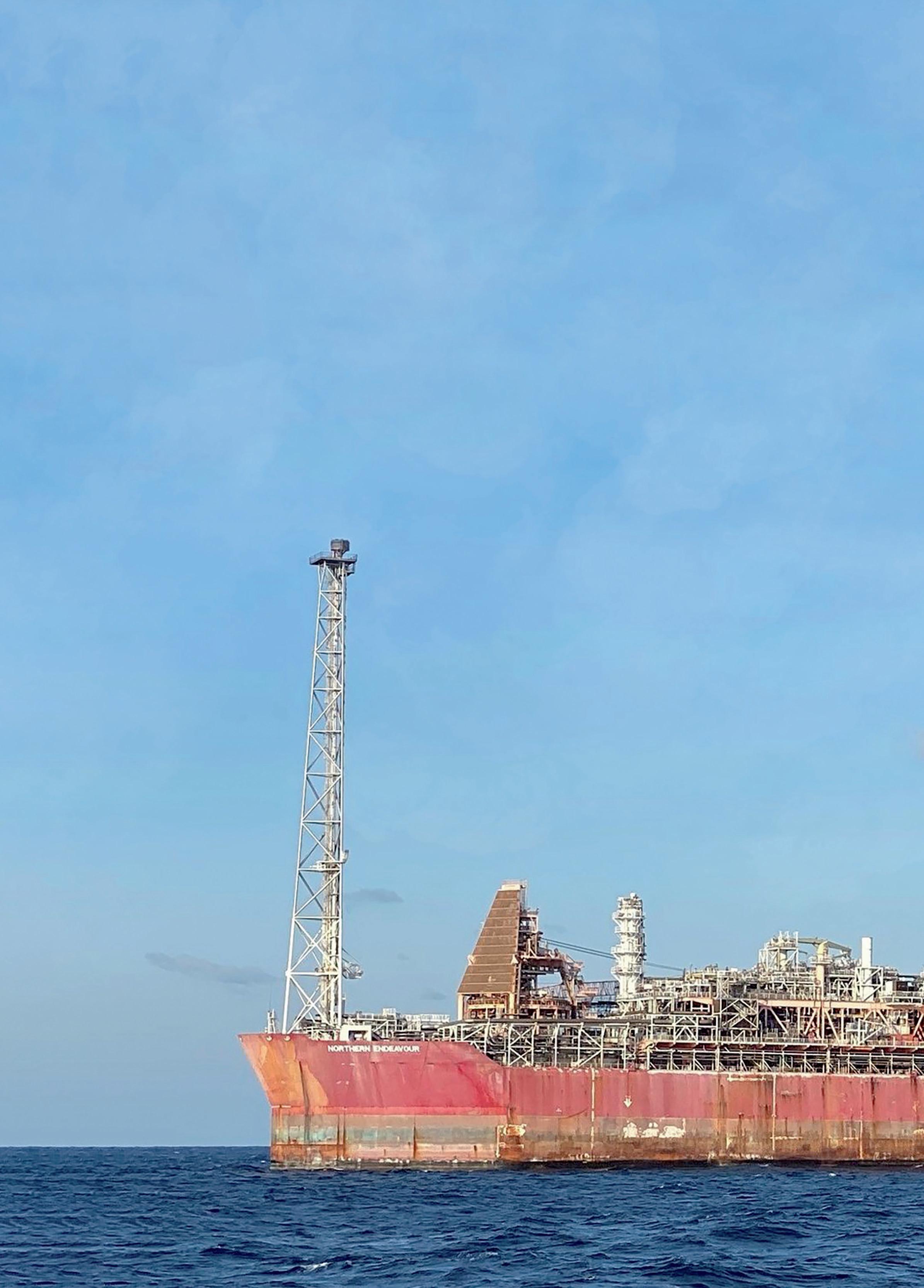
domestic decommissioning industry that secures local jobs and ensures world-class environmental standards. Yet here we are exporting a prime opportunity to do just that.
“Australia’s offshore oil and gas infrastructure contains an estimated 3.7 million tonnes of high-quality ferrous metal, suitable for recycling into low-emissions steel. This represents a once-in-a-generation opportunity to feed a sovereign green metals industry—if we keep that material onshore.
In 2023, Macquarie University released an report calling for dedicated sites to handle Australia’s emerging decommissioning industry. Academics and policy experts warned of a looming shortfall in onshore dismantling infrastructure— particularly in WA where the concentration of end-of-life oil and gas infrastructure will be greatest—and recommended investment to develop domestic ports, yards and recycling capacity.
The Department of Industry
Science and Resources has failed to incentivise development and investment to meet this demand.
The report also outlined how Australia’s existing offshore oil and gas workers are well-placed to lead this work, safely and efficiently, if state and federal governments provide the appropriate policy and regulatory frameworks. However, as MWJ goes to print, Australia is on the verge of outsourcing the dismantling of the Northern Endeavour to an American firm with a breaking yard in northern Europe.
The Federal Labor Government pledge:
“Labor will establish an Australian decommissioning industry... Labor will work with industry to establish shared infrastructure requirements such as membrane-protected yards and vessels to carry out decommissioning, dismantling and recycling works.”
In a 2023 statement to Parliament, Resources Minister Madeleine King affirmed that:
“As industry starts investing to decommission $60 billion in
We strongly urge the government to reconsider this proposal. The Northern Endeavour and other decommissioned facilities represent not just environmental responsibility, but an important economic opportunity for Australian industry and communities.
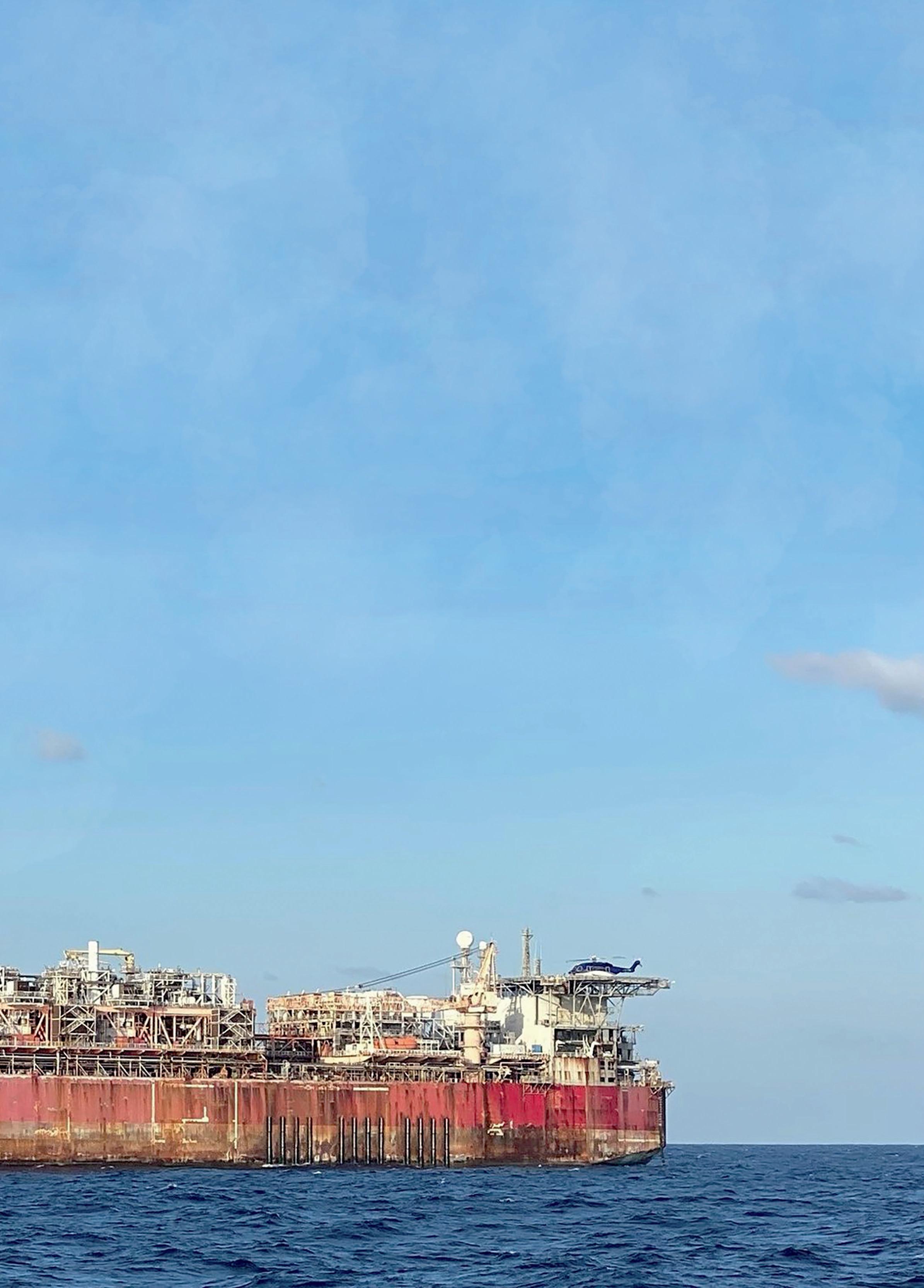
offshore infrastructure, we want as much of that investment to be spent backing Australian industry and Australian jobs.”
The Maritime Union of Australia is calling on the Albanese Government to reinvest the Laminaria-Corallina Levy into building domestic dismantling infrastructure—starting with a dedicated Decommissioning Marine Terminal in Western Australia.
Established following the Northern Endeavour debacle, a levy was designed to recover the public costs of decommissioning infrastructure abandoned by industry. With up to $1 billion to be collected from offshore oil and gas operators, the fund is well placed to support investment in sovereign capacity that prevents further regulatory failures.
MUA National Assistant Secretary Thomas Mayo said “The levy was created because industry has shirked its responsibility. The best use of those funds is to build the very infrastructure that ensures this never
happens again”. “This is a chance for the government to turn a failure into a foundation. Public money should build public benefit—not subsidise foreign shipbreakers”.
“This should have been the cornerstone of a new era of green manufacturing in Australia, we should be feeding that steel into an Australian electric arc furnace, not shipping it to Scandinavia on a foreign-flagged vessel.”
Redirecting the LaminariaCorallina levy to build domestic dismantling and recycling facilities would cut environmental risks and long-haul tow costs, while creating secure union jobs and retraining opportunities for offshore workers. It’s a chance to transform a clean-up liability into a strategic asset—advancing ALP Platform goals and Future Made in Australia commitments.
Meanwhile, countries like Brunei are doing what Australia has failed to—building capacity through public investment and collaboration with industry. Brunei now hosts regional dismantling contracts once earmarked for Australian ports.
The MUA’s position is echoed by its partner in the Offshore Alliance, the Australian Workers Union.
“It is deeply disappointing to see the government considering shipping the Northern Endeavour overseas rather than harnessing this opportunity to support local industries and workers. Decommissioning offshore facilities domestically isn’t just about preserving jobs—it’s about creating new ones and bolstering our steel manufacturing capabilities.
“Australia’s steel industry is ready and capable. We have workers prepared to do this job safely and efficiently, and our mills stand ready to recycle high-quality ferrous metals into vital infrastructure for our future. Sending these materials abroad is a significant missed opportunity for economic growth and job creation.
“We strongly urge the government to reconsider this proposal. The Northern Endeavour and other decommissioned facilities represent not just environmental responsibility, but an important economic opportunity for Australian industry and communities.” •
As MWJ goes to print, MUA is mourning the loss of Jimmy Donovan, a former WWF and MUA Sydney Branch official, lifelong member of the Communist Party, and a resolute member of the working class until his last day.
As a child, Jimmy was brought to the Waterside Workers Federation’s union rooms by his mum, Jessie, who enrolled her nine year old son in art classes delivered there by artist Nan Horton in the union library built by Tom Nelson. It was as a child that Jimmy saw the Sydney wharfies’ mural first take shape in its and his formative years of development.
However, while he began his working life as an apprentice boilermaker at the NSW Government Railways in 1957, he eventually came back to the waterfront in 1963, where he quickly became a workplace leader and political activist.
Jimmy was a fighter and an uncompromising trade union and labour union leader that dedicated his life to the working class and understood the importance of class struggle driven by unity, peace, social justice and universal respect and recognition for worker and human rights in the face of the enormity of the challenges he dedicated his life to facing. He was an activist and leader of our community for over 62 years as a wharfie, an official and later an MUA veteran.
Jim was revered and cherished to the very end. His last contribution to the MUA Film Unit was just ten days before his passing, when he recorded a message of solidarity for our comrade Willie Adams of the ILWU. One legend
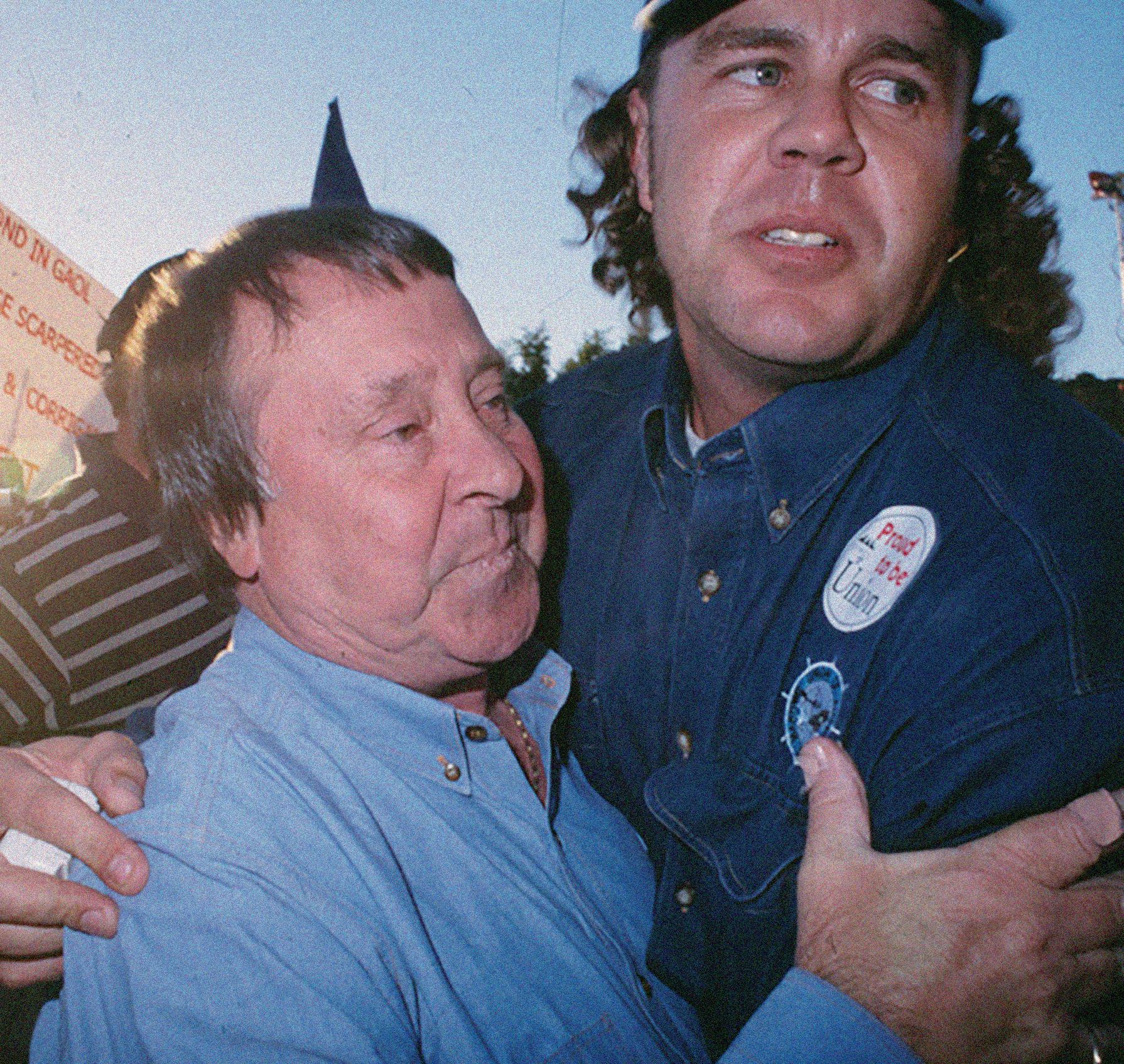

of the waterfront commending the contribution of another.
The MUA, CFMEU, ITF and the IDC on behalf of their affiliated unions worldwide offer our deepest condolences and sympathies to Jim’s family, comrades and friends and particularly to Stephen and the family in the hope we in some way ease their sorrow at the passing of our dear friend and comrade.
Jim’s life was driven by courage and determination often during times of significant challenge and hardship for
Jimmy was a fighter and an uncompromising trade union and
labour union
leader that
dedicated his life to the working class and understood the importance of class struggle...
working Australians but also working people throughout the globe. He inspired us to follow his vision of a better, fairer and more just workplace. This in turn, he taught us, would improve our society, the nation and contribute to a better, fairer world.
In line with this commitment to working class internationalism, Jimmy was one of the instrumental players in the formation of the International Dockworkers Council. Likewise, at home, he was a leader of the MUA after its inception in 1993 from the

amalgamation of the WWF and the SUA, and served as both a Sydney Branch Secretary but also as the MUA’s National President.
During these periods, one of the MUA’s most challenging chapters unfolded; the 1998 Patricks dispute. Jimmy was in the thick of it, day in and day out, alongside the tens of thousands of MUA members, supporters, fellow travellers and ordinary Australians who flocked to the picket lines to defend Australian wharfies’ right to a dignified, safe and respectful workplace.
No greater contribution could be asked for or delivered. Jim’s memory serves at this time of great attack and hardship on working people as a terrific inspiration to walk in his footsteps in everything we do as trade unionists.
Jimmy was a tremendous custodian of the great oral history of the MUA and its predecessor, the Waterside Workers Federation. Through his recollections, good humour and peerless record of activism on the Sydney waterfront, Jim served as an inspiration to young workers and
new entrants to this oldest and most storied industry.
It was a source of immense pride for him when the Australian National Maritime Museum unveiled the Wharfies Mural in 2022, a permanent acquisition and display at the Museum made possible by Jim’s foresight in working with Tassie Bull through the early 1990s to preserve the mural for future generations. It would take almost another 30 years for the mural to finally go on display at the National Maritime Museum, something which Jimmy worked tirelessly with the Sydney Branch and National Office to achieve on the eve of our Union’s 150th anniversary.
Aside from his contribution to workers’ lives in their employment, Jim was an energetic campaigner for the preservation of the communities and streetscapes in which the workingclass people of Sydney had lived and built communities. He carried this torch on behalf of his mum, Jessie, who had fought in the 1950s to protect workers’ housing in Woolloomooloo.
In turn, history records that Jimmy was one of the last to leave Rowena Place
in Woolloomooloo with his own young family in 1975 under threat of arson and murder after the “disappearance” of Juanita Nielsen.
Later in life, after retiring as a full time official, Jimmy devoted himself to the ongoing cultivation and mentorship of young maritime union activists as a leader of the MUA Veterans. He was a fixture at stoppies and inductions of new members, as well as an energetic campaigner for the causes that the Union tackled throughout the last twenty years.
Jim, following in his mum’s footsteps, also continued to advocate for inner-Sydney’s working-class history, including as a Guide of walking tours through Woolloomooloo where he was able to share the rich social and cultural life of the old Sydney with younger generations and visitors.
Vale Jimmy, friend and comrade, person of family, peace and equal opportunity and justice for all.
Now at peace after a long and important life’s journey.
Paddy Crumlin MUA National Secretary
20/09/1944 – 03/06/2025
Col and Faye married on the 5th October 1974 in Williamstown Gardens, a low-key affair with families and friends and a reception at their home in Williamstown.
A great night ensued with ample drinks, food and dancing. The success of the evening was demonstrated by the number of bodies lying around the next morning, but for Col and Faye the celebrations were cut short due to repairs required for Col’s truck which was broken down at Tarcutta on the Hume Highway.
So, their honeymoon consisted of a 470 km journey to Tarcutta to repair the wheel, a quick feed and then the long drive back home. They arrived that evening for a sleep before Col started work on the wharf the following morning.
Fifty years later they were still going strong on an incredible journey together that traversed all of the highs and lows that a life spent together entails.
It wasn’t until Col retired and had time to sit back and reflect on things that he said being a wharfie and
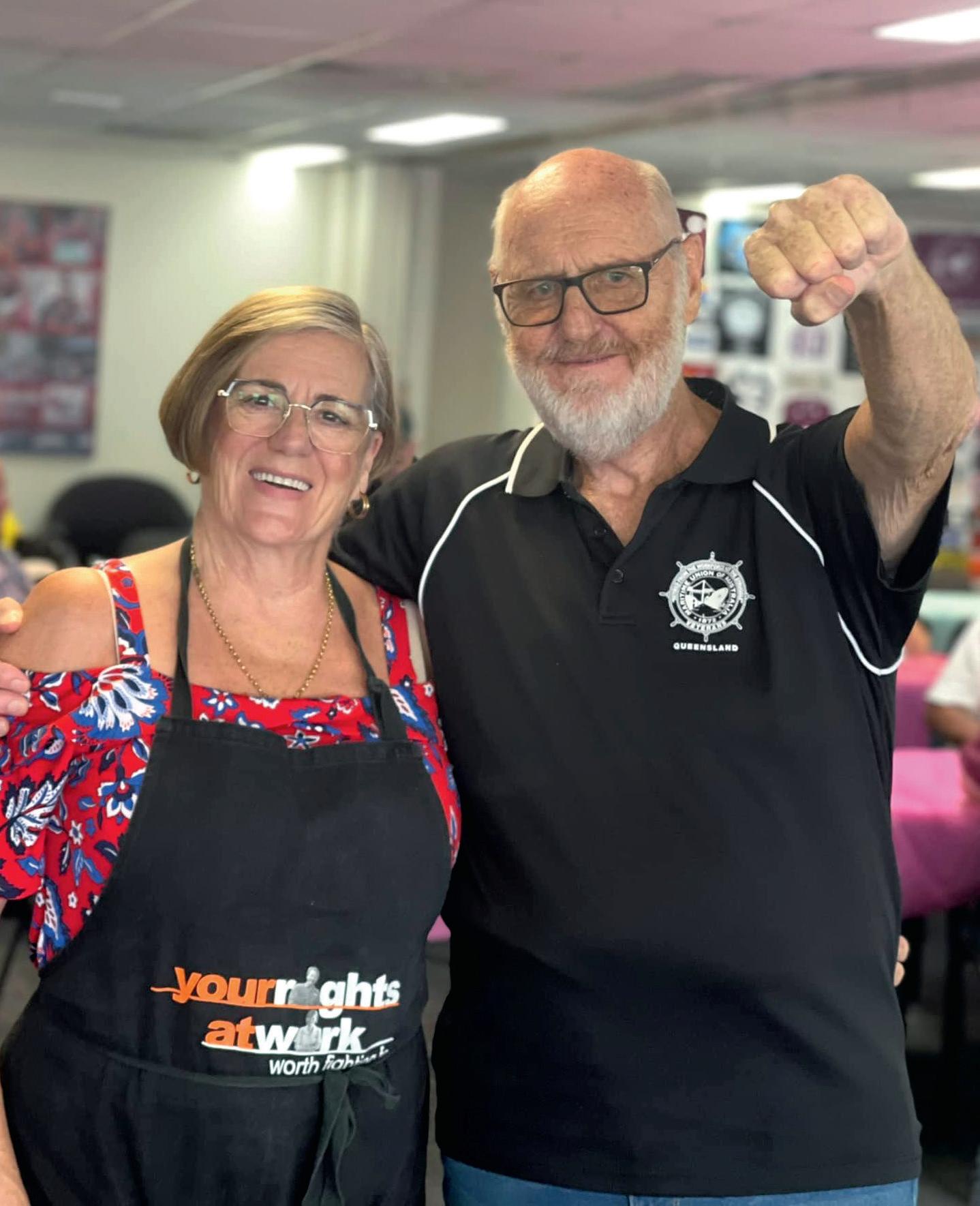
subsequently, a Union official, was the best job he ever had. Col had ‘found his tribe’ and would never leave.
Col joined the waterfront in August 1974 at the Port of Melbourne when selection criteria was very different to what it is today. The first step was application
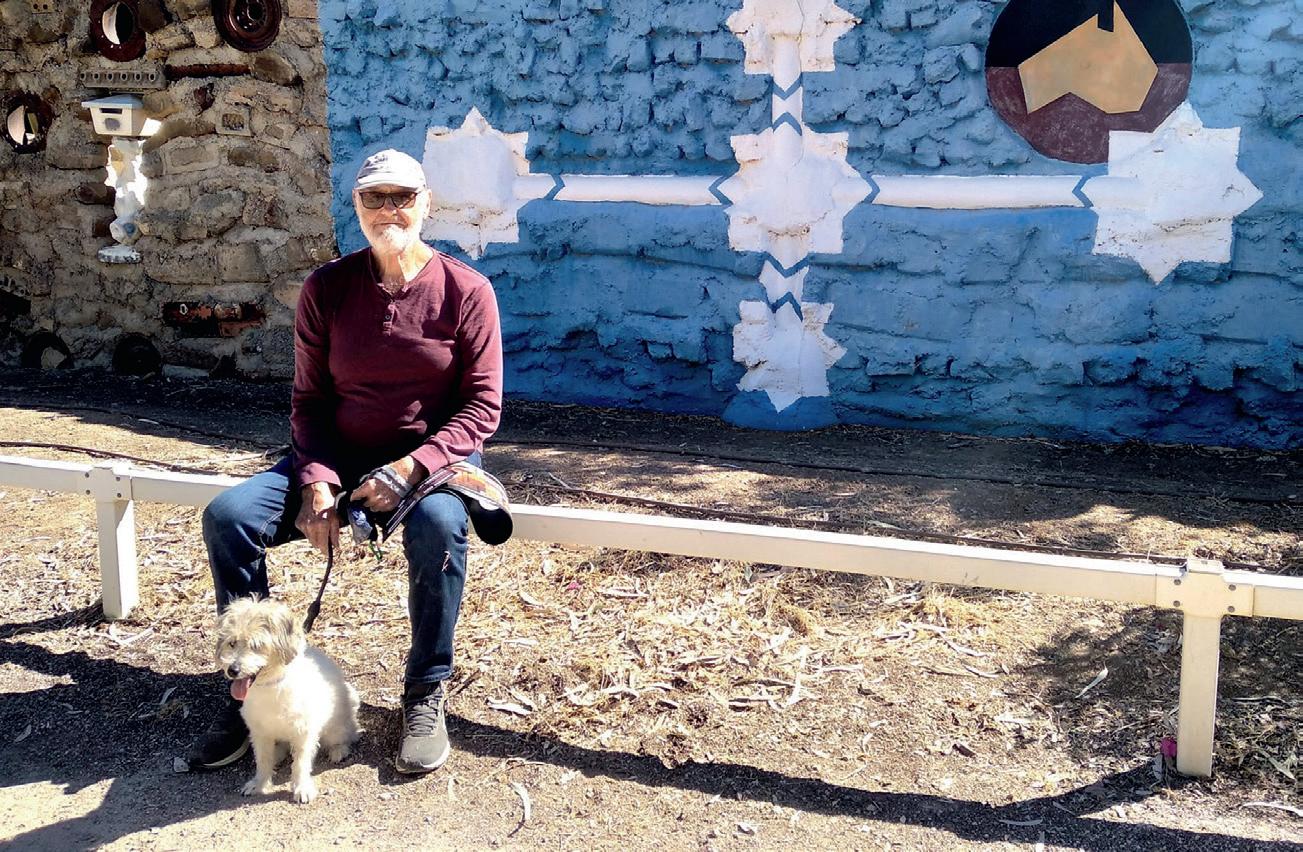
by mail followed by an interview by the Association of Employers of Waterside Labour, followed by a medical. If you got through those stages, you would front a stop work meeting (SWM) and get the once over from the union membership.
At Col’s first SWM at the old Melbourne Stadium, fifty hopefuls fronted a meeting of 1100 members where, after general business, the applicants were paraded onto the stage for the once over by the members. He recalled it was an intimidating experience and seven applicants missed the cut, but Col made it and he never looked back.
His first job was lumping 58 kg bags of flour for the Columbo Plan, an economic aid initiative to provide commodities to countries in South East Asia during the Cold War. An older wharfie told Col this was a test and seventeen of the intake didn’t make it past the first two weeks. Col on the other hand was well on his
It wasn’t until Col retired and had time to sit back and reflect on things that he said being a wharfie and subsequently, a Union official, was the best job he ever had. Col had ‘found his tribe’ and would never leave.
way, had begun attending delegate training and relished the camaraderie and power of the collective.
He knew he belonged and never looked back. Quickly, he worked through the stages of activism, both industrial and political representing members interests as job delegate and on committees and eventually as Queensland Secretary and Joint Branch Secretary in probably some of the most difficult and challenging times in the history of the union.
Col was there for it all; the joining of two hugely successful organisations in the historic amalgamation in 1993, the introduction of the temporary third operator, Sealand and the negotiations for their roster only to see that company fold, the 1997 dispute in Cairns and the following year, the massive nationwide Patrick’s dispute which tested the union to its limits.
Perhaps the most challenging matter that Col had to deal with was the closing of the Waterside Workers Club in Macrossan Street. The club was a tremendous asset and a key meeting place for wharfies over many decades, but with the transitioning of labour toward the mouth of the river and falling patronage, it was becoming inevitable that eventually the club would have to close.
There is much more of course to Col’s story not only as an activist, delegate and official. He was instrumental in the success of not only the Branch but also the broader trade union movement. He was an inspirational character but never really stopped once he retired from full time work. As soon as he had stepped down as a full time official, he took on the role of leading the MUA’s veterans in Queensland. Alongside this he also advocated on
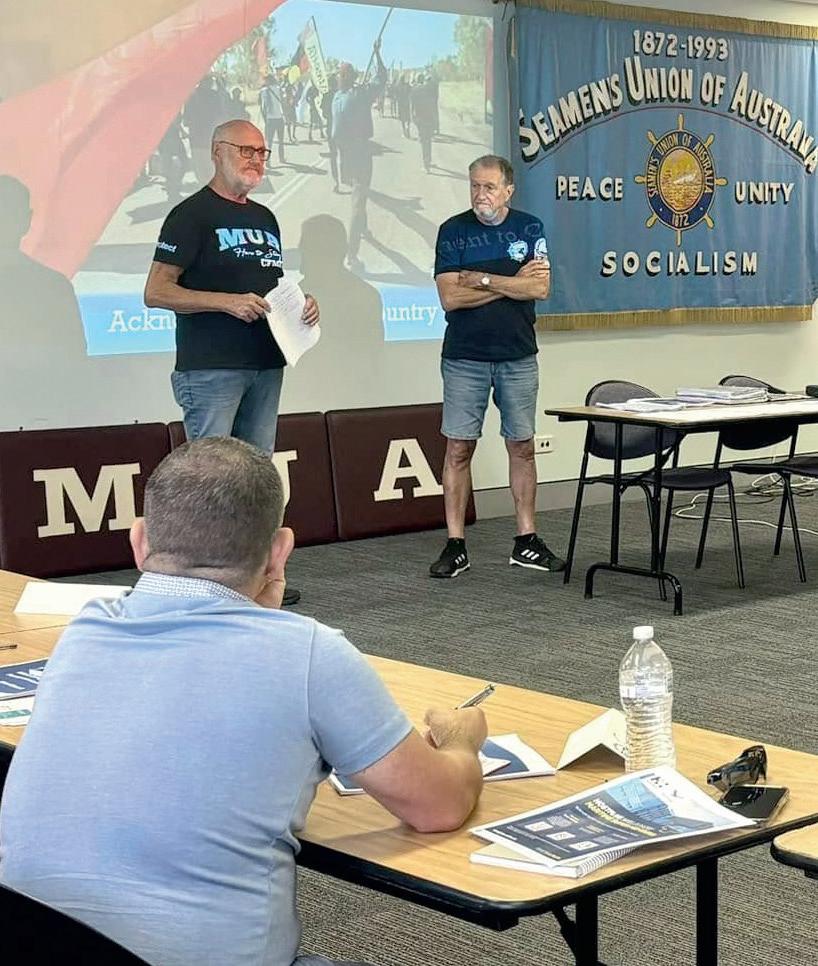
behalf of pensioners more generally.
Col was always a team player and together with Faye, they were a formidable team in everything they did. Whether they were packing the Prado and hooking up the van for their various travels around the country or organising meetings and Christmas functions for the Vets, everything was done to ensure a successful outcome.
Col faced many physical challenges throughout his life. Coming from the trucking industry originally and having suffered a serious car accident as a 22 year old which resulted in many operations (which didn’t really help) and being codeine dependant for more than 20 years, Col was diagnosed with bladder cancer in 2014 and in 2017 was faced with serious surgery to remove his bladder and prostate.
Such was the man, however, Col continued to play his role in any way he could, describing his ongoing health battles as some days feeling like diamonds and some days feeling like stone. But he never missed helping the Vets or in the Branch delivering training courses for new entrants, delegate courses or at Life
Are you an active member, the kind that would be missed? Or are you just contented, that your name is on the list?
Do you attend meetings and mingle with your flock? Or stay home in comfort to criticise and knock?
Do you play an ACTIVE part to help your mates along? Or are you merely satisfied, to just simply belong?
Think it over members. Do you know right from wrong? Are you an active member? Or do you just belong?
as told to Brisbane Youth Conference by Col Davies

Membership presentations.
There are many ways to sum up his life, but the ones I came to know having worked with him in many areas over a long period of time are of a devoted family man who loved hard, worked tirelessly and never gave up on anything or anybody who needed a helping hand.
He was a fine son of the working class, a steady hand in difficult times, a leader and a friend but most of all a loving husband, father and grandfather.
Vale Col Davies – gone but not forgotten.
Mick Carr
Former MUA Queensland Branch Secretary
Vale ‘Rusty Joe’
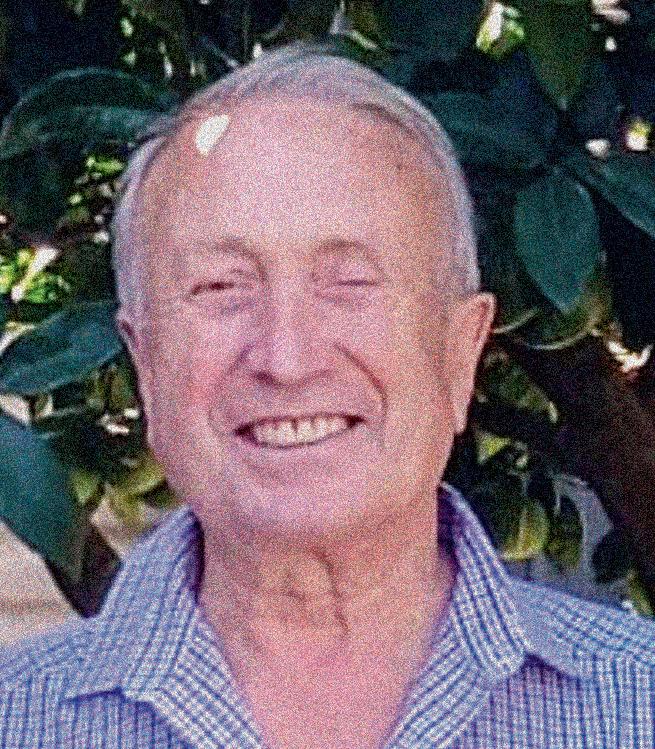
Giuseppe was a union member for over 30 years. He started on the waterfront in 1964 working as a casual for various stevedore companies but was made permanent in 1968 working for Strangs, later Patrick’s where he was a Portainer operator.
After the 98 dispute he decided to take the package and retired from the waterfront.
He was a well-respected member.
Rest in peace.
Mark Boscarino
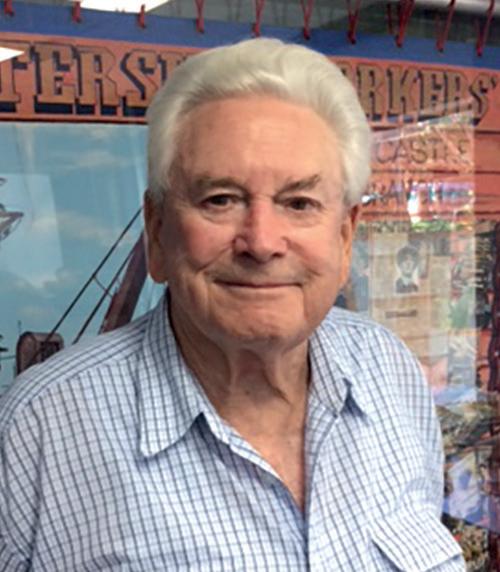
I feel fortunate and honoured to have had Tom Curphey as a friend and comrade.
We met early in my seagoing career, I remember it vividly, on the corner of King and Union streets, waiting at the lights on the way to the pickup. We chatted as we walked and upon parting he asked “have you heard of MUSAA comrade?”
It was the beginning of an enduring
camaraderie that taught me, like most of us here today, the theory of Surplus Value, the authenticity of the WFTU over the ICFTU globally, Marxism – Leninism, Political Economy and most importantly, that trade unionism can only be successful when run in parallel with the pursuit of Socialism. These discussions over the years were always interspersed with Tom’s dry humour, nearly always finished with a cold ale but always began with the question “How’s the family comrade?”
While Tom was incessantly trying to right the many wrongs of the world, when in his company Tom’s priority was that all was well in your world.
I read some communist graffiti painted on a wall in Barcelona years ago that said “Your blood is red and you heart is on the left!” Well Tom, yours ran scarlet and you heart was somewhere under your left arm pit.
We’ll miss you comrade, In love and solidarity, Nathan, Trudi, Daisy and Nelson Niddrie.
18 September 1932 – 30 September 2024
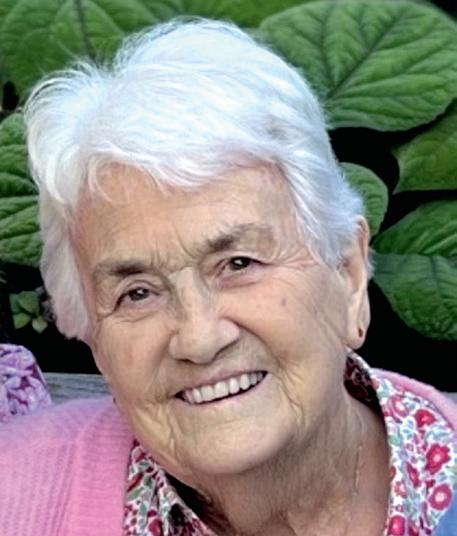
Tui was a great supporter of her husband Jim in his role as National President and in turn the MUA members became her extended family.
As far back as 1955, Tui was involved with the women’s committee who started the Life Members’ dinners. It was an inspired idea to look after the past members with care and respect.
In the early days it was a simple affair, a bottle of beer, a chicken leg
and sandwiches in the old union rooms in Flinders Street. Today’s three course silver service at Mooney Valley Racecourse seems a million miles away from those early beginnings.
Tui supported Jim through his role as National President, accompanying him to the National Conference in Sydney each September.
Tui enjoyed entertaining fellow wharfies in hers and Jim’s home. She would take endless phone calls from members needing to chat to Jim. If Jim wasn’t home she would often provide a listening ear to one of the many members who would need help with a compensation claim or the like.
After Jim’s retirement from his paid position as National President and when Jim could no longer drive, Tui became his taxi and would ferry him to all his MUA meetings which she would also attend. These included the veterans, stop work and ITF meetings.
Tui treated the wharfies as her extended family. She loved them and they loved her. She told everyone she was proud to be a Wharfie’s wife.
When Tui first read the Uluru Statement from the Heart, her first thought was, “Australia cannot move forward until we put right the mistakes of the past”.
For the rest of her life there wasn’t a day that went by where Tui didn’t carry that message to people personally or at public meetings.
Tui formed a great friendship with the MUA’s Assistant National Secretary, Thomas Mayo, and his family. Thomas was kind enough to give a eulogy at Tui’s funeral.
Although she looked at the referendum outcome as a setback, she never gave up fighting for a fairer Australia where everyone was treated equally.
Tui passed away peacefully at home surrounded by her family after a short illness. She will be remembered for her kindness to others and her love for all she met.
Roy Arceri
Past Secretary, Victorian Branch Waterside Workers Union
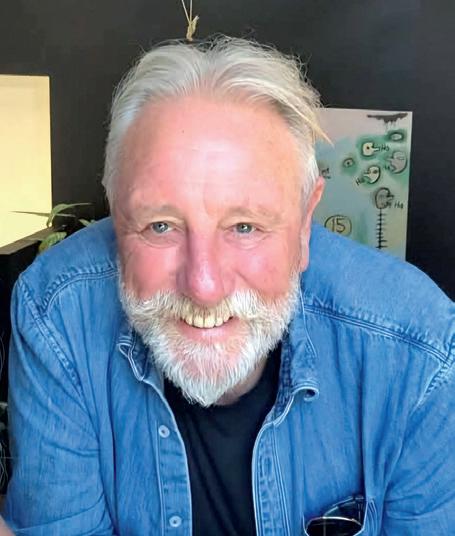
It is with deep sadness that the Tasmanian Branch informed members of the passing of MUA Veteran John Allwood in January.
John was a very well-known and beloved seafarer and fellow comrade who joined the MUA back in 1991. He would go on to retire in 2020 after 29 years at sea, where his contribution and camaraderie was relied upon and appreciated by all who worked with him.
We send our deepest condolences to John’s daughter Amanda, family and friends.
Fair winds and following seas, Jason Campbell
MUA Tasmania Branch Secretary
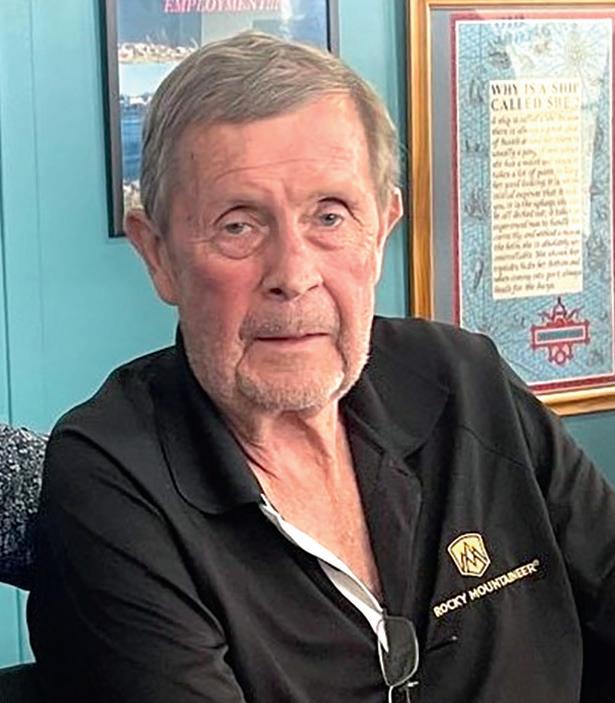
The branch was very sad to pass on the news Veteran and Life member Victor Diggle passed away in December last year.
Victor was a very well-known and much respected stevedore on the wharf in Burnie for many years before his retirement back in 2011. We were always very happy to see Victor at
the annual Veterans Christmas Lunch as he was always happy to share a memory or two. He will be deeply missed.
VALE Comrade Victor Charles Diggle 1951-2024.
Alisha Bull
MUA Tasmania Deputy Branch Secretary
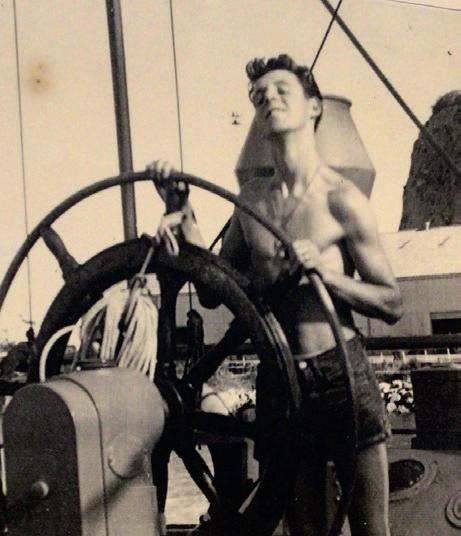
Lachland ‘Lochie’ MacDonald let go the lines at the Murwillumbah Greens care nursing home on Tuesday 24 June where he had been anchored for the last year or two and set sail for Fiddlers Green.
We all wish him fair winds and fine weather on his final voyage.
Lochie’s stories will abound around the bars and taverns of Fiddlers Green and as in life he will not be shy of taking poetic license to embellish his escapades. He spent many of his early years after coming across the ditch living at Rignold Street Seaforth, affectionately named Mumbling Towers. Numerous seafarers, myself included, spent time there while on the roster.
I sailed with Lochie on three or four occasions the first in the late seventies aboard the Anro Australia where he revelled in the job of permanent mud pilot. He was a good shipmate and we spent many happy times in the bar (ah the good old days) playing cards whilst partaking of a few cold ones. He was also known to practice his expertise as a card shark.
I spent time with Lochie on the Challis Venture in the Timor sea. We then spent three months at the
Maritime College in Launceston together during 1988. It came to be known as the winter of our discontent.
Lochie moved to West Tweed Heads in 1987 where for a while there were six SUA members living in the same street. We spent many nights in Seagulls Leagues Club, which became known as the SUA Tweed Connection. You could have manned a couple of vessels out of there.
Lochie, you’ll be sadly missed comrade by all who knew or sailed with you.
Your old shipmate, Geoff Tickle
SUA/MUA life member #5654
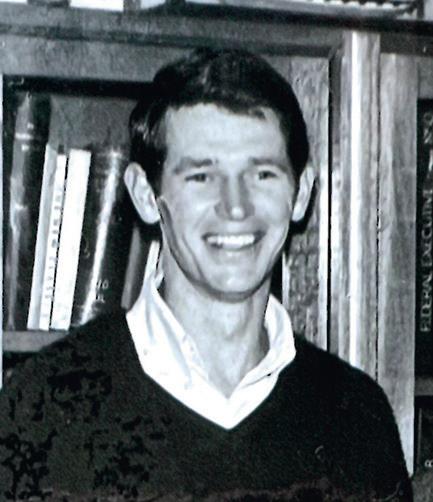
Late of Bondi Junction, Brian passed away in April at the age of 85.
Born in Bowraville and raised in Marrickville, Brian spent over 23 years on the waterfront at Patricks, but this was the culmination of 40 years altogether spent working on the Australian waterfront after joining the stevedoring industry as a 17 year old in the mid 50s.
Pictured here with his late wife Mary and Waterside Workers Federation leaders including A member of Gang 36 #14, Brian worked at Glebe and Port Botany and was a proud wharfie and union member; in 1990 he represented the union at the New Zealand Waterfront Workers Union conference in Wellington.
Lovingly remembered by his two daughters, Simone and Renate, and grandchildren Liam, Summer and Kyle.
Rest in Peace. •
20/03/1963 - 18/02/2025
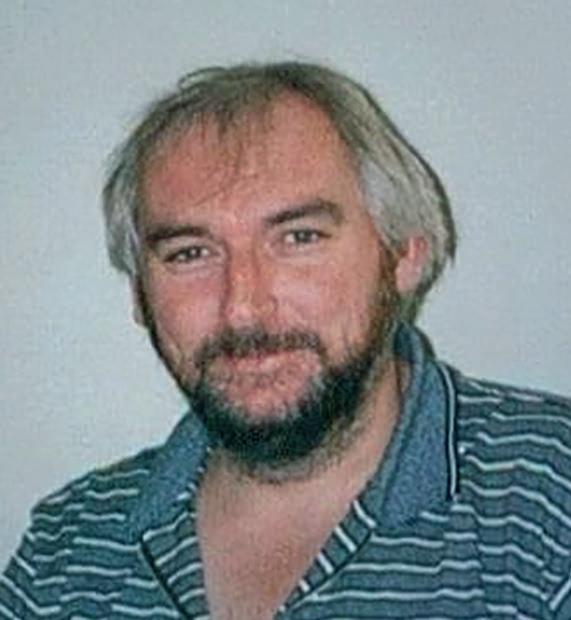
Stephen Craig Smith, affectionately known as The Count was a devoted mariner, beloved son, cherished brother, dearest uncle and adored great uncle. He passed away at the Royal Adelaide Hospital on Tuesday, 18th February 2025, aged 61 years due to an infection exacerbated by his courageous battle with cancer.
Steve’s unwavering optimism inspired all who knew him. Throughout his illness, Steve displayed remarkable strength, refraining from complaints about his diagnosis.
His kindness, intelligence, thoughtfulness and willingness to lend a hand served as a compelling tribute to his exceptional character.
His dark sense of humour always captured your attention to the end & made things more memorable.
Stephen’s nickname, ‘The Count’, was a testament to his enigmatic presence.
His impact will be deeply felt by all who knew him.
Fair winds and calm seas.
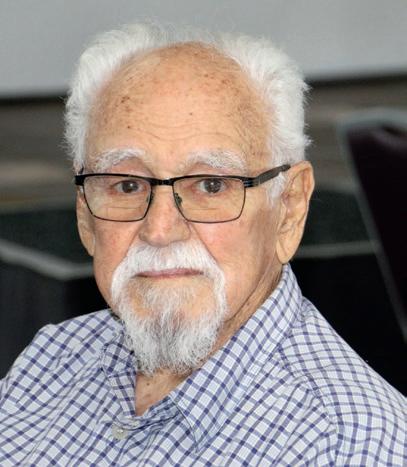
It is with a heavy heart we inform members of the passing of one of our MUA-Newcastle Branch Veterans, John Henry James, affectionately known as “Titch” to his mates and workmates. Titch started work in 1950 as a 19 year old coal trimmer, assisting firemen
aboard steam powered vessels. Some companies would buy bad, dirty coal, and that would make work much harder.
Conditions back then were “ratshit”, according to Titch, depending on what company you were working for. Conditions and food would vary. The water was usually rubbish and towels were so tiny, they wouldn’t fit around your waist.
In an interview many years ago with the MUA Film Unit, Titch described working in the old days alongside many socialists and communists, but noted everybody was a member of the union. Crews would sit around talking politics and Titch was an eager learner in this process from the older seamen.
In his retirement, Titch was a leader and teacher of younger members through his work in the Veterans group in the Newcastle Branch.
Fair winds, Titch.
Glen Williams
MUA Newcastle Branch Secretary
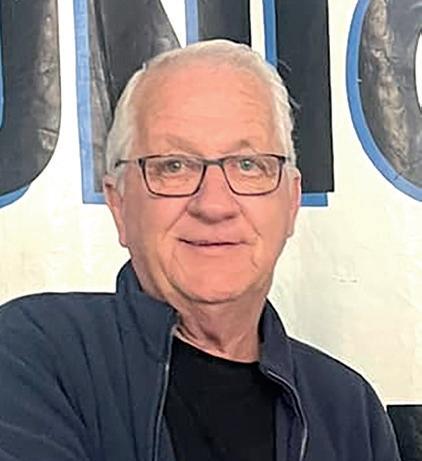
It is with great sadness that the MUA Tasmania Branch shares the news of the passing of our comrade, Ricky McGrail. Ricky first joined the MUA in 1985, proudly serving on the Burnie Wharf with Toll Shipping for decades.
His unwavering commitment to his workmates and the union was formally recognised when he was awarded Life Membership of the MUA in 2022, the same year he retired after 37 years working on the waterfront.
Ricky was deeply respected on the waterfront and will be remembered as a staunch unionist, a loyal friend, and a true gentleman.
We extend our sincere condolences to Ricky’s family, friends, and comrades during this difficult time.
Jason Campbell
MUA Tasmania Branch Secretary
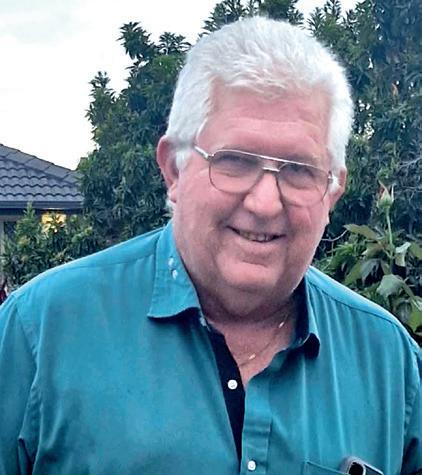
Former QLD Branch Assistant Secretary
Tony Austin lost his battle with cancer, aged 63.
Tony rose through the ranks as DP World delegate in national EA negotiations and was appointed as Assistant Branch Secretary in 2009. After his close defeat in the 2011 election, he remained active in the movement and stayed in contact with many of his MUA mates.
Tony had a great sense of humour and was always ready to offer his time for others. Like so many wharfies, he was a bit of a punter and he felt he had a bit of an edge being born on the horses’ birthday (August 1).
Tony ran for parliament as Labor Candidate for Oodgeroo in 2017 with tremendous support from the Queensland Branch and MUA generally.
Tony wrote this in the 2017 QLD Branch News.
“I wanted to relay to you my heartfelt thanks for the efforts the MUA put in, in an attempt to resurrect the flagging Oodgeroo campaign...From the influx of funds raised at the launch, to the volunteers’ efforts […] our attempt to win the seat for the Palaszczuk Labor team was given a huge boost. Firstly the Campaign launch was attended by MUA officials, IDC representatives and many rank and file members, turning into a hugely successful night. As the night wore on I increasingly felt how much I have missed being a part of your great organisation. A little later I had been engulfed in an overwhelming sense of the friendship and limitless generosity of the MUA members who have never forgotten me. By the end of the night my sense of loss was overwhelming, reinforcing what I knew without a doubt I had been deprived of for so long now: I felt like I was back home.”
Vale Tony Austin.
Adrian Evans
MUA Assistant National Secretary
actions leading up to the 1998 waterfront dispute?
By Geraldine Fela for the ABC
On May 7, 1998, hundreds of wharfies joyously marched back to work on Patrick Stevedores’ docks across the country, one month after their lives had been up-ended.
More than 1,400 workers, who were members of the Maritime Union of Australia (MUA), had been locked out of their workplaces on April 7, 1998, by port operator Patricks, and they’d been fighting to get back to work ever since.
After a legal challenge that went all the way to the High Court, they were back through the gates.
Months of negotiating followed and the final settlement struck between the MUA and Patrick Stevedores was complex. It saw the union agree to drop its case alleging Patricks and the Howard government had conspired to unlawfully sack the workforce.
The then-Coalition government, led by Prime Minister John Howard, has always downplayed its role in the dispute.
But now, new evidence uncovered by ABC Rewind points in the direction of Howard knowing about Patrick Stevedores’ plans to train a workforce offshore, months before it was exposed
in parliament. And while it’s long been suspected, it’s clear the government was more involved than has been previously thought.
Sitting at opposite ends of the political and ideological spectrum, the animosity between the Coalition and the MUA, an industrially militant and socially progressive union, ran deep. And when the Howard government was elected in March 1996, it made no secret of its desire for waterfront reform.
Howard had promised industry that it would take on the MUA, change work practices and “clean up” the wharves, which he described as “notoriously inefficient”.
The government found a kindred spirit in Chris Corrigan, the managing director of Patrick Stevedores. At the time, Patricks’ share price was tanking and Corrigan was desperate to turn things around.
Throughout 1997, Corrigan and the two ministers in charge of waterfront reform, Peter Reith and John Sharp, were in regular contact. They were discussing options for taking on the MUA and replacing union workers with a non-union workforce.
Leaked cabinet documents show that on April 21, 1997, Howard signed off on an “interventionist” strategy for the waterfront. This involved provoking the union into a dispute, and then sacking the workforce.
Yet Howard and his ministers have always insisted their role was to simply provide a friendly legislative environment, and support Corrigan’s business decisions.
“I said to (Corrigan), I admire your determination, but what you do is a matter for your free and commercial judgement. All I ask of you is that anything you do is within the law,” Howard tells ABC Rewind.
On December 3, 1997, during the last sitting week of parliament, opposition leader Kim Beazley and the Shadow Minister for Transport Lindsay Tanner caused a stir in Question Time when they asked Minister Reith what knowledge he had of a “covert operation to recruit a force of industrial mercenaries from the ranks of the military” to be trained in Dubai to strike break on the waterfront?
And what did he know about Fynwest, the company set up to train these “mercenaries”?
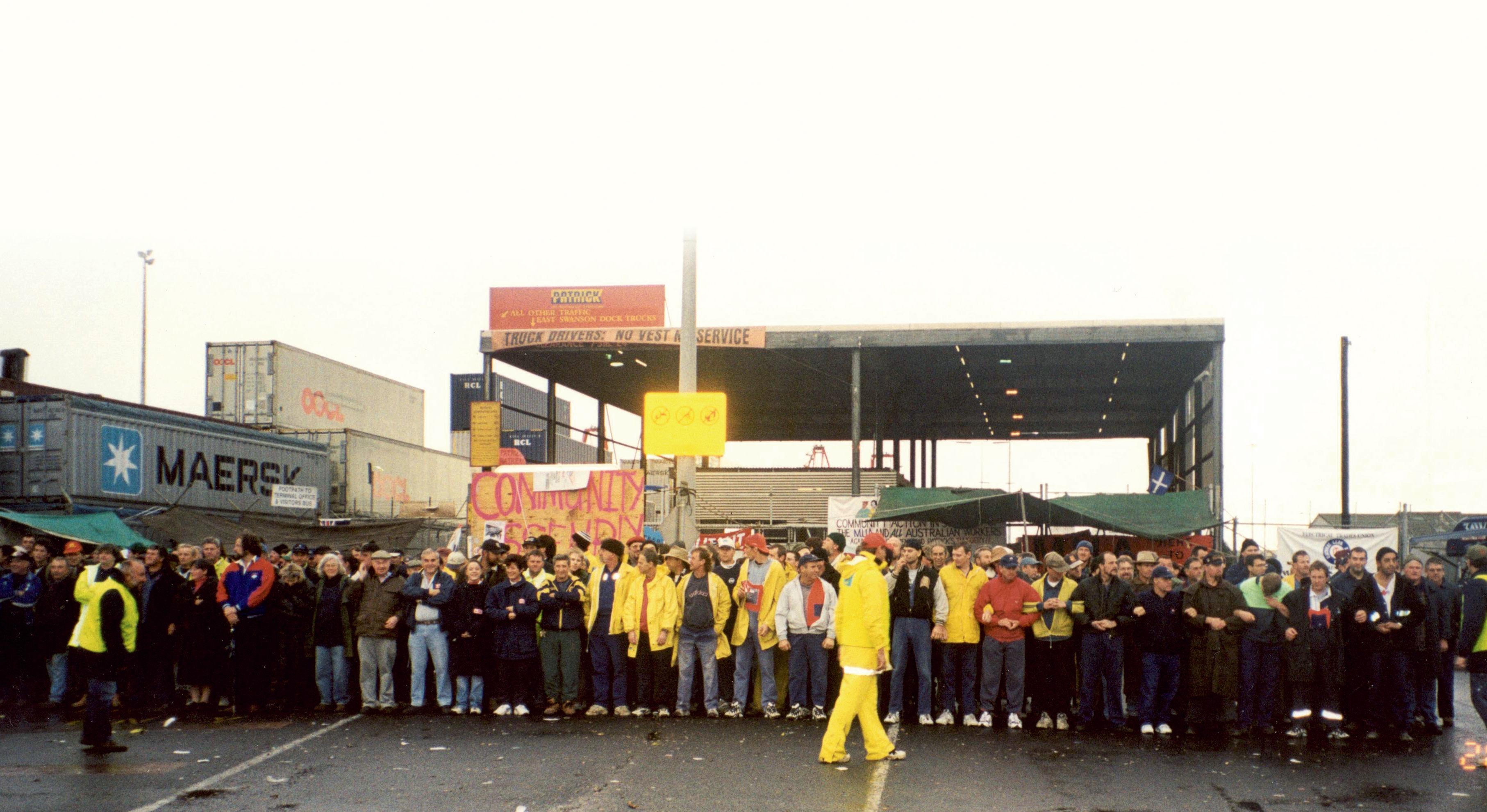


It certainly was news, and the media went into overdrive. The revelation of the Dubai operation had the makings of a major political scandal.
This was partly because of what and who was involved.
Months earlier, former SAS soldiers
Peter Kilfoyle and Mike Wells had been approached to recruit and train a replacement workforce for the docks.
They had distinctive skills: Kilfoyle’s resume included professional training in the use of batons, small arms and electronic surveillance, while Wells’ existing recruiting and consulting business promised security operatives with “first-class weapon handling”.
They set up a small company Container Terminal Management Services (CTMS) and advertised jobs in the Army newspaper, promising an “excellent career opportunity” and a “competitive salary”.
When the union cottoned on to CTMS, Wells and Kilfoyle quickly bought a $20 shelf company. Seventysix current and former Australian Defence Force personnel signed up to this new company, Fynwest Ltd.
Despite denying his involvement for months, it would later become clear that Chris Corrigan was behind the Dubai operation. In May 1998, confidential documents were leaked to the media, including a signed contract between Patrick Stevedores and Wells and Kilfoyle.
These documents also included a signed affidavit from Wells that revealed government consultant and Reith’s waterfront advisor, Stephen Webster, had introduced Wells and Kilfoyle to Corrigan.
Reith always denied Webster’s part in the Dubai affair and maintained that he himself knew nothing about the Dubai training exercise.
“That [Dubai] was already planned. Webster, it was all planned for us. We just carried it out. Webster told us that. You just don’t go over to Dubai and say we’re going to do a bloody training package on your wharves,” Kilfoyle says.
Stephen Webster faded from public view following the dispute and he was not reachable for comment.
“The NFF and Chris Corrigan came forward with this plan to train an alternative workforce in Dubai”
The Dubai operation fell apart when the International Transport Federation, the federation representing transport workers unions around the world, threatened to blockade the port of Dubai if the training continued.
The trainees’ visas were cancelled by the UAE government, and the recruits returned home, left in limbo.
But Mark*, one of the recruits, recalls receiving reassurance that everything would work out. “There was hints that the Commonwealth was behind this. So there shouldn’t be a problem,” he says.
This wasn’t the first time Mark got the impression that the government was involved.
He remembers that, in the lead-up to his departure to Dubai, when he discovered his passport was expired, its renewal happened swiftly after he was given a particular contact’s name.
Journalists have long suspected that both the public and the parliament were misled when the Howard government denied all knowledge of the Dubai scheme.
Journalist Anne Davies, who coauthored the book Waterfront: The Battle that Changed Australia, is “convinced that the government knew everything about this, even though Peter Reith went on the public record in parliament and said he did not know”.
Yet no senior member of cabinet has admitted knowing about the Dubai training exercise before the public found out about it. Until now.
In 1997, John Sharp was the Minister for Transport and Regional Development. He shared the waterfront reform portfolio with Peter Reith, until his resignation on September 24 in the aftermath of the travel rorts scandal.
Sharp describes a meeting in late September 1997, in Reith’s Melbourne
office, where Reith, Sharp and their advisors met with key stakeholders to discuss their plans for waterfront reform.
“The NFF (National Farmers Federation) and Chris Corrigan came forward with this plan to train an alternative workforce in Dubai,” Sharp says.
He remembers details about a private company that had been set up to undertake the employment and training of this alternative workforce.
And he remembers being happy with the outcome of the meeting. “I remember thinking to myself, Chris Corrigan is the man who will do this. Chris Corrigan has got the intestinal fortitude to withstand what will be a very difficult time.”
This is the first time a member of Howard’s government has publicly placed himself and others in the room as details of the training exercise were discussed.
And this meeting happened months before the story broke in parliament.
While the Dubai scheme was clandestine, there was nothing unlawful about Corrigan’s plan to train people offshore to work on the Australian waterfront.
However, what was illegal in 1997, under Reith’s own Workplace Relations Act introduced in 1996, was firing workers because they were union members.
At the time, Federal Court judge Anthony North found there was an arguable case that the MUA members were fired for being union members.
The conspiracy case never went to a full trial, it was dropped after a settlement between the MUA and the company that was finalised in September 1998.
The training of an alternative workforce was central to Corrigan’s
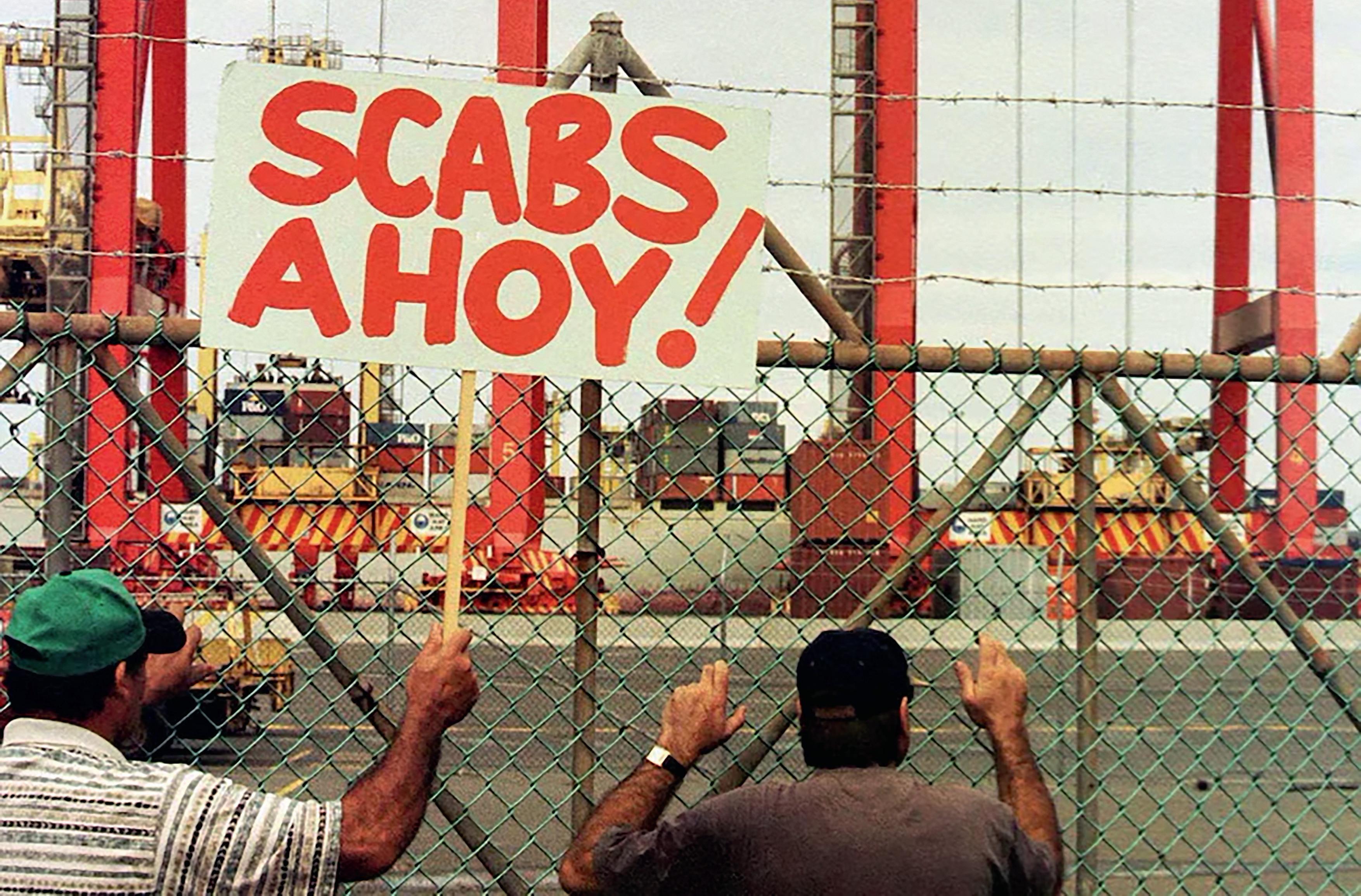
The only reasonable interpretation of this letter is that Howard not only knew about Corrigan’s plan to train a non-union workforce overseas but was being asked to give the go-ahead.
plan to replace his MUA workforce on the waterfront.
This is why Dubai matters, and why who knew what about Dubai matters even more.
It opens up questions around the level of collaboration between the Howard government and Corrigan in the plan to fire 1,400 union wharfies across the country.
Prime Minister John Howard has always denied knowledge of Corrigan’s plan to train Australians offshore.
But ABC Rewind has found correspondence files in the National Archives of Australia from Howard’s chief of staff Arthur Sinodinos to the Prime Minister that show otherwise.
In the letter dated September 22, 1997, Sinodinos explains that ministers Reith and Sharp had spoken to a “major stevedore” who was heading to Europe on October 1, 1997.
Separate correspondence between

Sharp and Webster shows that the stevedore with a European trip booked for that date was Chris Corrigan.
Sinodinos noted that the stevedore wanted to meet with Howard.
The only reasonable interpretation of this letter is that Howard not only knew about Corrigan’s plan to train a non-union workforce overseas but was being asked to give the go-ahead.
In her Australian Financial Review series War on the Docks, journalist Pamela Williams cited documents that showed Howard “at the apex of a chain of command on the federal government’s docks strategy”.
It was Howard who gave the final sign off on the 1997 interventionist strategy, and now the Sinodinos letter points to Corrigan also looking to him for a lead before he set his offshore training plan in motion.
Howard was asked by ABC Rewind for comment about this correspondence, but he declined a further interview.
He declined to answer any further questions regarding his knowledge of offshore training, or whether Corrigan sought direction from him on a plan to train a workforce offshore.
Twenty-seven years later, the waterfront dispute remains the most significant industrial dispute in Australia in living memory.
How much the Howard government knew and its level of involvement in the cascade of actions and decisions that led to the lockout of 1,400 Patricks workers in April 1998 are all questions still to be fully answered.
*Names have been changed
Dr Geraldine Fela is a Postdoctoral Research Fellow in the School of Humanities at Macquarie University. She was a producer and the series historian with ABC Rewind’s Conspiracy? War on the Waterfront.
This article has been reproduced with permission from the ABC. •
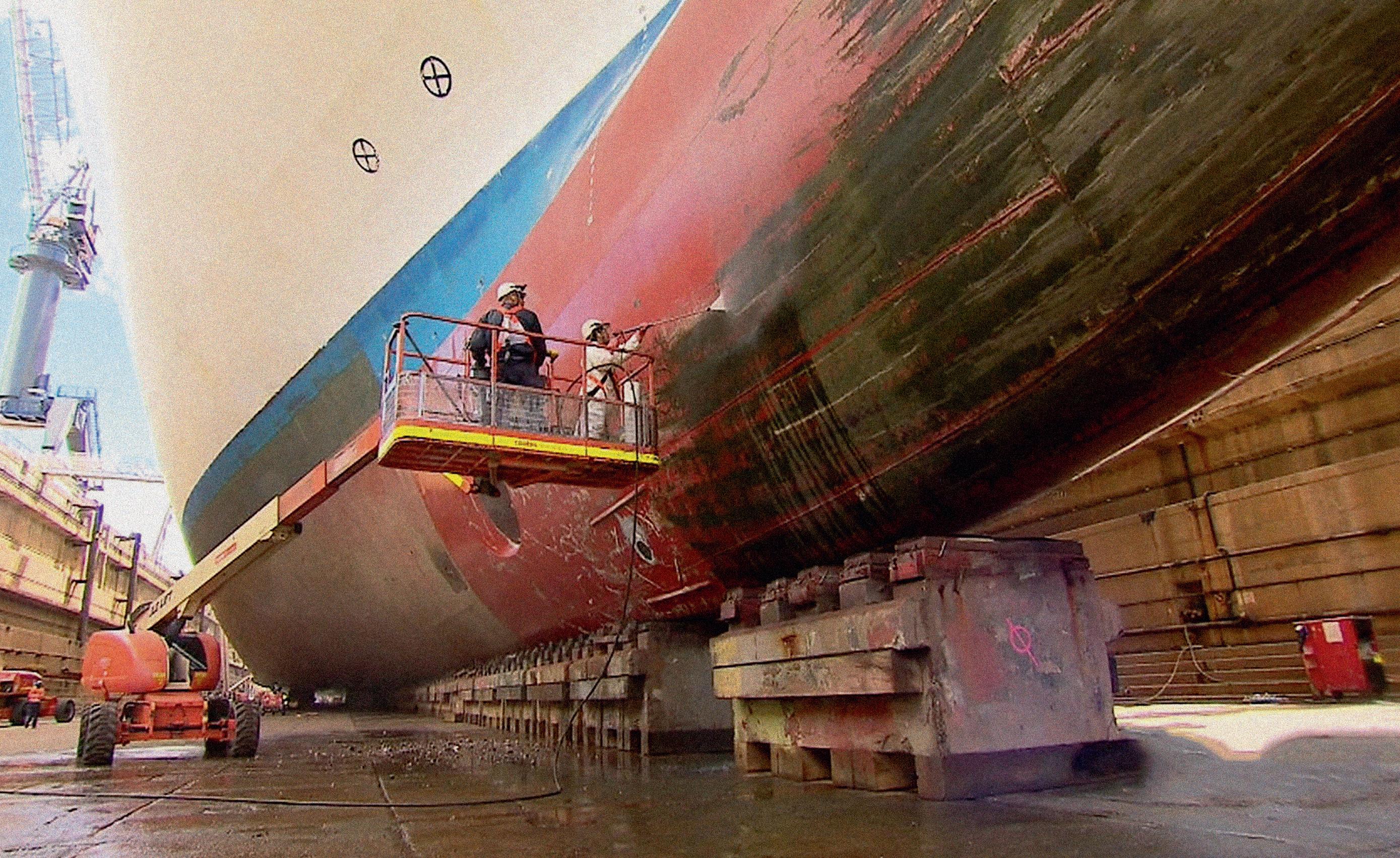
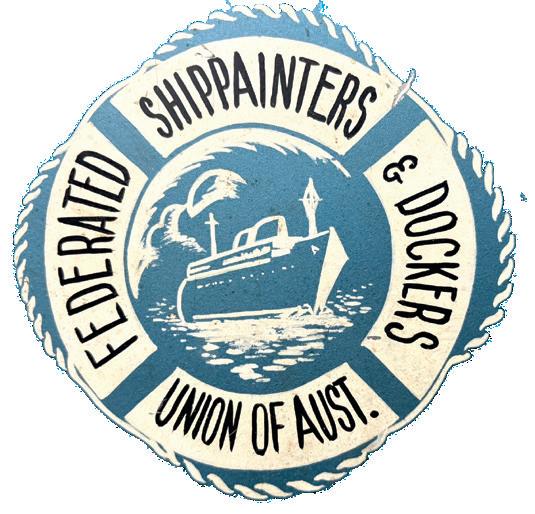
they’re (mostly) Filipinos, and they’re killing it
This op-ed originally appeared in the Overland magazine by Shane Reside, MUA Sydney Branch Organiser
Late in 2024, the Painters and Dockers working on Garden Island in Sydney won their first ever Collective Agreement, one of three Collective Agreements won by Painters and Dockers in Australia last year. The culmination of a yearlong struggle, the agreement nailed down a raft of conditions including a thumping 10.5 per cent pay increase across the board, as well as Domestic Violence Solidarity Leave.
Most significantly, however, the workers won what could be an Australian-first in migrant workingclass struggle. Their employer has been forced to concede that they will only bring in workers on visas that have a pathway to permanent residence and will pay all of the costs for visa applications. Further, their new agreement means that their employer must sponsor them for permanent residence as soon as they become eligible. They cannot pick favourites. They cannot refuse.
For this group of workers — and for the growing ranks of temporary migrant workers in Australia — this last win is a big deal.
The Painters and Dockers are one of the most (in)famous workingclass organisations in Australian history. Founded in the then gritty Sydney-waterfront suburb of Balmain, the P&Ds did the hardest, filthiest labouring work in the Australian ship building industry for almost 100 years. They were famous for a lot of things — the waterfront has never been a bastion of bourgeois manners — but mostly they’re remembered among the working class for their tough, unbreakable solidarity.
Ship repair is hard, unforgiving work. Marty Maribito, an old P&D (now a linesman), loves telling the story of how in the late 1980s, P&Ds had to clean out torpedo-launching tubes. “You had to climb right bloody in there and squeeze the whole way through!”
The P&Ds were men drawn from tough working-class suburbs. Men from families who owned nothing and had nothing to exchange but their sweat. Through rigorous discipline, they maintained a formidable collective organisation under constant pressure from some of the most powerful capital interests in the country, and their mates in government.
The union forced ultra-wealthy
ship owners to pay union wages — of course — but the real significance of their contribution lies in their refusal to be treated as disposable commodities in the vast global economy of shipbuilding. Through organisation and grit, they built for themselves the power to live with dignity.
As the union faced a storm of hysterical squealing by polite society, the automation and collapse of Australian ship building, and a remaining membership of less than one thousand, the Federal ALP made their move. The P&Ds were deregistered in 1993.
Stripped of union representation, by 2024 their pay and conditions had collapsed. Still performing hot, intense physical labour, Sydney’s P&Ds were earning about $23 an hour – minimum wage. By contrast, linesmen like Marty who had remained organised and represented by the MUA over the same period, were earning $45.
The Garden Island dry dock on Sydney Harbour is the biggest in the Southern Hemisphere. Ships are floated into the dock before workers then close the gates and pump out the water, leaving the massive hulls exposed and accessible for P&Ds to climb in and perform the necessary repair and
maintenance work. When there is a surge of work, there can be up to 200 P&Ds working at Garden Island alone.
While the Spirit of Tasmania, the Manly Ferries and the NZ InterIslanders all get work done in Sydney, the bulk of the large ship repairs done in Australia are military. Some of the world’s biggest, most profitable companies have secured government contracts worth hundreds of millions to do the hard work of keeping the Australian Navy afloat.
Wearing cloying protective overalls and suffocating safety equipment, workers enter the dock to sandblast the immense steel panels clean of old paint and rust, and then re-spray with layers of heavy industrial paints. It’s not easy work. Not unlike in many types of employment at the bottom of the Australian economy (care work, agricultural labour etc) the deterioration of pay and conditions had reached a point where bosses struggled to attract and maintain a workforce that is adequately skilled and prepared to do it.
While there is a small number of locals working in the dry dock, wily contractors have discovered that there is a tidily profitable little niche in finding workers to feed into the contract-mills of these ravenous multi-national billion-dollar military behemoths. Using “skilled worker shortage” visa schemes, these
“As unionists, we are never alone. We stand together, and if we have to we fucken fight together too!”
DARREN DUCKWORTH
contractors have built labour supply chains that pick up experienced, capable P&Ds from the vast heaving cities of the Global South (mostly the Philippines) and deliver them to the ship repair yards of Australia, spray gun in hand.
The blinding reality of extreme, increasing global inequality means that, despite the shitty pay, hard work and distance from home, there are many, many people for whom this represents a very good opportunity.
On a warm February evening on Sussex St, the MUA organised an event to celebration the spectacular win brought down by the P&Ds on Sydney Harbour. As well as inviting all of the new members into the Union rooms for the obligatory pizza and beers, a handful of ex-P&Ds from back in the day came down to pass the baton. At the event, three new P&Ds were discussing with some of the old hands their last stints before landing the job
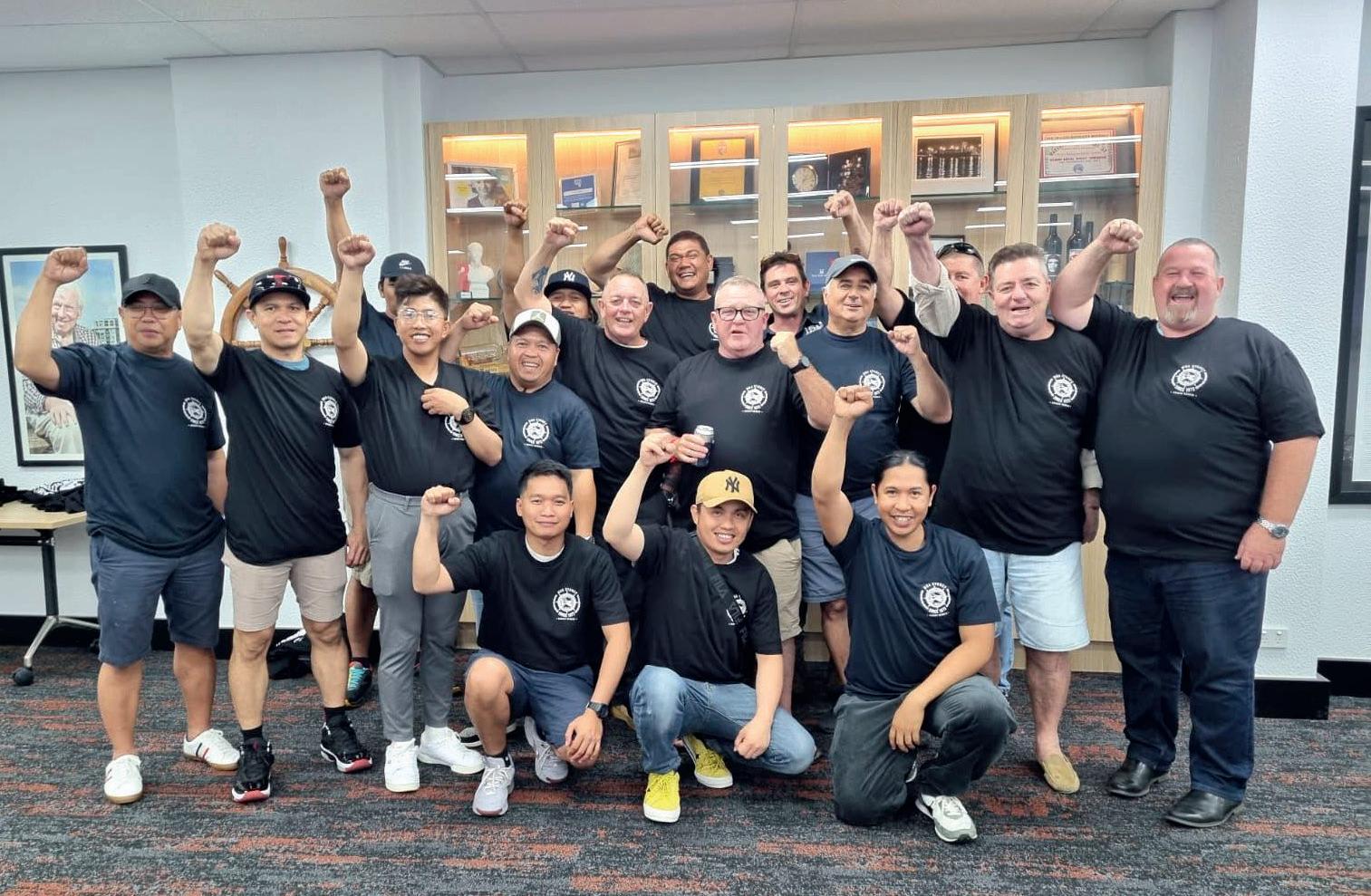
in Australia. One young bloke had last been in Japan, working for less than $10 an hour. Another two in the Gulf States on less than $5.
The contractors rent whole apartment buildings in Western Sydney to house their migrant workforce in shared flats, with the company logos emblazoned across the front doors. Most of the newly arrived workers don’t have a life outside of the dry dock: no family obligations, no footy club events, no time off for old school re-unions. This makes them mobile, available at the drop of a hat to work a Saturday shutdown, or relocate to Darwin for a two-week stint with only a few days’ notice.
Living in company housing, with working visas contingent on bosses’ benevolence, the P&Ds were too scared of retribution to talk openly in the workplace, so it was in these Western Sydney apartments that they decided to get organised. Over foil trays of food and Jim Beam drank out of plastic cups, MUA officials stuck butchers’ paper to the walls of the apartments and drew diagrams explaining the Australian industrial relations system. With translation done by comrades from Filipino community organisations, they made charts showing the gap between wages in organised maritime workplaces and the P&D shipyards. To determined grins and nervous laughter, they outlined how to take strike action without getting sacked.
The handful of tough old waterfront workers still in the dock implored their new comrades to be courageous and have a crack. The group that had been around for a while and already secured permanent residence spoke with confidence that the union officials were legit and could be trusted.
Together as a group, the workers joined the Union and pulled the trigger on negotiations.
The company wasn’t stoked, but nor was it caught entirely by surprise. This particular contractor had already faced a revolt from its workforce on the waterfront in Adelaide and Fremantle. If there is one thing bosses worldwide know for certain is that once word starts spreading that the
union is on the march, it’s very, very hard to plug it.
What followed was a beautiful demonstration of trust and courage in motion. Every time the managers threw a crumb at the workers, the delegates looked to the MUA officials. Every time, the officials said no. Hold the line, not enough.
Pressure built and tensions started to spill. The Sydney workers were taking the gains already made by their comrades in the other states and pushing forward for more. Managers were getting frustrated and letting it show.
Union officials went to the sprawling canteen at the dry dock, spent twenty minutes throwing the manager out so the meeting could take place in private, and then put it on the crew: the delegates had moved the company as far as they could with words alone at the negotiating table. The company was moving on wages, albeit not far enough. Far more importantly, it would not budge on visas and the right to sponsorship. Without this, the workers would be left standing on quicksand. Sure, you could “exercise your entitlements under the agreement,” but without guaranteed PR sponsorship, there is only so much exercising of entitlements anyone is going to do before you’re exercising yourself into in an economy aisle seat back to Dubai and $3/hr.
The workers at the dry dock either had to cop what was being thrown at them or vote for strike action. It would be insincere to claim that this wasn’t a pivotal moment in the campaign. Compared to the very real and present alternative, this gig was bloody good. Bar a few old hands, most of these workers had only joined the MUA six months prior.
The vote was called, the hands went up. Strike action it was.
As it turns out, the Garden Island P&Ds never had to walk off the job. The Construction Division of the CFMEU was organising this same contractor’s workers on a construction job elsewhere in the city. The MUA officials called their
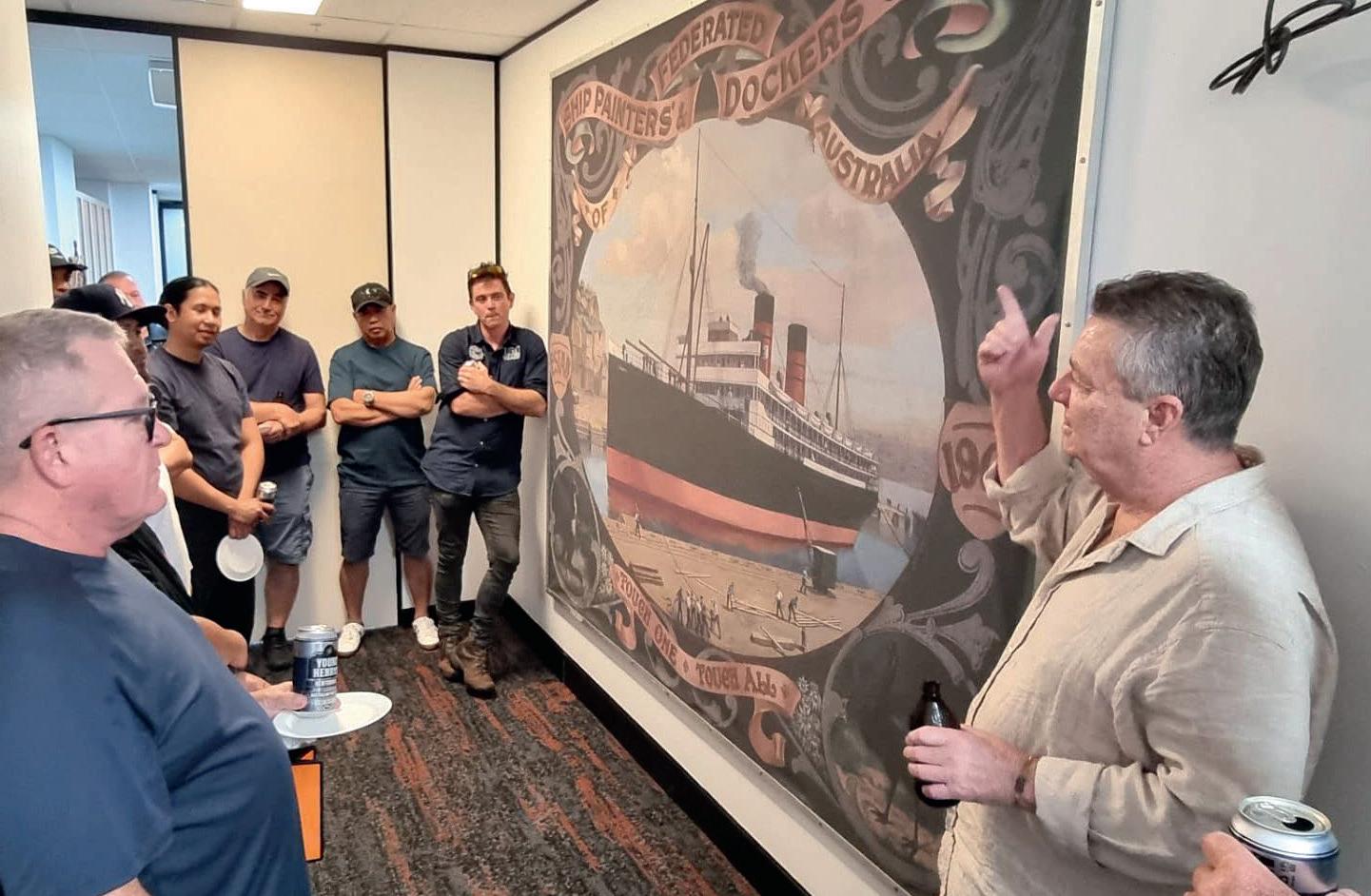
comrades at Construction and explained what was at stake.
The CFMEU made it clear to the contractor that the P&Ds had the unwavering, complete solidarity of the Construction union, and that the days were over where the contractor could — without a fight — hold out job security and the right to PR sponsorship as a honey-pot for the compliant.
Sensing that with the support of these mad, militant union leaders their workforce might just be audacious enough to seriously take them on, the scale of the fight was heading in the completely wrong direction for the company. They folded.
This new generation of P&Ds are just a little corner of the swelling ranks of the migrant working class in Australia. Walk down any street on Australia’s East Coast and it’s immediately clear the strategy being deployed by the powerful to deal with repressed wages and labour supply at the bottom of the economy: leverage global inequality and weaponise migration pathways.
There are significant sections of this class of people prepared to join unions and prepared to have a crack. In just one of the little-known aspects of the work of the CFMEU, right across the construction industry there are thousands who have joined their union prepared to fight and claw back some dignity from the vast and wildly
profitable machinery of property development.
Incredible, tenacious, granular organising in the agricultural industry has built a union of farm labourers that have put an ultimatum to the obscenely wealthy stratosphere of Australian capital that sit at the top of our broken food production system: give us the space to live honest, dignified lives, or you can “pick your own fucken’ fruit.”
On that warm February evening on Sussex St, Darren “Ducka” Duckworth stood in front of a huge painting at the Sydney headquarters of the Maritime Union of Australia. He was at the event celebrating the new P&D agreement freshly minted in Sydney. He pointed out the slogan beautifully painted along the bottom of the canvas to a group of Filipino labourers, stubbies in hand, leaning in to try and understand him through his thick seamen’s turn of phrase: “touch one, touch all.”
Ducka, a former P&D himself, said the slogan captures what the Painters and Dockers were all about. “The P&Ds always knew that they had to back one another to defend themselves from the bosses. That’s what this means. As Unionists we are never alone. We stand together, and if we have to, we fucken’ fight together, too. That’s why we are so proud to have you all as part of our Union — cos youse’ have shown that’s what youse’ live by, too,” he said. •

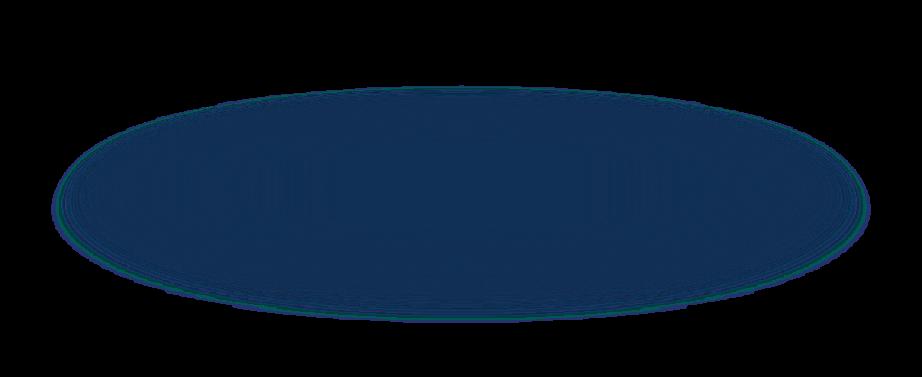
We’re proud to have won Canstar’s Outstanding Value Super Award for the eighth year in a row. The award recognises our strong long-term performance, competitive fees and an array of product features. So it’s not just a win for us, but a win for our members.
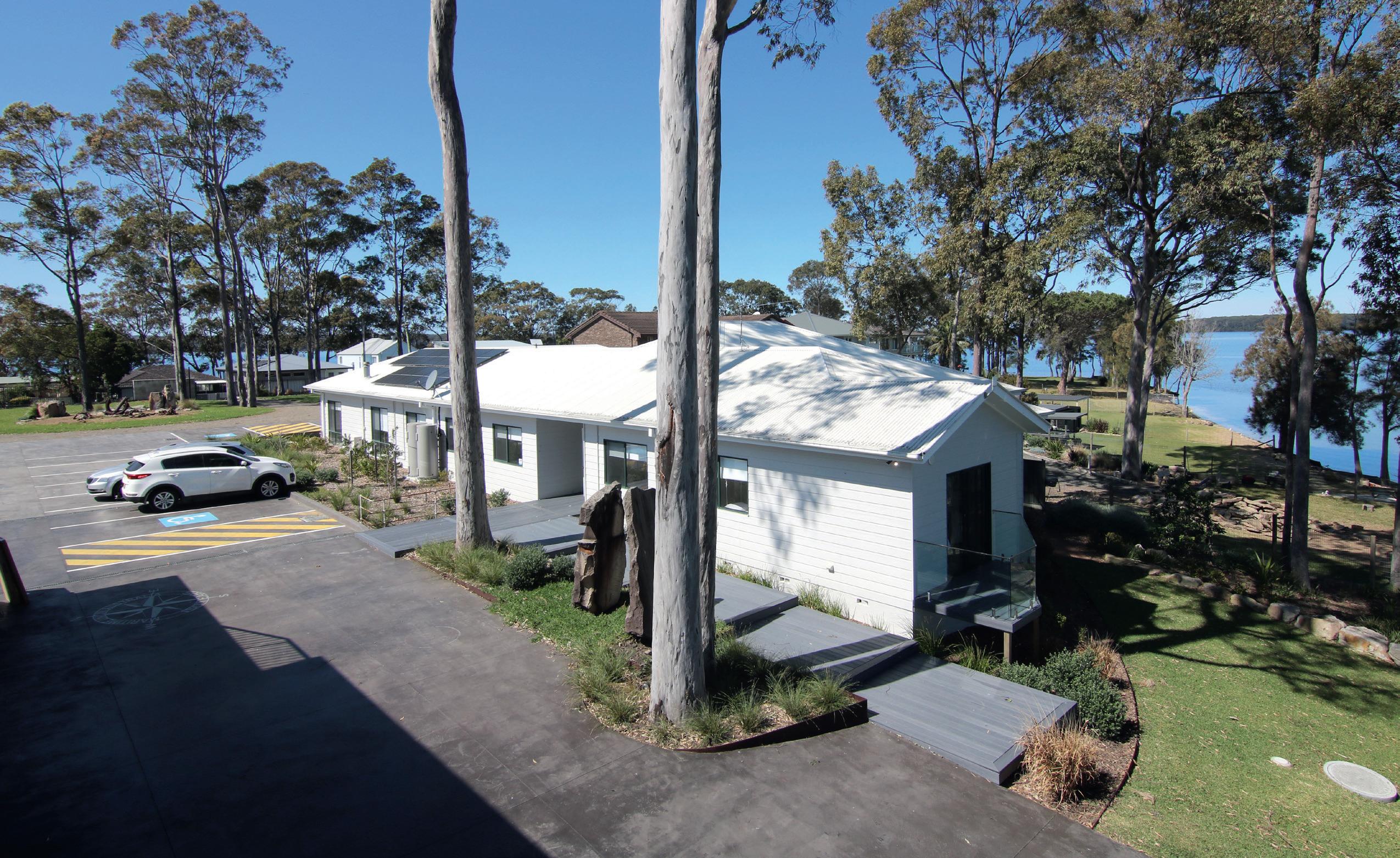
Members of the MUA, local community, families and international visitors came together at St Georges Basin in February to re-open the MUA Training School & Conference Centre.
This facility was first built by the Seamen’s Union in the mid 1980s, and like the MUA itself, through amalgamation, consolidation and continuous development, has been expanded and improved upon throughout its history.
After a touching and powerful Welcome to Country by Wandra Wandian cultural educator Michael Robinson, the school was officially reopened by MUA National Secretary and ITF President, Paddy Crumlin, alongside NSW Senator Tony Sheldon –himself a long time friend and comrade of the MUA and all transport workers.
The original house belonged to Ray and Joyce Clark, well known socialists and activists in the Australian and international trade union and progressive movement over many decades.
Ray was Secretary of the Wool and Basil Workers Union and Joyce was headmistress at Kogarah Girls High School. Both belonged to the Communist Party of Australia and subsequently the Socialist Party of Australia.
Consistent with their values and
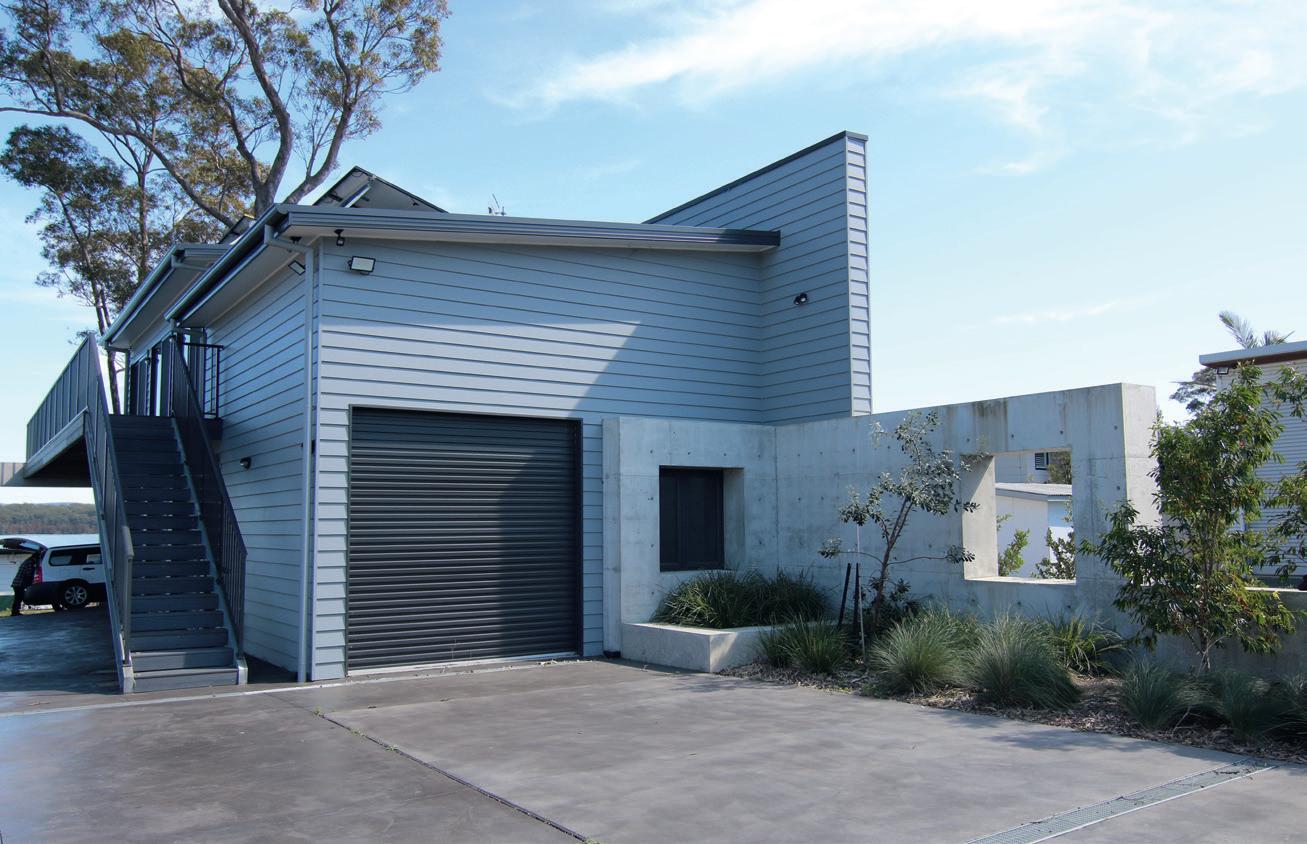
enormous contribution, in the early 1980s they sold what was their modest holiday house to the Union for a small amount of money as they wanted to contribute to the establishment of a trade union school that would educate maritime workers in their political and industrial work through a knowledge of the long history of the Union and the movement. The emphasis would be on the development of leadership and an understanding of the working class and the great struggles working women and men face.
The first school was developed largely through volunteer work by the members of the Union and their families while on leave from ships and from
their waterfront work. Many ships and maritime workplaces made financial contributions including the donation of furniture and equipment. Bill Parker was a retired and well known Port Kembla seafarer and he and his wife Marge were the first caretakers.
The attendance book from the official opening of the school on 7 April 1986 and the attendance of subsequent delegates training courses is still in the school library – named after Geoff Swain, a young seafarer and trade union leader who was tragically lost at sea. His father Geoff was the long-standing Secretary of the WWF in Victoria.
Subsequently, the school became too small for the needs of the membership
due to its popularity and the merger with the Waterside Workers Federation into the Maritime Union of Australia. The Union, including through the funding support of the ITF, further developed the school infrastructure as one of its first amalgamated decisions.
The rebuilt school was on the foundations of the Clarks’ original home to ensure maximum use of the block but also in respect to its history. The property along the northern boundary of the original plot of land was later purchased by the Union and further development and refurbishment was undertaken including the development of a Fast Rescue Boat course.
Engineers from Jubilee Engineering, a subsidiary of Australian ship owner Howard Smith, designed and graded a slipway. The course however was discontinued a number of years later and the vessel was donated to the Maritime College in Tasmania.
Over the history of the school, many Union members, their ships, vessels and workplaces, assisted in the maintenance and upkeep of the facilities. Schools of seafarers, wharfies and port workers from all parts of Australia and internationally continued the history of joint delegate training based on building a strong, united and effective maritime union consistent with the Union’s long history.
The Port Kembla Branch and subsequently Southern NSW Branch was integral to the caretaking and maintenance of the school, including by supervising numerous working bees from time to time. However, the school declined in participation and the cost of maintenance grew due to the age of the existing buildings.
At the MUA’s Quadrennial National Conference in 2020, members determined that the Union should raise funds to redevelop and renovate the school and revitalise the training agenda it served for members of the Union. This renovation and expansion of the school in the years since the 2020 Conference was made possible with funding from the ITF Flag of Convenience campaign together with Maritime Employees Training Limited (METL).
It was negotiated for through the international bargaining forum
agreements ensuring training support funds be set aside for the training of Australian seafarers and maritime workers.
The school now provides an opportunity for industrial and union training, maritime competencies, social support for seafarers and their families through Hunterlink, and to meet other relevant training needs. It remains an integral part of the Union’s training strategy.
The new, professional and highstandard classrooms and teaching technology, greatly improved accommodation, and high quality landscaping blends well with the historical reminders of 150 years of the MUA’s history that are present on site.
These reminders include the original ship’s wheel which once adorned the entrance to the Seamen’s Union office on the corner of Liverpool and Sussex Streets in Sydney, parts of the old timber wharves from Port Kembla, the anchor salvaged from Associated Steamships Pty Ltd (ASP) along with anchor cable from various New South Wales ports, the railing from the historic Sydney Pilot Cutter Captain Cook which was donated by the Crumlin family along with many other artefacts and memorabilia now housed in the school’s library and training rooms.
The sandstone sculpture ‘Push’ by respected Sydney artist Gary Deirmendjian highlights the dynamic and often opposing industrial and political forces on the Australian waterfront and the breakthrough leadership of the Maritime Union of Australia.
All of the collected artworks and artefacts now housed at the school celebrate the vision and legacy of the Union’s and maritime workers’ long history of achievements in Australia and internationally. It is an important punctuation of that 150 year history.
The first sessions held in the days after the official reopening was an ITF Women’s Conference bringing together women transport workers from across the globe to share ideas, strategies and plans for strengthening their collective muscle in our workplaces within a globally interconnected industry. •
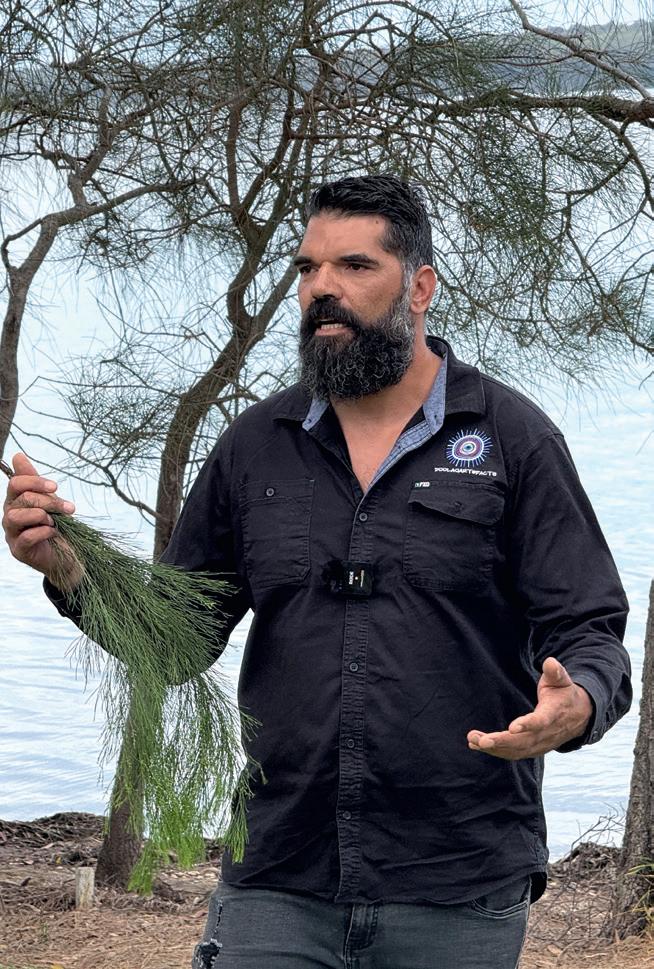
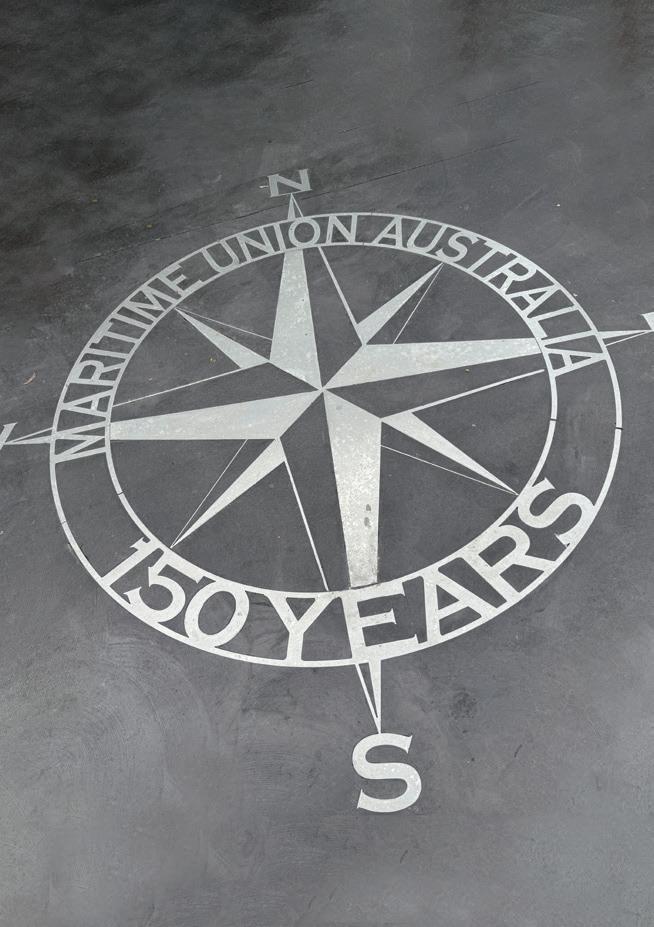
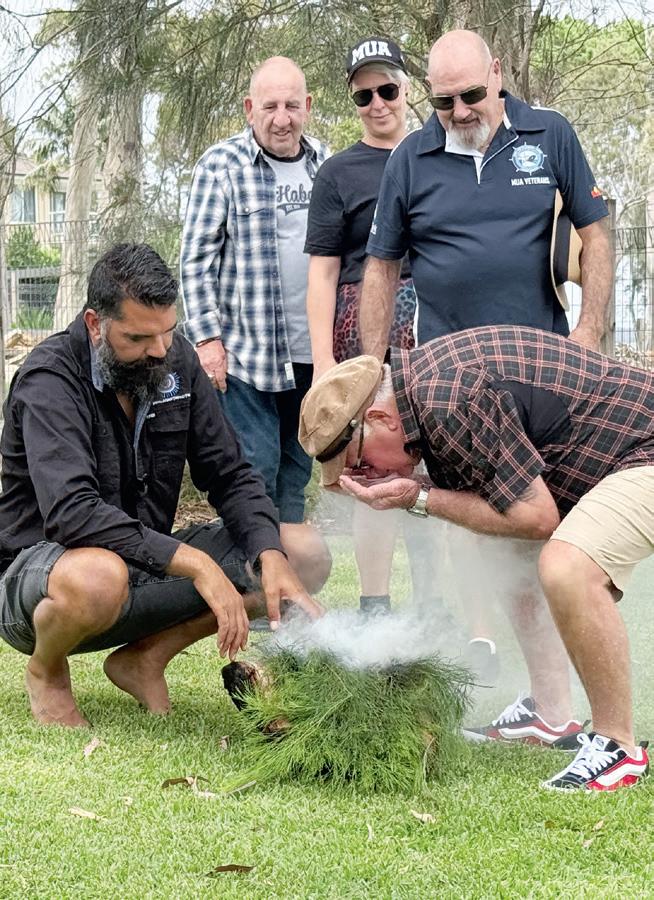
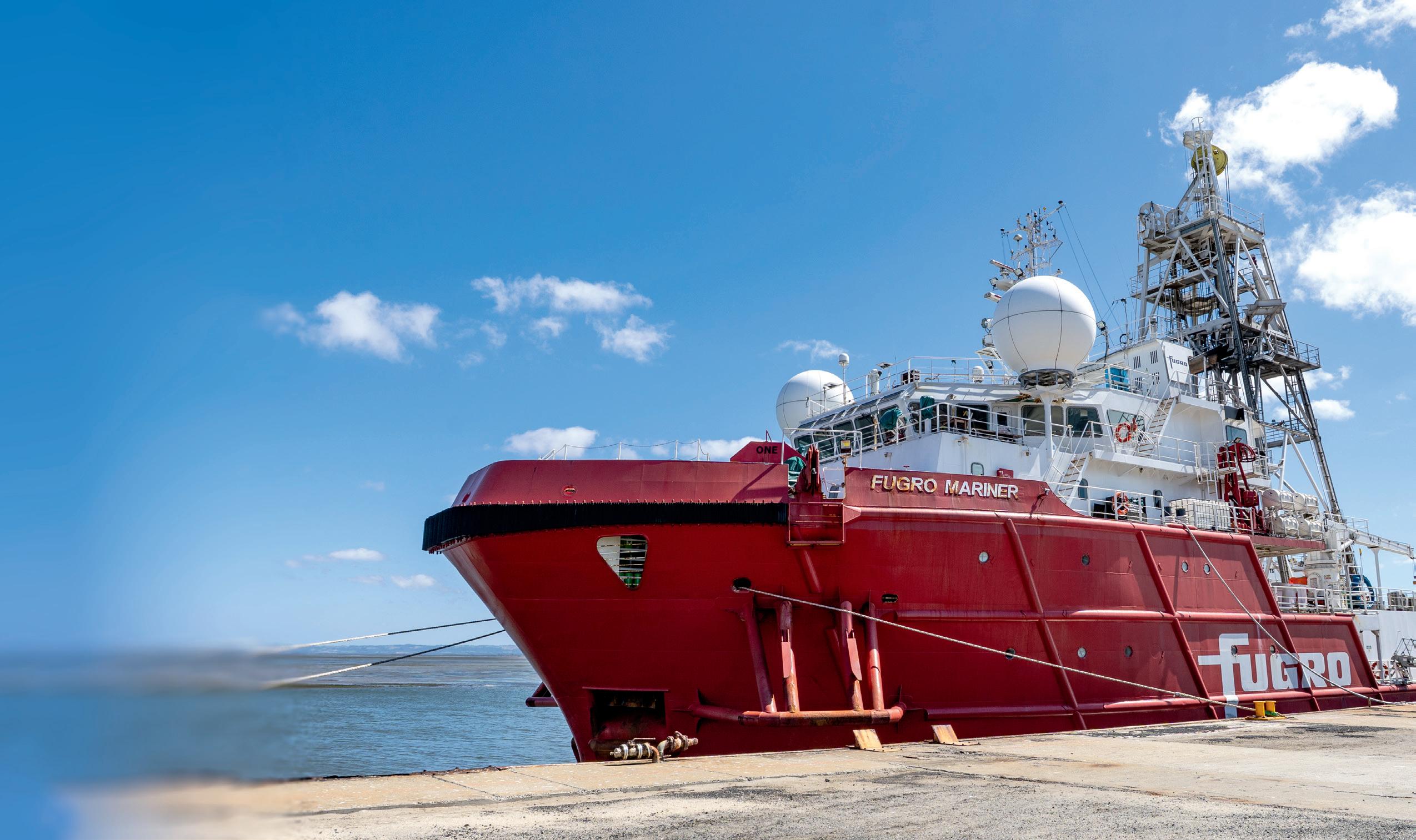
MUA seafarers were employed on the Fugro Mariner this year undertaking geotechnical work from March 2025 for the installation of offshore wind turbines to replace the ageing oil and gas infrastructure that’s reaching its end of life.
Seafarers will be employed under the standard MUA / AOS offshore agreement.
The foreign flagged ship, operated by specialist geo-tech company Fugro, has been awarded the contract for offshore soil investigation services for the proposed Blue Mackerel offshore wind farm in Australia. When complete, it will become one of Australia’s first operational offshore wind energy projects.
With a projected capacity of 1 GW by 2032, the wind farm aims to generate renewable energy sufficient to power over 500,000 Victorian homes, significantly contributing to Australia’s target to achieve net zero emissions by 2050 .
This swing follows Fugro’s successful completion of the geotechnical site investigation of the Star of the South offshore wind project, also in the Gippsland region of Victoria, for a separate offshore
wind developer. The vessel will leave Australia at the conclusion of the works but may return for other future geotechnical work as needs arise.
Riley Chapman-Politis, from the Southern NSW Branch, travelled to Barrys Beach in Victoria to join the crew for the second Gippsland project.
“We’re proud to be doing this work, and proud of the fact that the ship was a unionised crew. This is an overseas flagged, specialist vessel, operating in Australian waters in our offshore industry, so it’s crucial that while it’s here it’s an MUA workplace with strong safety standards, good pay and a respectful workplace,” Mr Chapman-Politis said.
Offshore wind is a new opportunity for hundreds of our members who’ve honed their skills in the offshore oil and gas sector over many years. The burgeoning industry will, during the preparation, construction and maintenance phases of its development, keep MUA members and their families employed for generations to come.
MUA member Hamish Paterson, from the Queensland Branch, also joined the crew and was excited to be working on renewable energy
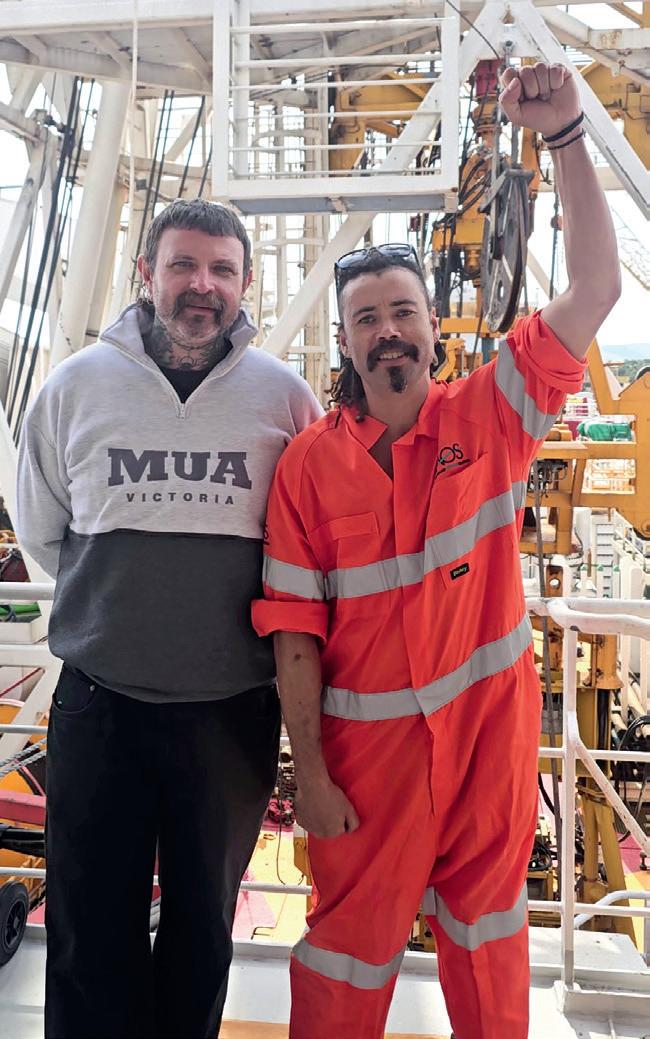
We’re proud to be doing this work, and proud of the fact that the ship was a unionised crew.
projects in the Australian offshore sector.
“It’s a great advancement in potential future work for Australian seafarers. It will provide good employment for the current workforce but also offers future generations a long-term basis in our industry,” Paterson told MWJ. •
All crews of all 3 unions unite in the quest for a fair deal.
The Maritime Union of Australia (MUA)’s National Teekay bargaining representative, Mich-Elle Myers says MUA members employed by Teekay Shipping have voted in favour of protected industrial action, with an extraordinary 98% ballot outcome in favour of taking action. Two hours after the ballot results, we put the first action on: Bans on attending meetings with shore-based management without a union-official present
The MUA negotiating team, MichElle Myers, Paul Garrett, Jeff Cassar and Tenneil McMaster have all played a significant role in the negotiating, however after 6 meetings and two substandard offers we are ready to take action to move this along.
Teekay Shipping is a major international shipping and marine services company, specialising in the transport of crude oil, liquefied natural gas (LNG), refined petroleum products, and offshore support. Operating a diverse fleet of ships in Australian waters, Teekay provides maritime logistics to international energy producers, refiners, and importers as well as the Australian Government.
In a highly profitable and lucrative commercial environment for Teekay’s shareholders, the workforce has long been raising legitimate concerns about their pay and conditions being inconsistent with other operators in the Australian maritime sector, especially once the highly specialised skillsets and work of Teekay’s crews are factored into the equation.
Despite repeated union efforts, company negotiators have consistently refused to engage in meaningful
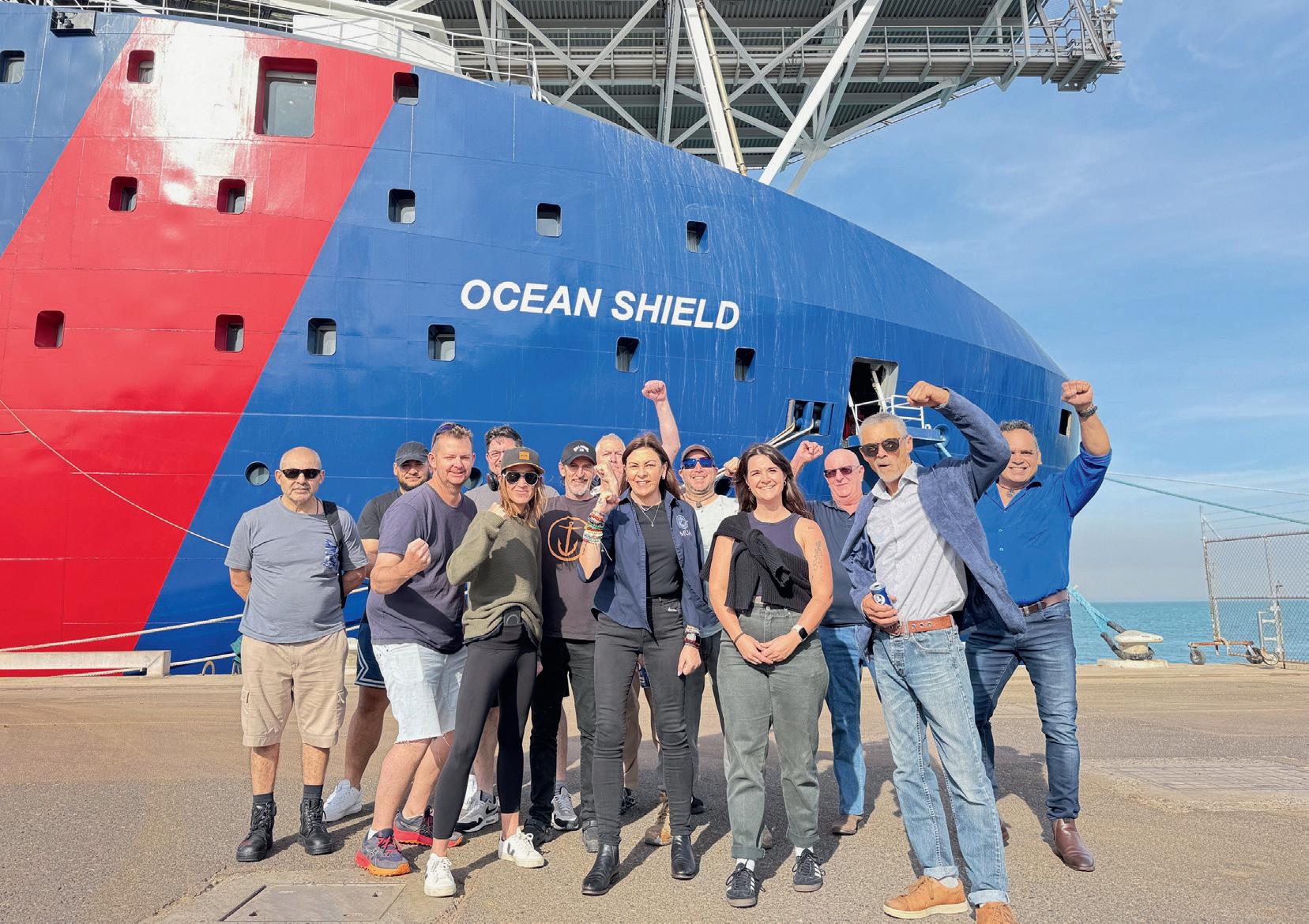
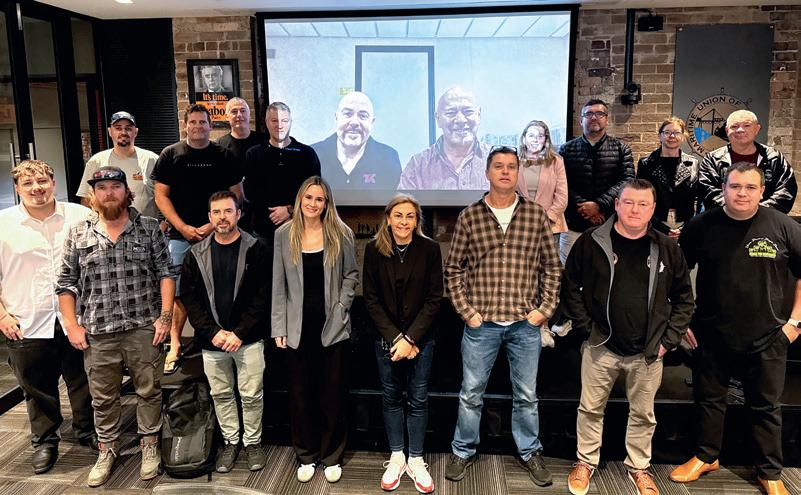
dialogue on pay increases or improvements to critical employment conditions.
Members have made clear: without serious progress at the negotiation table, taking protected industrial action is their only recourse to secure a fair and consistently applied wage deal.
Forms of action covered by the ballot:
• Unlimited one hour stoppages
• Unlimited four hour stoppages
• Unlimited 24 hour stoppages
• Unlimited 7 day stoppages
• Unlimited 28 day stoppages
• Bans on working more than 8 hours within a 24 hour period
• Bans on maintenance and cleaning
• Bans on crane operations
• Bans on the preparation of hot meals aboard Teekay ships
• Bans on washing, cleaning and laundry services
• Bans on boat operations and personnel transfers (eg: small vessels, tenders, transports etc)
• Bans on training employees and contractors
• Bans on attending meetings with shore-based management without a
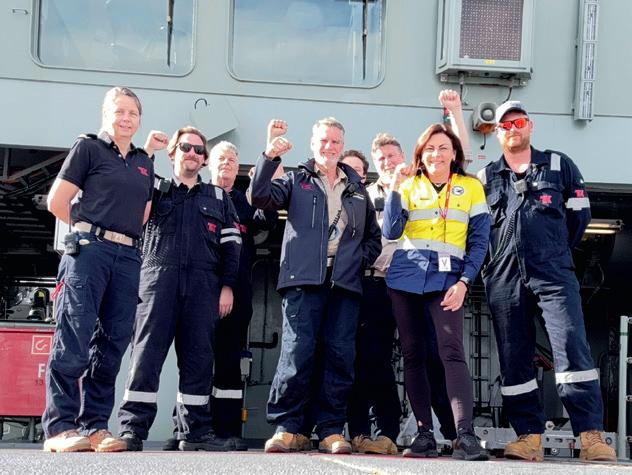
union-official present
• Bans on certain shipboard operations and activities without 96 hours written notice by management
Call to Negotiate
“We have lined up all the various ship-by-ship agreements to a common expiry date so that we can work towards a consistent, sensible and fair fleetwide agreement for the various crews, but Teekay are refusing to include Ocean Shield or the Mercator in the agreement. When we say we want a fleetwide agreement, we mean it. We cannot have a situation where crews move from one job or vessel to another with wild variations in their conditions of employment”, said Mich-Elle Myers, the MUA’s National Assistant Secretary.
“The MUA calls on Teekay Shipping management to return to the negotiating table without delay, with a genuine commitment to resolving disputed issues. Our members remain ready and willing to achieve a fair and sustainable agreement that ensures safety, fairness, and operational continuity. Until that occurs, they will remain steadfast in asserting their rights,” said Ms Myers. •
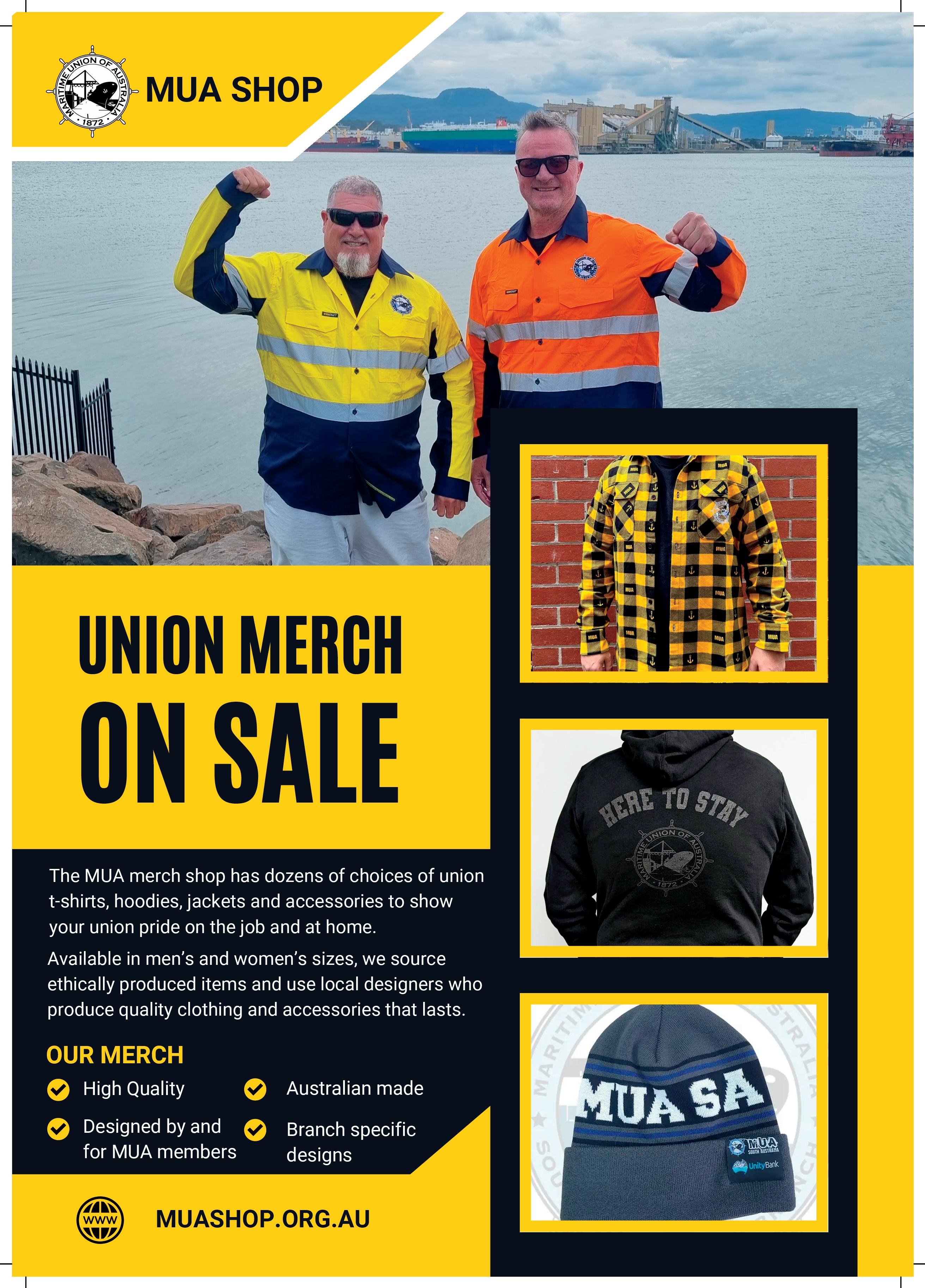

From crisis to crossroads, Australia’s offshore oil & gas clean-up is becoming a national fight. We’ve won new rules, jobs, and recognition since the Northern Endeavour fiasco landed it in the Commonwealth’s lap – but without real infrastructure and enforcement, the job isn’t done. Maritime workers are stepping up to finish the fight.
Mariti M e Workers at the Frontline o F Deco MM issioning Australia has arrived at a pivotal moment. We have made important progress: stronger laws, a growing number of decommissioning jobs for our members, and public recognition of the issue. But we have not yet built the onshore infrastructure, the detailed standards, or the enforcement muscle needed to make this a lasting success. Will we build a world-leading, jobs-rich decommissioning industry that truly cleans up after oil and gas? Or will we falter, allowing companies
to delay, deflect and dump – and in doing so, undermine both worker safety and the right to work at all? This crossroads is yet another test of our resolve.
a c risis sparks c hange
A few years ago, the future of Australia’s aging offshore oil and gas rigs looked grim. When the Northern Endeavour FPSO was abandoned in the Timor Sea, it triggered a national wake-up call. Here was a floating time-bomb – a company had walked away, and suddenly the public was left holding the risk. For maritime workers, it underscored what we’d long feared:

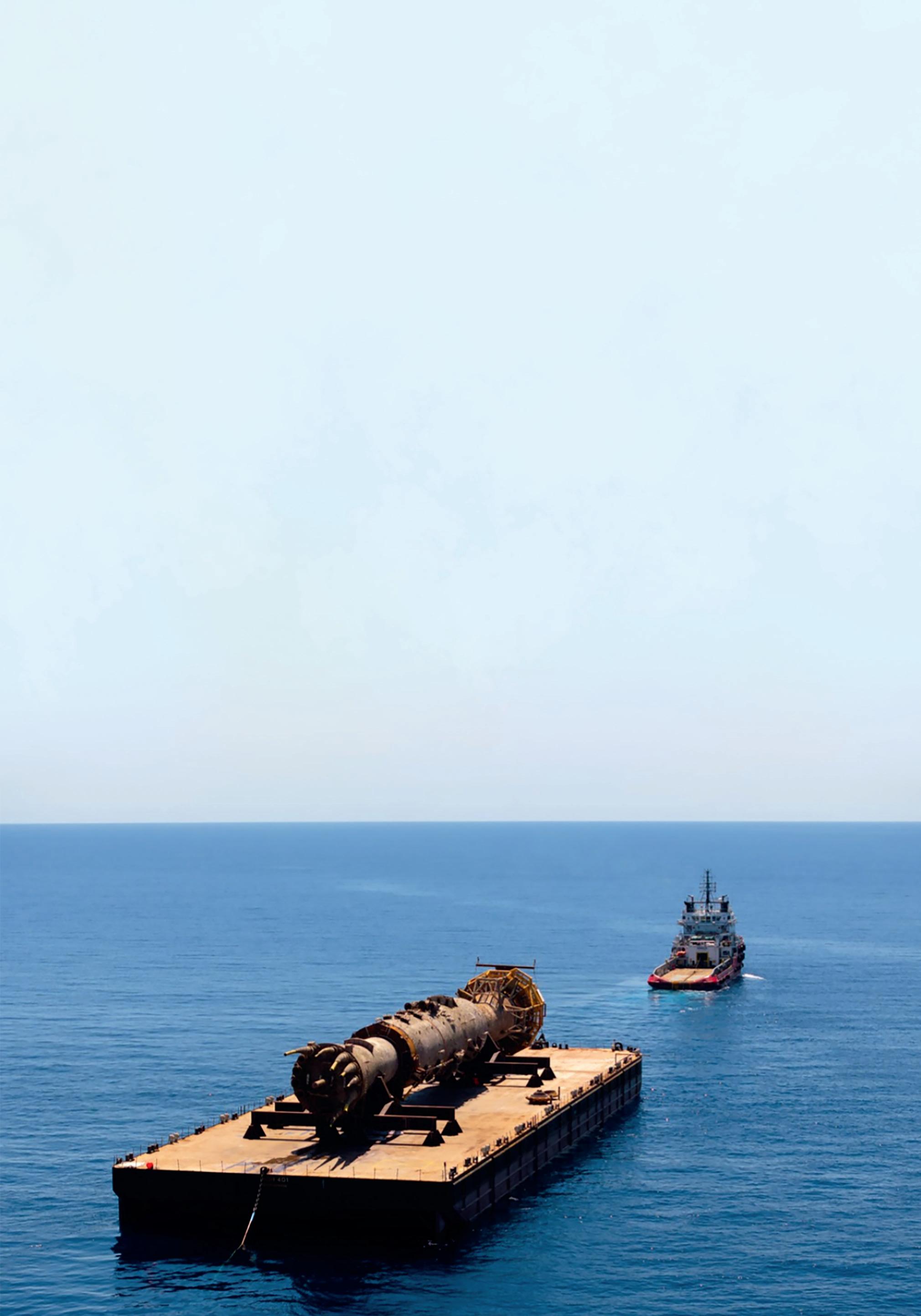
without proper rules and plans, the massive job of decommissioning could become an environmental and economic nightmare with no new work in sight.
The Northern Endeavour fiasco spurred long-overdue action in Canberra. In the fallout, lawmakers scrambled to plug legal holes and promise that never again would an operator be allowed to dump its responsibilities on the Australian people. The result was a suite of legislative reforms born from that crisis, and a new sympathetic federal ALP government that seemed keen to finish the job of reform that had begun.
While Western Australia and Victoria are considered ground zero for the challenge – this is no longer confined
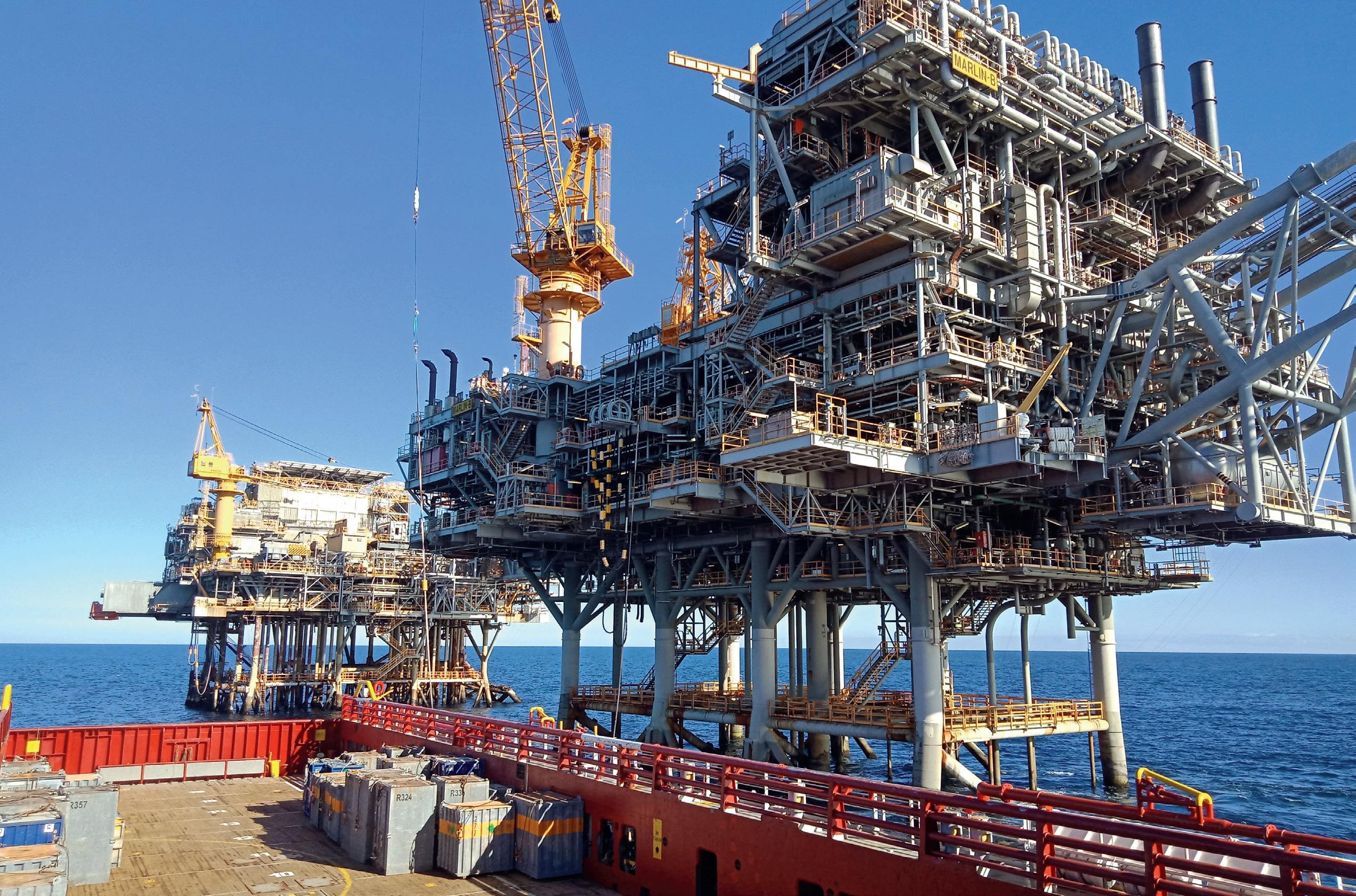
to one corner of our coastline – it’s happening across the country. Major clean-up projects are underway in the Timor Sea, the Bass Strait, and off the north-west coast, generating work for seafarers, divers, and port workers from Darwin to Geelong. In the regions, port facilities are standing up for the dismantling work. Operators have started plugging wells and tearing down old structures that should have started a decade ago. In short, the “great cleanup” has begun in earnest – and maritime workers are in the thick of it.
Beyon D the h orizon:
Buil D ing a Just, Jo B - r ich Future F ro M oFF shore Deco MM issioning
From the lobbying and regulatory pressure, we’re seeing real results as companies are harnessing the expertise of our offshore workforce in all ongoing clean-up efforts.
Hundreds of union jobs have already been created on new decommissioning projects launched off our coasts. Entire vessels’ crews are now working year-round on these clean-ups. MUA ships are dismantling defunct oil
fields off Exmouth and Karratha. In the southeast, our members are undertaking prep work for removal of the platform’s topsides and plugging and abandoning wells in the Gippsland Basin. What just a few years ago was hypothetical talk of “future jobs” is underway from rigging and diving work offshore to cargo handling and recycling tasks onshore.
Just as significant is the growing influence of workers and their unions in this space. The MUA and the Offshore Alliance set out to make sure decommissioning would not be done in the shadows or left entirely to corporate whims, and we’re succeeding. We’ve forced our way to the table with industry and government – and earned outcomes through relentless advocacy. The MUA is now recognized as a highly informed, influential voice on this issue. This influence is not just for show – it’s translating into concrete changes.
We also helped push the government’s new Decommissioning Roadmap to include our priorities around safety, environment and jobs. Union input was received by the taskforce developing that Roadmap, balancing out the oil industry’s spin.

All of this progress has established decommissioning not as a corporate burden to be dodged, but as a legitimate new industry. These wins were hard fought, and we should be proud of them. But we’d be naive to think the battle is over.
at a c rossroa D s: Buil D it or lose it - What’s n ee D e D F or an a ustralian Deco MM issioning i n D ustry
Offshore decom is a $100+ billion global industry over the next two decades. Australia must act now or miss out. Global oil and gas majors have a long history of:
• Leaving equipment in place to avoid costs;
• Pushing artificial reefs to greenwash dumping;
• Offshoring dismantling to lowcost, low-standard yards.
Australia now stands at a crossroads in offshore decommissioning. Despite some new laws, and increasing political support – we still lack much of the on-the-ground infrastructure and enforcement needed to make those promises a reality. If we don’t push further, there’s a real risk that
this moment of opportunity will slip away, and companies will find new ways to cut corners. Major gaps include:
• Portside common-user dismantling hubs — capable of safely receiving, cleaning, cutting, and recycling platforms and subsea infrastructure.
• Federal government investment and incentives — where public and private investment for decommissioning co-exist. Guardrails Australia needs against industry’s playbook are:
• Mandatory domestic disposal requirements — all retired infrastructure must be brought back to Australia unless a clear public interest case is made otherwise.
• Circular economy integration — with laws requiring steel, concrete, and plastics to be recycled into local supply chains.
• Union-led safety and job standards — ensuring shore-based work is safe, unionised, and underpinned by Australian labour laws and agreements.
• National coordination, not patchwork — prevent state-by-state fragmentation. The Commonwealth must lead with a national plan, consistent rules, and public transparency.
• Training pipelines and licensing — develop a qualified, experienced dismantling workforce through union-led programs and national decom licensing.
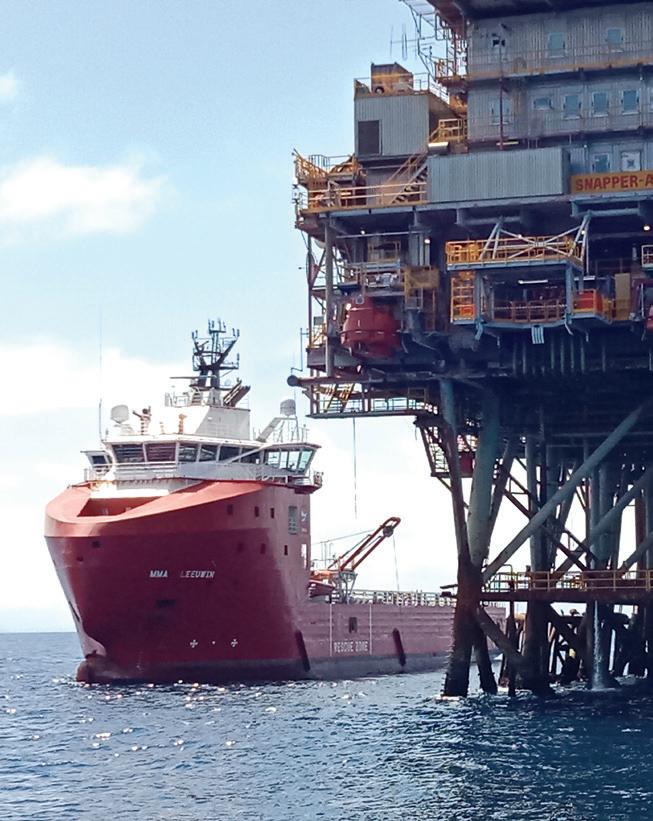
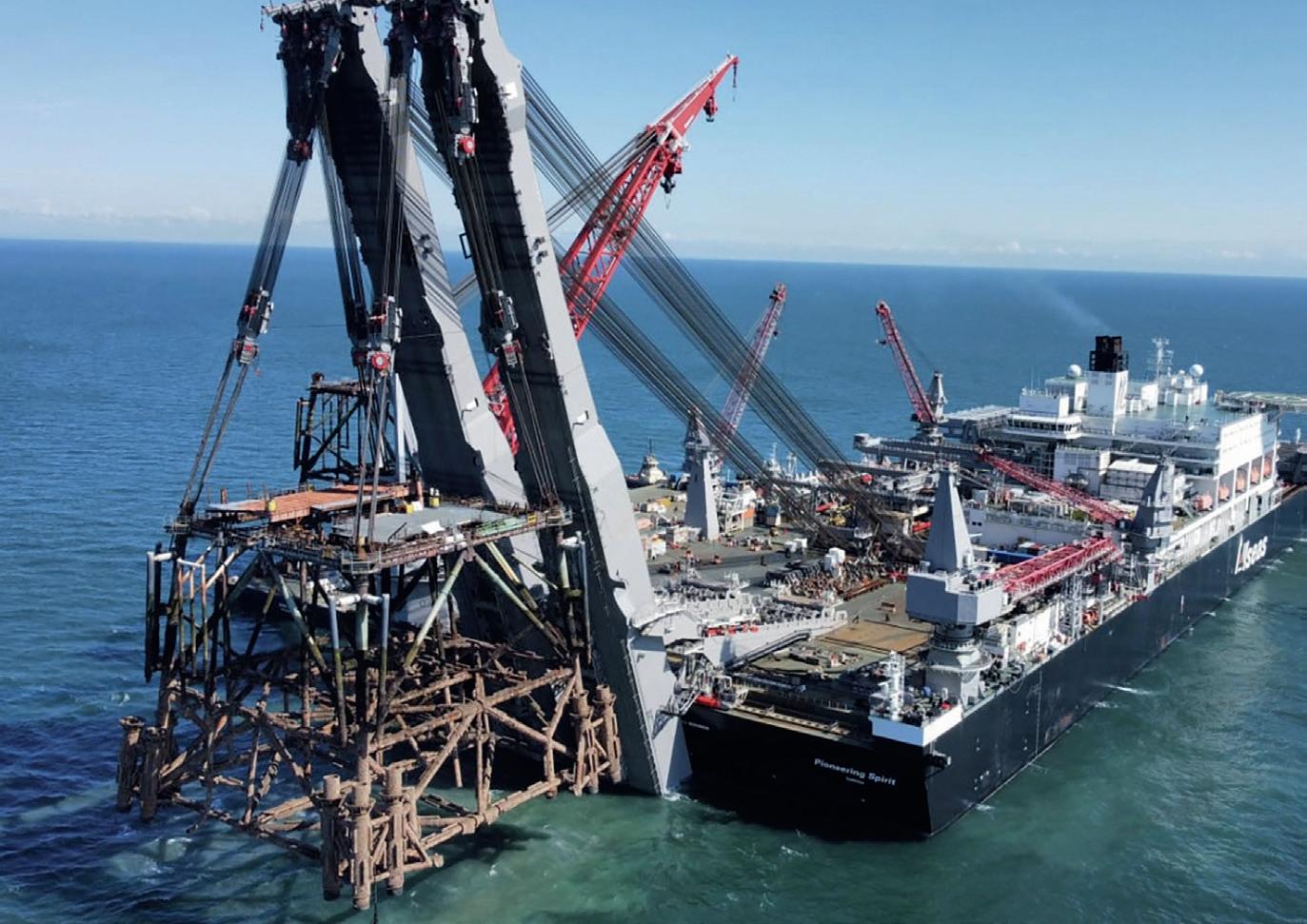
Lastly, Australia needs to solidify how decommissioning will be funded so that companies – and only companies – bear the cost. We can’t just pass the hat around, after the fact. We need upfront financial assurances from every operator. The MUA has been pressing for decommissioning bonds – essentially, security deposits that companies must lodge before they drill a well or install a platform, which can be cashed in for clean-up if they disappear. Australia is unique among advanced nations in not requiring such bonding for offshore oil and gas. That must change. We will continue to push until every barrel pumped comes with a bonded guarantee for its clean-up. The offshore oil & gas producers should collectively bankroll the regulatory oversight and any orphaned clean-ups – not the public.
The government have just put $29.7 million toward improving offshore environmental and safety outcomes and kick-starting the Roadmap. While that’s a welcome investment, general taxpayers shouldn’t pay a cent for decommissioning. We’ll keep campaigning for that in the halls of Parliament. Making polluters pay isn’t just about fairness – it’s about sending the message that companies can’t externalize their clean-up costs.

The path forward will not be driven by politicians or executives. It will be driven by us – the workers –demanding and creating the change. Our union has always understood that winning on paper isn’t enough; we have to organize on the ground to ensure promises are kept. That’s why we’re bringing together members in each region to spearhead the decommissioning campaign at the local level.
These groups, run by rank-andfile members with branch support, are planning public actions – from community forums to public rallies – raising awareness and keeping up pressure to keep our work here. We need members from all corners of our union – seafarers, port workers, oil & gas veterans, young activists – to lend their voice.
Everyone’s perspective enriches the campaign. By getting involved, you can help shape the solutions – whether it’s pushing for a dismantling yard at your port, lobbying your state MP to back recycling laws, or simply making sure your worksite mates know that the union is fighting for these new jobs.
The more visible and united we are, the more unstoppable we become. •
The MUA’s Work for Inclusion in Maritime Across Australia’s ports, ships and offshore worksites, women are stepping into maritime jobs that were once off limits. From deckhands and tug engineers to HSRs and union delegates, we are navigating the tide of change – and the union has been flat out with them - putting equity and inclusion at the centre of our campaigns, our bargaining, and our leadership.
Since the last MWJ, our highlights include tipping over the 10 percent mark of women MUA members, celebrating the 50 yr anniversary of women working on the wharf, witnessing the MUA StGeorges Basin training facility reopened with an allwomen ITF volunteer course, held an inaugural QLD Women’s conference, and had the highest number of women trainee integrated ratings in history.
The National Women’s Committee: Where Union Equity Lives
At the heart of the union’s work toward fairness is the MUA National Women’s Committee – our representative body of elected delegates and rank-and-file leaders from every branch. These are seafarers, wharfies, integrated ratings, cooks, stewards who know firsthand what it means to be a part of something bigger than ourselves – and who are committed to changing how we live and work for the better.
The Committee has worked toward gains in respectful workplaces and gendered safety, to parental leave entitlements, superannuation fairness, and representation on decision-making bodies.
Their work has helped embed equity into the day-to-day operation of our union:
• In EBAs we consider flexible rosters, parental leave, and safety provisions through a gender lens.
• All branches intentionally include women on bargaining teams, branch committees, and conference delegations.
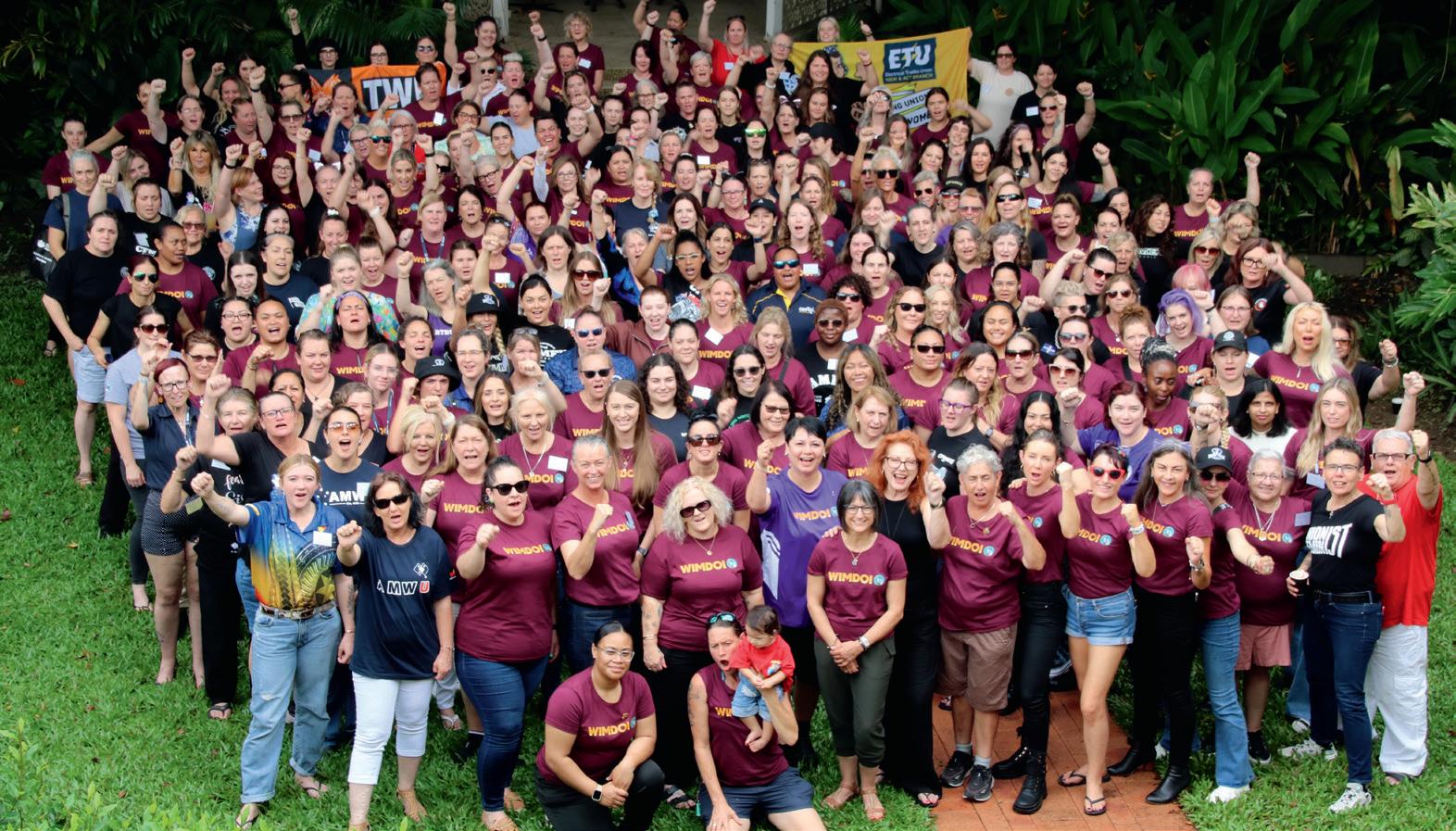
• Training and leadership opportunities are offered with structured support for women to step up as delegates, HSRs and organisers.
This is how union power grows – from organised, embedded, accountable action.
Queensland Women’s Conference: Unity, Strategy and Strength
This year MUA women from across Queensland and the nation gathered in Brisbane for a landmark Queensland Women’s Conference – a space for skill-building, strategy, and solidarity.
Over two days, women shared stories from the tugs, terminals, and cargo ships. They identified common
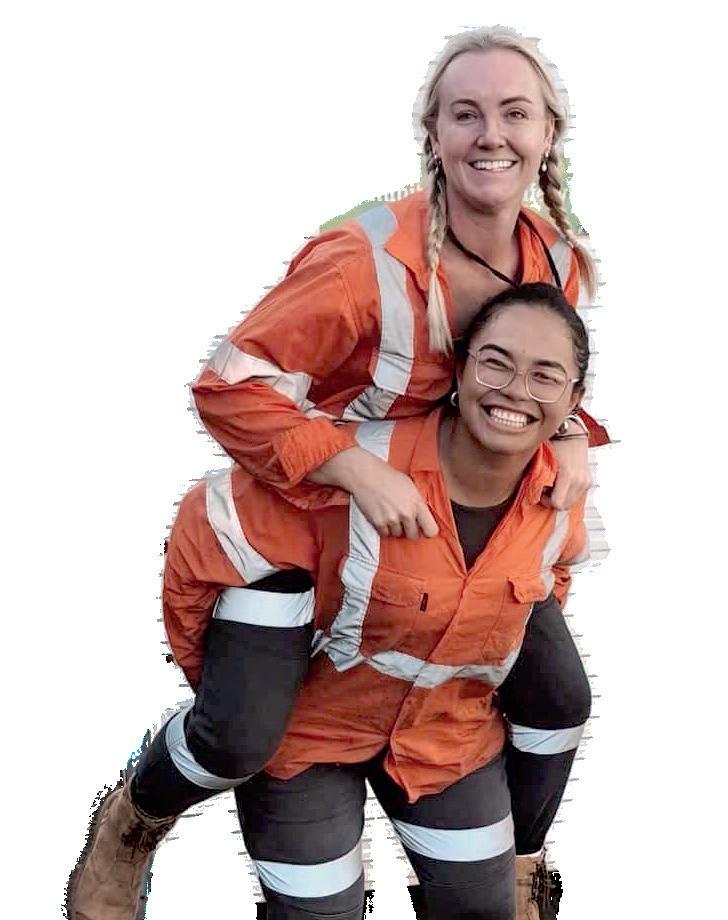
challenges – being the only woman on crew, missing out on training opportunities, facing outdated facilities or silent tolerance of harassment.
But more importantly, they planned together. Workshops tackled:
• Creating safer work environments;
• Building confidence and visibility as delegates and activists;
• Supporting women returning to sea after parental leave;
• Working across worksites to organise collectively around shared issues.
Sisters from other maritime unions (AMOU, AIMPE) joined to share their experiences and learn from MUA organising— reminding us that gendered challenges are structural, and that union women can solve them.
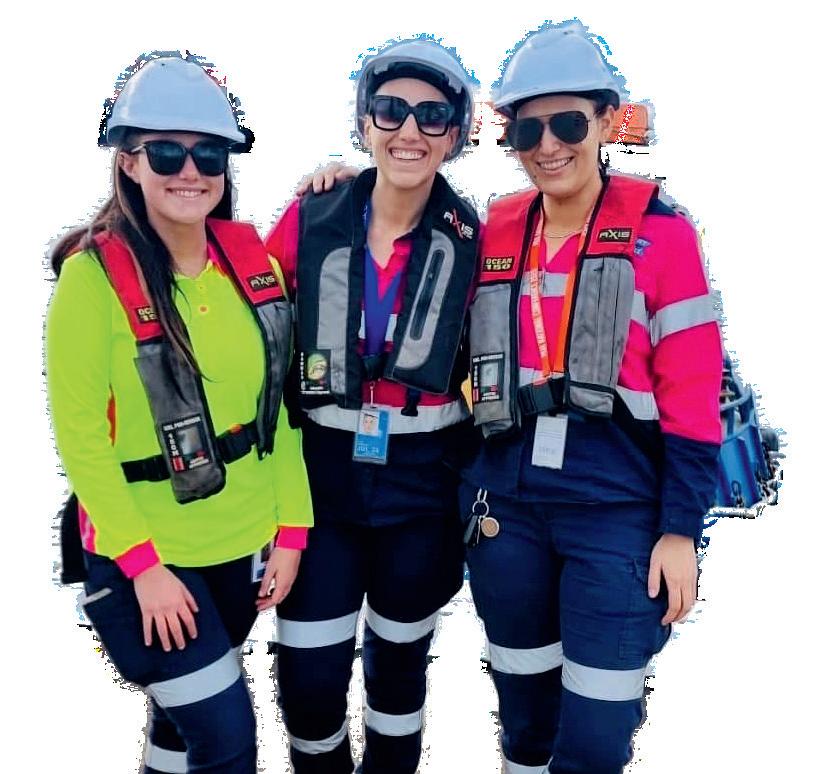

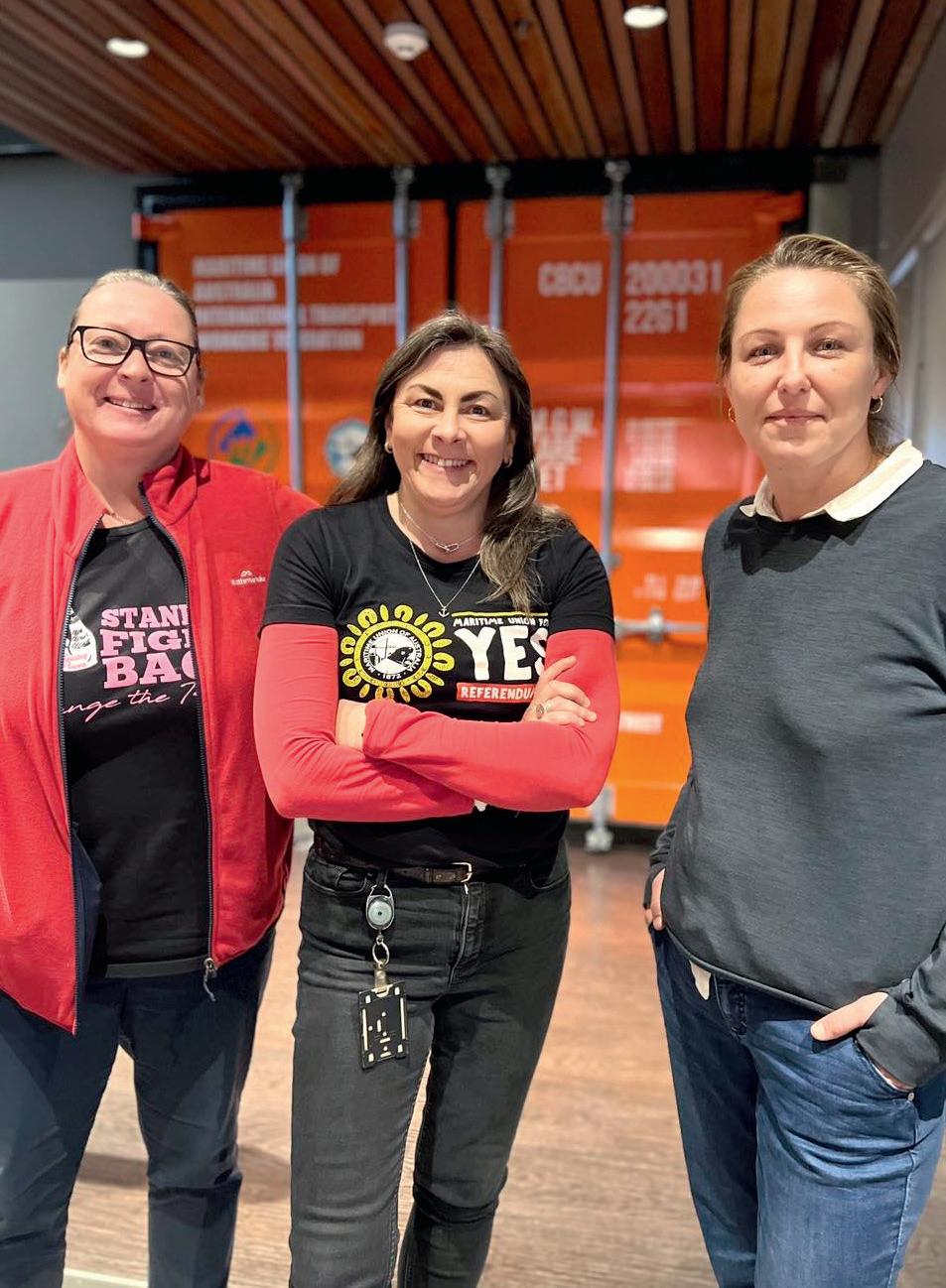
Also hosted by the Brisbane branch, an entire day was dedicated for a caucus of the National Women’s Committee volunteers. This was a space for workshops, planning, strategizing and addressing how to tackle workplan items in the lead time for the next Quadrennial Conference.
The reality is that women who enter the industry too often burn out, drop out, or face barriers their male counterparts will never encounter. Despite the gains, the MUA are cleareyed about what’s still missing:
• Superannuation on all paid leave (parental leave doesn’t qualify for super)
• Facilities, rostering and PPE still reflect assumptions that exclude women or ignore caring responsibilities.
• Support structures and mentoring for women in offshore, remote or isolated environments are inconsistent or absent.
• And career progression, remains heavily gendered.
Out there already addressing the outstanding items from conference, is the MUA QLD Women’s Liaison Officer, Ann Gray, along with delegate, rank-and-file activist Laura Dodin, who have been selected as national Industry Advisors for the Queensland Women Rise (QWR) project. This is a significant leadership appointment that recognises the Sister’s deep commitment to workplace equity, grassroots organising, and extensive industry knowledge.
These appointments place MUA women at the forefront of one of the nation’s most ambitious gender equity pilots across construction, transport, and maritime sectors. Ann and Laura will work closely with workers, union reps, and employers at selected pilot sites to:
• Co-design flexible work arrangements that better support reproductive health, caring responsibilities and work-life balance;
• Ensure safe and dignified workplace amenities and inclusive PPE and infrastructure;
• Identify and reduce WHS risks that are felt more acutely by women;
• Facilitate training and education campaigns to challenge discriminatory norms and build inclusive cultures;
• Help evaluate and scale up successful initiatives across the broader industry.
These Comrades will bring the voice of the MUA into a project directly aligned with the government’s Working for Women Strategy for Gender Equality and be a strong union presence in ensuring that equity outcomes aren’t just policies on paper, but real improvements for women and men in maritime. This is a win not only for QLD, but will raise the bar for all MUA members – and a reminder that our voices are essential to shaping the future of our industries.
Legal Case for Equity is Enforceable Equity isn’t just a value – it’s a right. Thanks to major reforms like Respect@ Work, it’s now backed by enforceable law. Employers across the country now have a positive duty to take proactive steps to prevent sexual harassment, sex-based harassment, and hostile working environments. This obligation means employers must do more than react after harm occurs – they must put in place clear policies, training, complaints systems, and a workplace culture that prevents these behaviours before they start.
No worker should face harm, exclusion or silence on the job - and with the union behind them, no worker has to.
The MUA is using every available lever to hold employers to that duty. Through trained delegates and Health and Safety Representatives, we’re pushing for enforcement. This doesn’t negate the need for using the industrial system, and embedding stronger rights into EAs. Through statutory reform, and regular forums with the regulators, we’re making sure that when workplaces fail to protect our members, they don’t just break trust –they break the law.
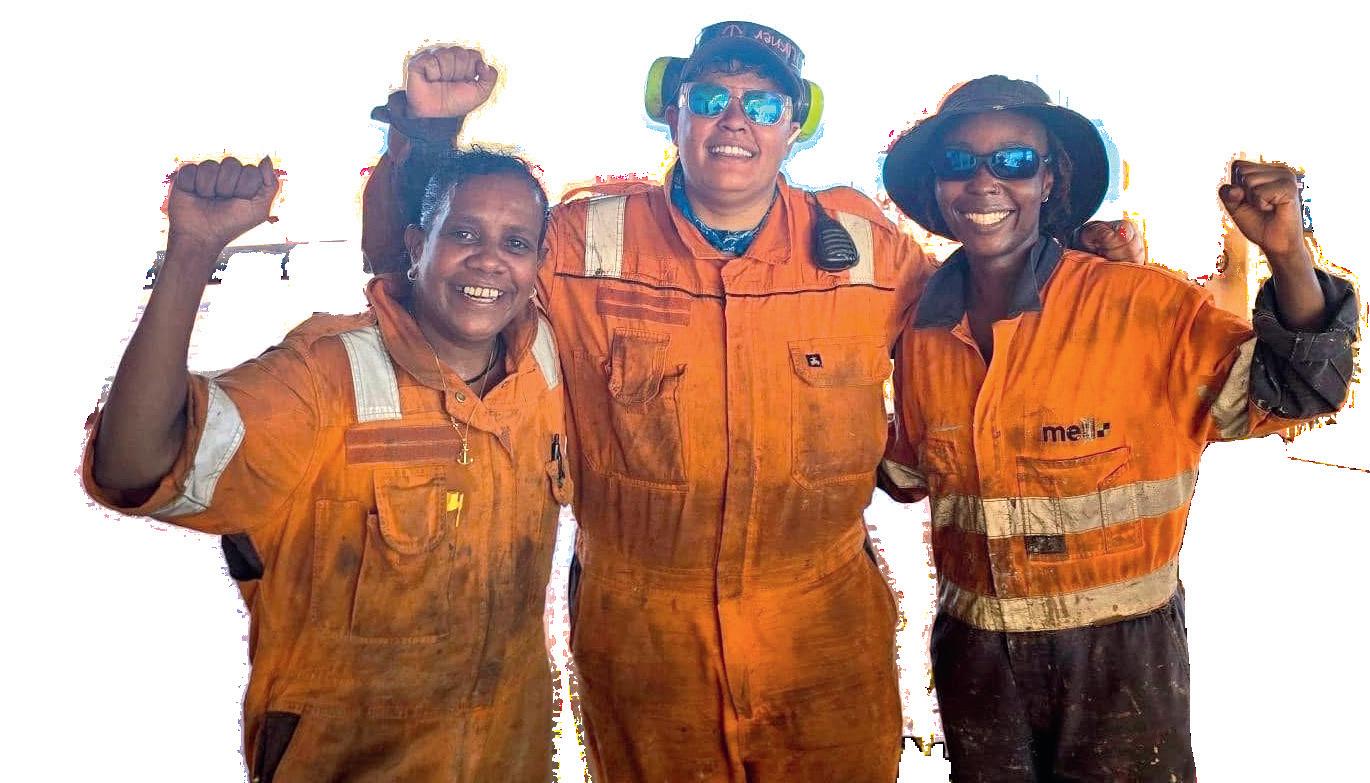
In the offshore - From Legislation to the Jobsite: More Wins for Safety & Respect
Following years of advocacy, the MUA has played a role in securing reforms to the Offshore Petroleum and Greenhouse Gas Storage Act
(OPGGS Act), which governs safety across Australia’s offshore oil and gas industry.
Backed by MUA submissions and testimony, the National Offshore Petroleum Safety and Environmental Management Authority (NOPSEMA) has now released official guidance recognising psychosocial hazards – including isolation, and sexual harassment – as matters that must be addressed through Safety Case regimes and consultation with Health and Safety Reps.
For the first time, harassment, bullying and exclusion in offshore environments are now being recognised not just as interpersonal issues – but as serious health and safety risks. They’re a direct result of workers speaking up and union delegates standing by them, and they raise the bar for every operator and contractor in the sector.
The MUA and the Offshore Alliance can ensure that workers and HSRs are consulted in the safety case development – and we can hold operators accountable if they fail to meet their commitments. This will be done through direct engagement with regulators, and worker-led reporting. The MUA is making sure offshore safety means more than PPE – it means a workplace free from harm, in every sense.
Touch one touch all – Building and using Union Power Unionism at its core: the belief that every worker deserves dignity, safety, and a fair go.
When we tackle the barriers that hold parents back, look after the workers facing mental strain offshore, and anyone who’s ever felt isolated, unsafe or overlooked on the job we are rightly cultivating expectations that the maritime industry has too long avoided.
The MUA is not waiting for change. We are building it. From branch-based activism to national safety campaigns, from changes in the law to shifts in workplace culture – this is unionism in action.
Tasmanian branch deputy secretary
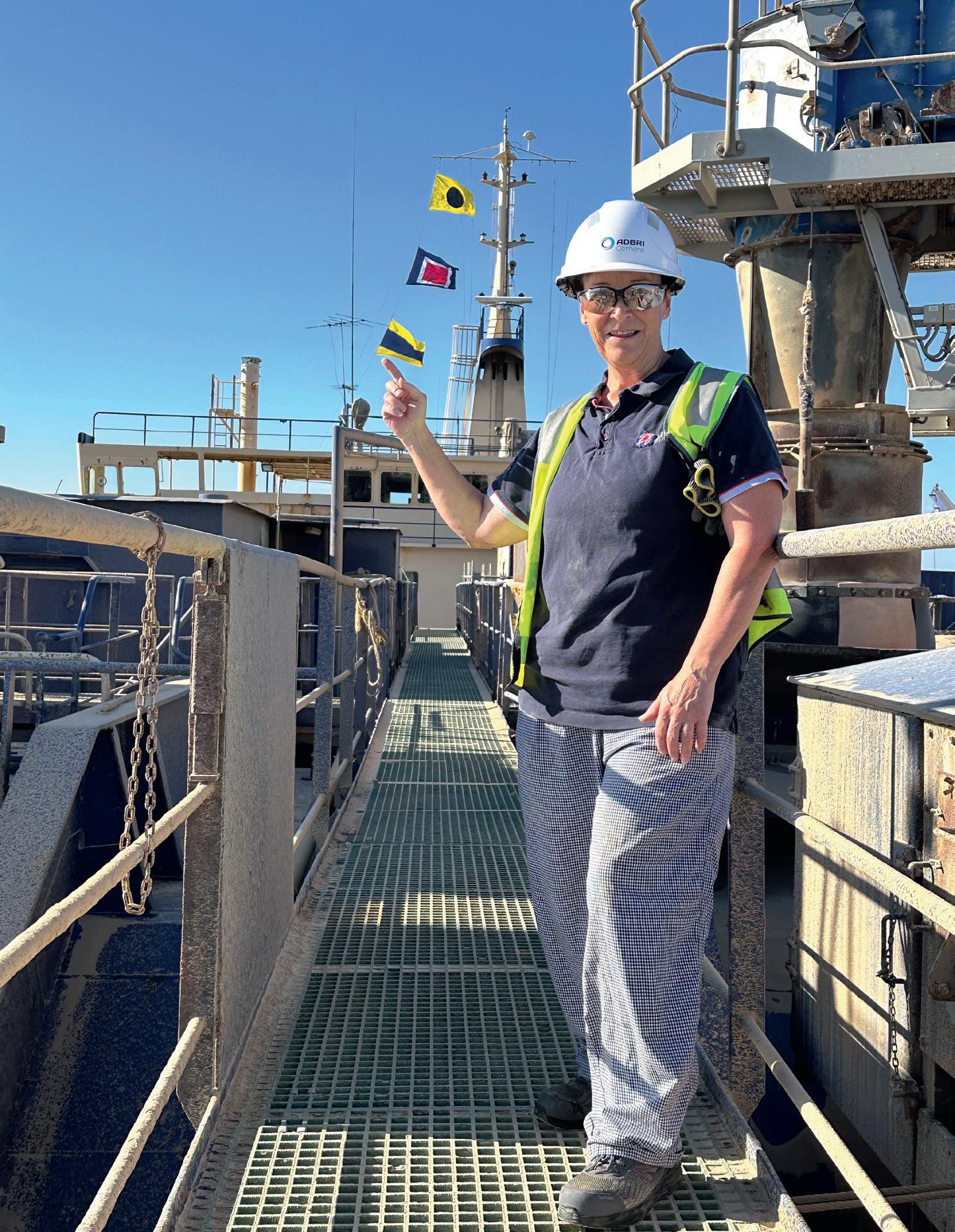
– Alisha Bull inspired many of us at the union’s last quadrennial conference when she took to the stage in an address about workplace leadership, barriers, inclusion, and the union’s role in giving everyone a fair go.
Alisha called for “change on a larger scale—a collective effort to redefine societal norms and expectations in our backyard first... that men and women must stand together, advocating for change and challenging the status quo.”
Comrade Bull said, “I believe it’s a duty of us all to contribute to union strength, to be that, not just in our words but by our actions.”
If you want to be part of that change, get in touch with your branch or the National Women’s Committee. There’s space on deck, at the table, and in leadership for all of us.
What does a fit-for-purpose maritime workforce look like in 2025 and beyond?
This question was interrogated at the Australian Maritime College in Tasmania this year. The ‘College of Knowledge’ hosted an International Women in Maritime Day event bringing together a powerful cross-
Sue Douglas flying the flag(s) for International Womens Day
section of the industry – from trainee integrated ratings, engineering cadets, union and industry representatives to government regulators and politicians. In partnership with the International Maritime Organization, AMSA, WISTA Australia and The Nautical Institute, the event was a showcase of both the challenges women face in maritime and the leadership stepping up to change it.
The MUA delegation – Sharon Shumba (Vic), Alisha Bull (Tas), and Angie Moore (Newcastle and National Office) – played a key role in grounding the discussions in realworld experience. The roundtable session was a standout, offering space for open, honest talk about culture, safety, and solutions. From calling out outdated stereotypes to spotlighting the wins achieved through union organising, it was clear that workers’ voices in these forums are essential. For the MUA, the day was both a reflection of how far we’ve come – and a charge to keep pushing. •
The Tasmania Branch inducted a number of Life Members at a ceremony to coincide with Christmas, late last year.
“We are incredibly proud to be able to award the following members with their life membership, it is very inspiring seeing how dedicated these members are in not only our industry and their careers but dedicated to the union and our continued fight,” said Branch Secretary, Jason Campbell.
Martin Tabrett, a long-time wharfie with Toll (Strait Link) working hard on the wharf for many years, he was a member for 24 years, it was great to be able to award him in front of his fellow comrades who also worked on the wharf with him over the years, we wish him the very best in his retirement!
David Hudson, a well-known seafarer who has a long history in the maritime industry with his last job with Strait Link, he started way back in 1981 with an impressive 43 years as member, Dave is a very familiar face around the office, all the best in your retirement!
Paddy Chamberlain is a well-known face at the branch over the years, he last worked with Tasports on the Tugs. Another impressive 43 years as a strong mua member and unionist. We wish Paddy all the best in his retirement!
Dallas O’Neill has a long history with Toll (Strait Link) on the Burnie Wharf, with many family ties, he joined the MUA back in 1990 with 34 years as a member! Enjoy retirement it is well deserved!
Dean McPherson is a beloved seafarer of the branch, working as an IR when he joined the SUA back
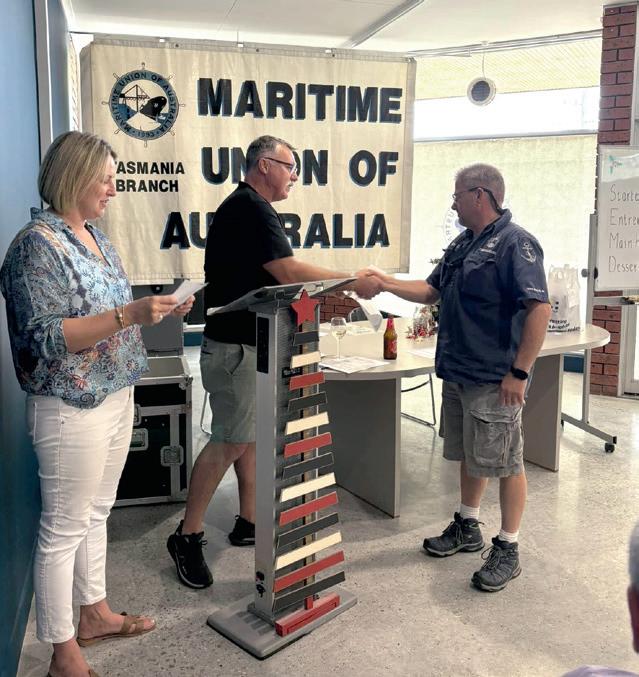
in 1979. Dean served 41 years as a valued member before his retirement back in 2020, thank you for making the trip to Tasmania to be awarded.
Glen Pearson worked as a wharfie with Qube before his retirement last year, he joined the WWF back in 1985, with 38 years a member. It was very special to be able to award Glen his life membership with his father who was a previous union member in attendance as a fellow veteran. •
MUA members and officials recently hosted a fundraiser for APHEDA and the people of Timor Leste. The event was the organised by Max Ward, a Victorian Branch seafarer, Lachie Bachelor, Alisha Bull from the Tasmania Branch, David Ball from the Victoria Branch and lead singer of the Painters and Dockers band, Paulie Stewart.
Paulie is the younger brother of Tony Stewart who was one of the Balibo five that were assassinated by Indonesian forces 50 years ago this year. Since this
tragic event, Paulie and his bandmates have devoted themselves to raising awareness and fundraising for Timor Leste. The event raised close to $15k through the support of the trade union movement.
Monies raised have been allocated to several projects run by APHEDA in Timor. Some funds were donated to a cause close to Paulie’s heart in the Pro-ema group. This group helps to empower adolescent girls and young women in Timor-Leste through training and education.
The MUA has a proud history of supporting Timor Leste through the Tas Bull International Aid Project (TBIAP). Since 2006, the TBIAP has raised funds in excess of $250,000 for numerous overseas projects and in the wake of disasters to provide much needed financial assistance to our comrades across the globe, with the overall objective of the fund “to make life better everywhere”. The fund achieves this by empowering workers to obtain and skills and education to prosper and promote collective action for working people around the world.
“It’s only with the generosity of our membership and by extension the broader trade union movement that these events are such a success. The MUA has a long and proud history of internationalism; something our Union believes should be at the heart of all trade unionists,” said MUA Victoria Branch Deputy Secretary, David Ball.
“Thank you to all members and comrades who supported the event including Annette from the Vic Branch who did a lot of the back ground work in pulling the whole thing off,” Ball added.
For more information on the projects APHEDA do or to learn more about Proema check out these links apheda.org.au and proema.org •

For the past six years, Australian wharfies throughout the country have been working closely with the Tas Bull Seafarers Foundation to make fast free WiFi available on ships at Australian ports.
Despite now being a legal obligation under the International Maritime Organisation’s Maritime Labor Convention, internet access aboard international ships is often either completely non-existent or an expensive luxury service which poorly paid, exploited international crews have no hope of being able to afford.
Seafarer Connect, a project of the Tas Bull Seafarers’ Foundation, bridges that gap. Now a registered charity with the ACNC, Tas Bull has been refining and developing the technological and logistical solutions associated with delivering fast, free WiFi aboard visiting ships from Port Botany, Kembla and Newcastle to Brisbane, Melbourne, Geraldton and Kwinana.
“We have a really good working relationship with the various port authorities, terminal operators and pilots in every port we service,” says Robert Coombs, Managing Director of Tas Bull Seafarers Foundation. “Wharfies, HSRs, Pilots and other maritime workers and port welfare staff come together to devise an implementation plan to get our Seafarer Connect vessels up the gangway when a ship enters the port, and then they make sure it comes off at the end of the ship’s window. We’ve only had one machine take the scenic trip to Singapore, but it got returned pretty quickly all things considered,” said Coombs.
The Tas Bull project team has worked closely with Claratti, a Perth based IT services provider, to reengineer the devices and repackage them in a lightweight backpack, instead of the large orange Pelican cases that were first used.
“We designed the new implementation from the ground up to be lightweight and ergonomic for the workers tasked with loading and
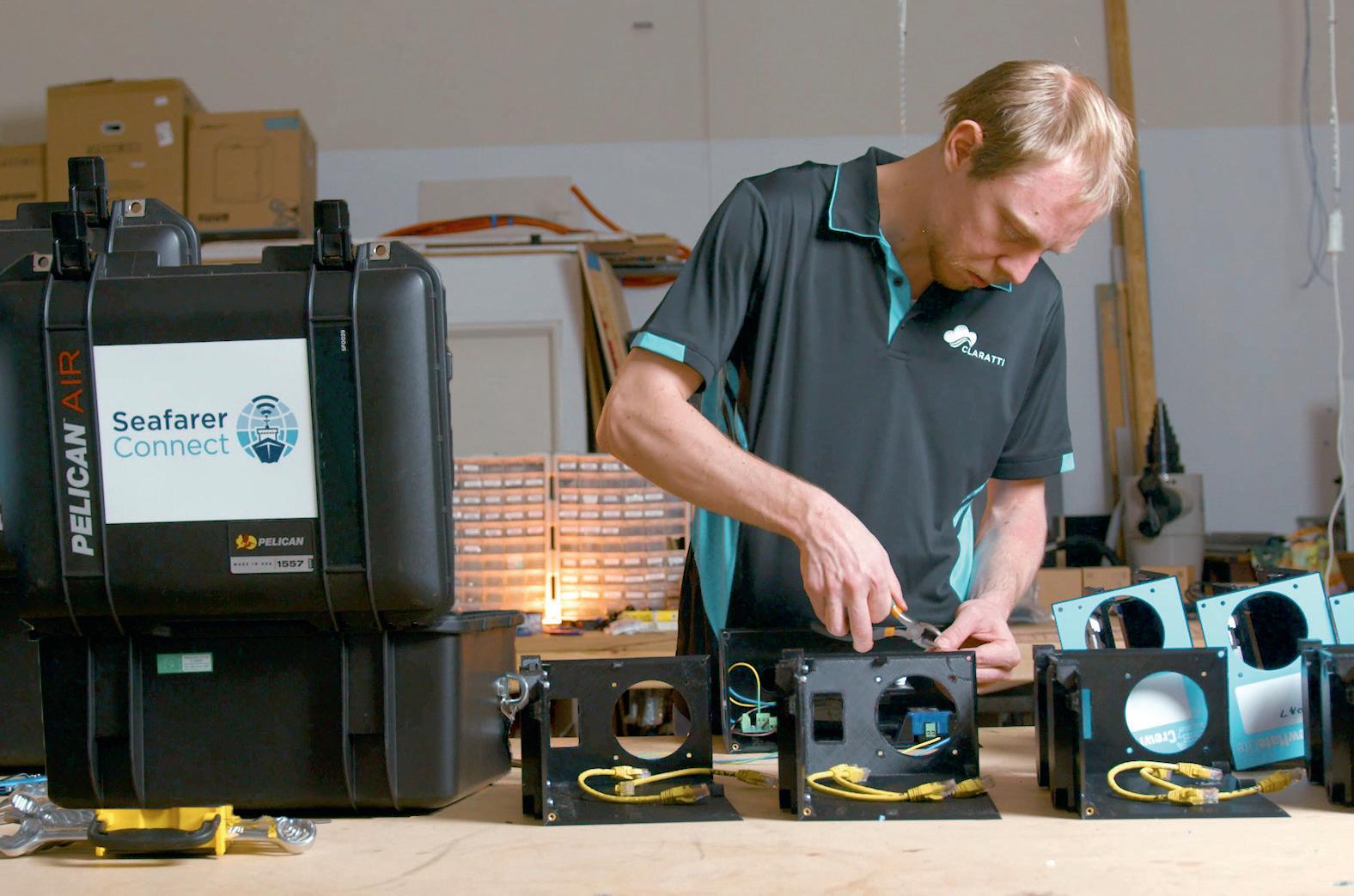

For the past six years, Australian wharfies throughout the country have been working closely with the Tas Bull Seafarers Foundation to make fast free WiFi available on ships at Australian ports.
unloading them up the gangways,” said Doug Childress, Claratti’s CEO. “Now we are manufacturing these in-house in Perth using high performance componentry to ensure there is a strong mobile data connection to the data towers, but also a highly effective WiFi signal within the ship for crews to connect to,” Childress said.
Mr Coombs, a former MUA Sydney Branch Secretary, commended the Australian manufacturing and engineering that has gone into the new solution with the new devices being faster, more durable and reliable than the originals.
“After we rolled out the first iteration of these devices, in the thick of the COVID pandemic, we knew we needed to get seafarers some kind of connectivity, but once that first design was out there working well, we sat down to examine the design and implementation side to reduce the weight, the footprint and improve the usability as well,” he said. “Being able to do that with the support of an Australian workforce in Perth that has
done everything from the design to the manufacturing, is a tremendous outcome,” Coombs added.
The International Transport Workers Federation’s Seafarers Trust has recently supported the project with a major grant of A$150,000 to support the roll out of new devices that will expand the project’s coverage into northern Queensland. This comes off the back of State Government support in Victoria which has significantly boosted the footprint of Seafarer Connect at the Melbourne terminals.
In the meantime, Tas Bull has also partnered with Stella Maris’s Port Botany chaplain, Sister Mary Leahy, to provide a shore-based WiFi service at their seafarer’s welfare site near Brotherson Dock. This will provide fast, free internet connectivity while seafarers await transport for shoreleave or relax with friends in the leafy garden refuge that Sister Mary and her supporters throughout the port community have built for seafarers to enjoy while berthed at the three Sydney container terminals. •
The MUA Sydney Branch is sounding the alarm over a deeply concerning move by the NSW Labor Government – a plan that could shut down Glebe Island Port to pave the way for luxury high-rise housing on the last remaining useful area of working harbour infrastructure.
If the government presses ahead, Sydney would not only lose one of its last working ports, but also put at risk many of the major events that the industrial harbour makes possible for Sydneysiders and visitors, including the iconic New Year’s Eve fireworks.
The Branch’s Deputy Secretary, Paul Garrett advises that “we’ve formally raised our concerns with Premier Chris Minns and Treasurer Daniel Mookhey. This isn’t just a local issue – this is a warning siren for the future of Sydney Harbour and those who make their living on the waterfront, aboard commercial vessels, or in the associated engineering and industrial businesses dotted around Glebe Island and Rozelle Bay,”
It’s rare that unions and business find themselves on the same side of a fight, but Glebe Island is uniting an unusual coalition of voices. The MUA is standing shoulder-to-shoulder with the Working Port Coalition, a broad alliance of industry and business groups who oppose the conversion of industrial waterfront lands into luxury housing.
The speculation is that Glebe Island may now become Premier Chris Minns’ “Plan B” after the Premier’s favoured Plan A – bulldozing
Rosehill Racecourse for a 25,000-home mega development – was blocked by Australian Turf Club members in a vote of its members. With Rosehill off the table, developers have turned their eyes to the harbourfront.
“Let’s be clear: turning over Glebe Island to developers isn’t a solution –it’s a disaster,” said Garrett.
This isn’t just a local issue – this is a warning siren for the future of Sydney Harbour and those who make their living on the waterfront, aboard commercial vessels, or in the associated engineering and industrial businesses dotted around Glebe Island and Rozelle Bay
Glebe Island is irreplaceable maritime infrastructure. It’s one of the last active working wharves on Sydney Harbour. Lose it, and Sydney loses:
• A vital supply chain link for construction and bulk materials, including major machinery required for state significant construction equipment (eg: tunnel boring machines)
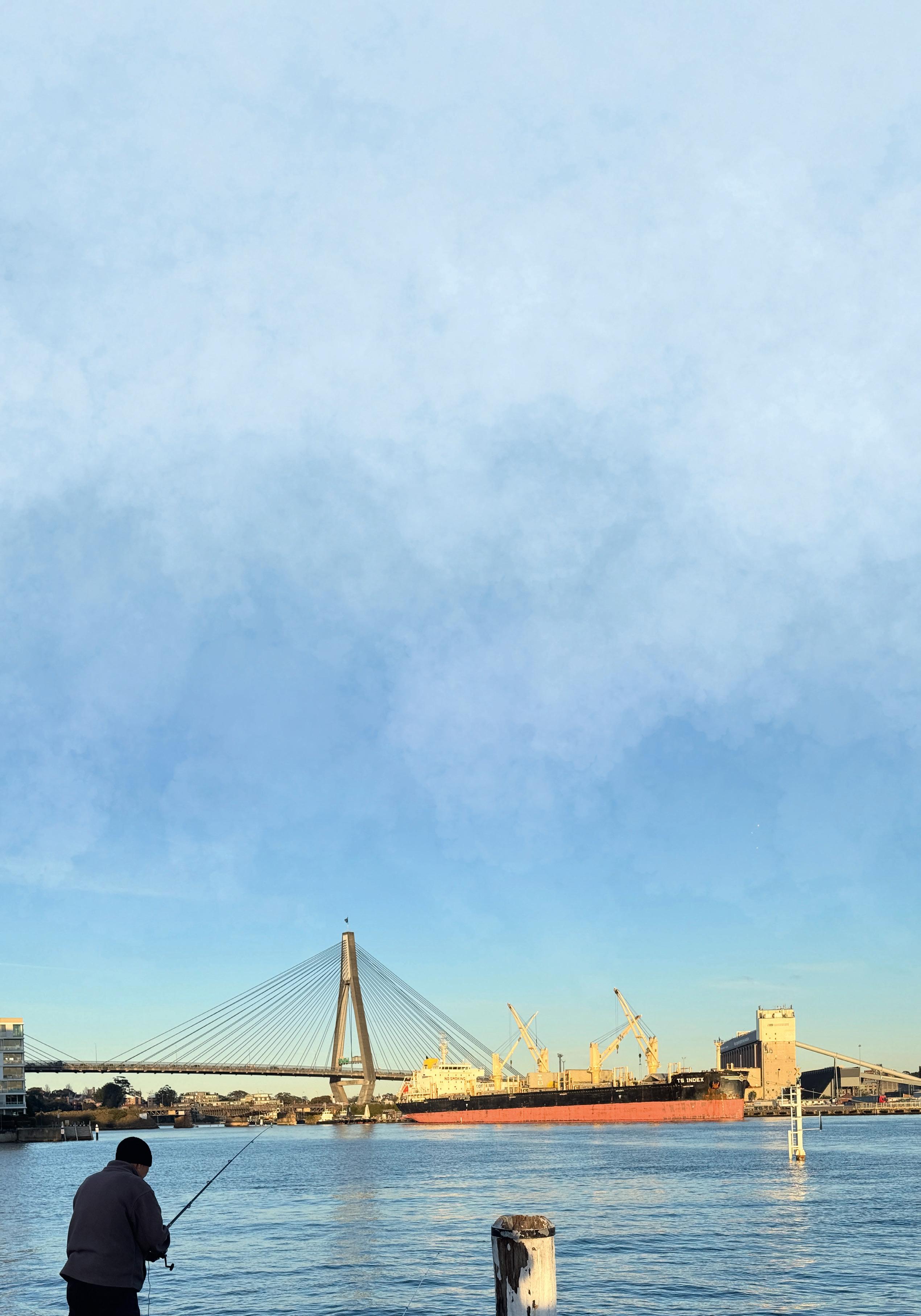
• Hundreds of good, unionised jobs
• A key staging ground for the Royal Australian Navy
• The only viable space for major logistics, including – crucially –the New Year’s Eve fireworks, as well as the Sail GP.
• Shipyards and workshops which provide logistical and maintenance support for Sydney’s ferries, wharves, barges and bridges.
“If that happens,” Garrett warns, “we’re going to lose wharf space that will never become available again. We should all enjoy this New Year’s Eve around the harbour because it may be the last. There will be nowhere to prepare the fireworks in future.”
Independent economic analysis backs this up. Business Sydney’s Paul Nicolaou points to a $29 billion economic contribution by the port over 30 years – and warns closure would cost the NSW economy $25–30 million every single year.
The NSW Government says it’s prioritising housing. We agree there’s a housing crisis. But turning critical infrastructure into luxury waterfront towers isn’t the solution.
The MUA’s position is that Sydney deserves a future that includes homes and jobs – that respects its past while planning for its future. A working port is a vital part of that. •
ITF’s Australian Inspectorate recovers millions for exploited seafarers, exposes massive wage theft and loopholes in Coastal Trading laws
The ITF’s Australian Inspectorate held a Week of Action across the Queensland coast, delivering a major success in the fight against exploitation in the global shipping industry. To date, more than $2.6 million in unpaid wages have been recovered for international seafarers, with he Inspectorate uncovering a further $12 million in potential wage theft and non-compliance issues which the Inspectorate team is now in the process of following up.
Over the course of the Week of Action, ITF inspectors conducted 45 ship inspections, resulting in the recovery of $2,603,164.05 USD in unpaid wages. These inspections also led to the repatriation of nine seafarers who were being unlawfully kept aboard vessels with expired contracts, the identification of 41 breaches of the Maritime Labour Convention (MLC), and seven new ITF agreements signed, with six more in progress.
“The Week of Action delivered real outcomes for exploited seafarers, but it also ripped the lid off the scale of systemic wage theft occurring in our ports and exposed the weaknesses in Australia’s coastal shipping laws,” said MUA National Secretary Paddy Crumlin.
Access to several vessels was denied by terminal operators, particularly at BMA sites – owned by BHP –which blocked inspectors, limiting the number of ships that could be audited. “If BMA had allowed full access, we estimate at least 15 ships would have been non-compliant. These companies can’t hide forever –we’ll keep coming back,” said the ITF Australia Inspectorate coordinator, Ian Bray.
Three potential breaches of the Coastal Trading Act were uncovered,
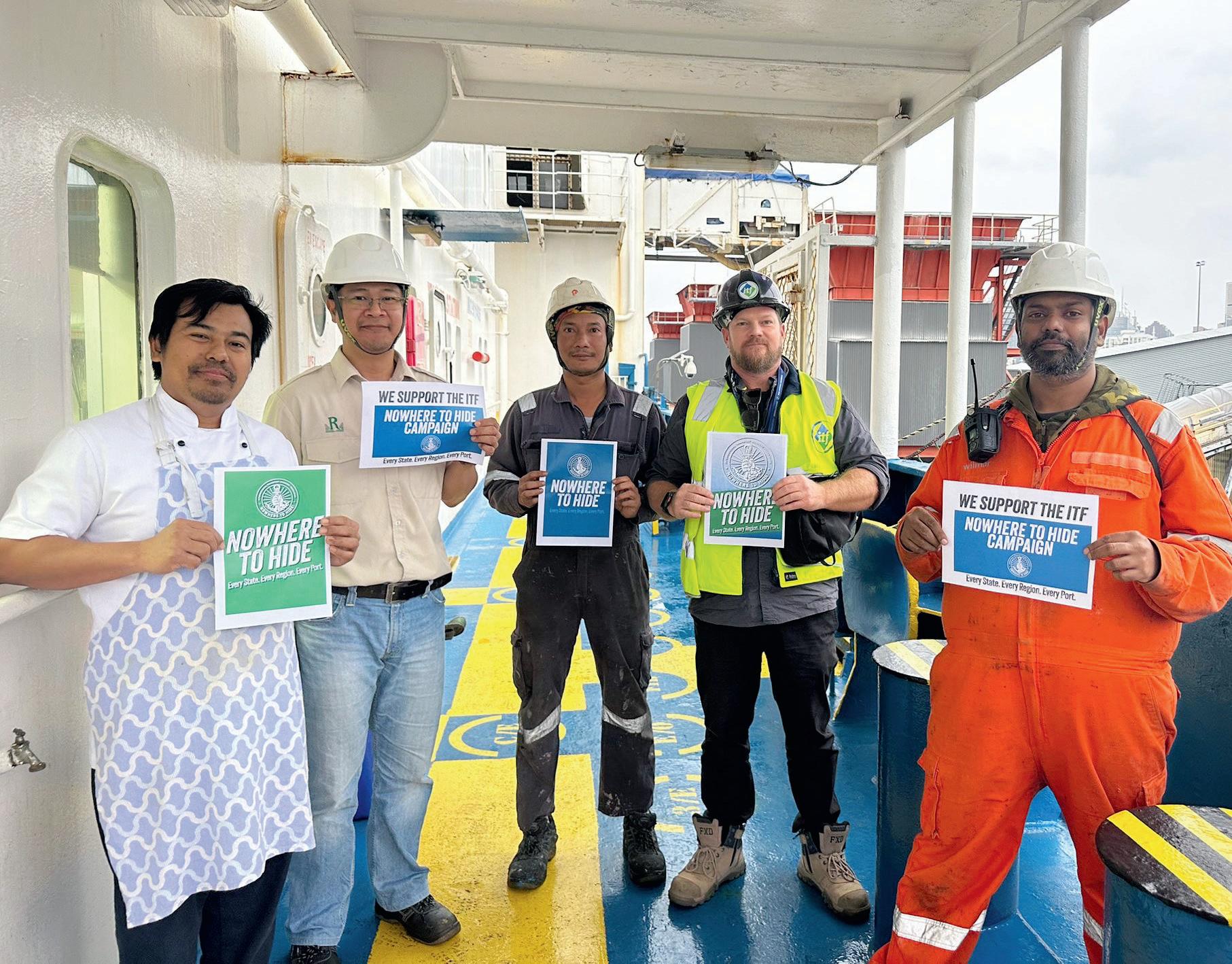
This is wage theft hidden behind invisible state borders... Rio Tinto is profiting from a loophole in the law that denies seafarers their rightful pay.
which could lead to fleet claims worth millions in backpay once further investigation is completed.
A major spotlight during the Week of Action was cast on Rio Tinto, with the inspection team calculating that seafarers on the company’s Australian coastal voyages should have been paid an estimated $2.48 million USD under the Seagoing Industry Award. Even more staggering, an additional $8.8 million USD in wages would have been owed had intrastate voyages – currently excluded due to statefederal jurisdictional loopholes – been covered by the Coastal Trading Act.
“This is wage theft hidden behind invisible state borders,” Bray said. “Rio Tinto is profiting from a loophole in the law that denies seafarers their rightful pay.”
In total, the Week of Action
secured or identified more than $15 million USD in wage claims for international seafarers, strengthening the long running calls for reform and intervention by federal regulators that have been pursued by the Maritime Union.
“We will be pursuing these cases, following up every breach, and continuing our campaign to close these loopholes,” Crumlin said. “By stamping out this exploitation, we also unpick the lie on which arguments against Australian flagged and crewed vessels are based. If it’s only through exploitation and abuse that these companies can crew a foreign flagged vessel more cheaply than an Australian one, then it’s high time these ships were flagged domestically and Australian seafarers sent up the gangway. •
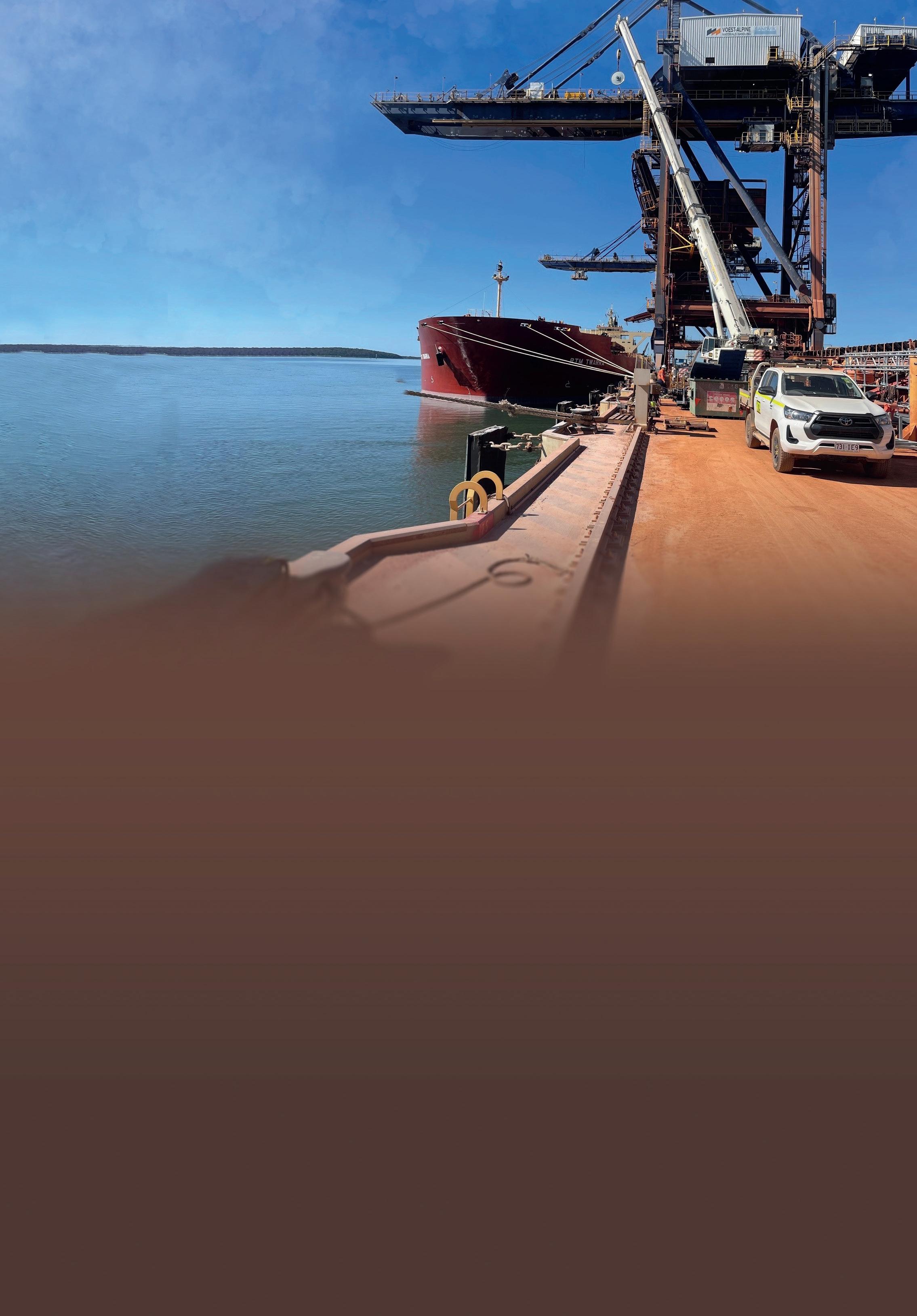
Branch officials and organisers in Queensland have had a busy month of ship and tug crew visits throughout the state, with Teneil Macmaster and Jaiden Simpson dropping by workplaces from Brisbane to Gladstone and Townsville.
TUG-OF-WAR NEVER ENDS
Svitzer crews at Brisbane reported ongoing fatigue issues arising from the current roster system that managers are not taking seriously enough. The Danish tug company, famous for its failed lock-out and public humiliation during the last EBA negotiation, refuses to take crew safety seriously.
The Branch is working closely with AIMPE and AMOU now to work through the issues and will go to the company with a united position on how to mitigate the risk and provide adequate rest breaks. “Once again, members of the union are fixing this company’s own mess,” said Tenneil Macmaster, a relieving branch official.
GLADSTONE
Smit Lamnalco’s schedulers in Gladstone are getting organised for the first time, with the workforce signing up to the Union and seeking a new agreement. Smit has the Exclusive Towage Licence for the Port of Gladstone until 31 December 2026 and operates eleven tugboats for the LNG sector, commodities and cruise ship calls.
“The Notice of Employee Representational Rights has been sent, and we aim to commence negotiations in the coming weeks on behalf of these members,” said Macmaster.
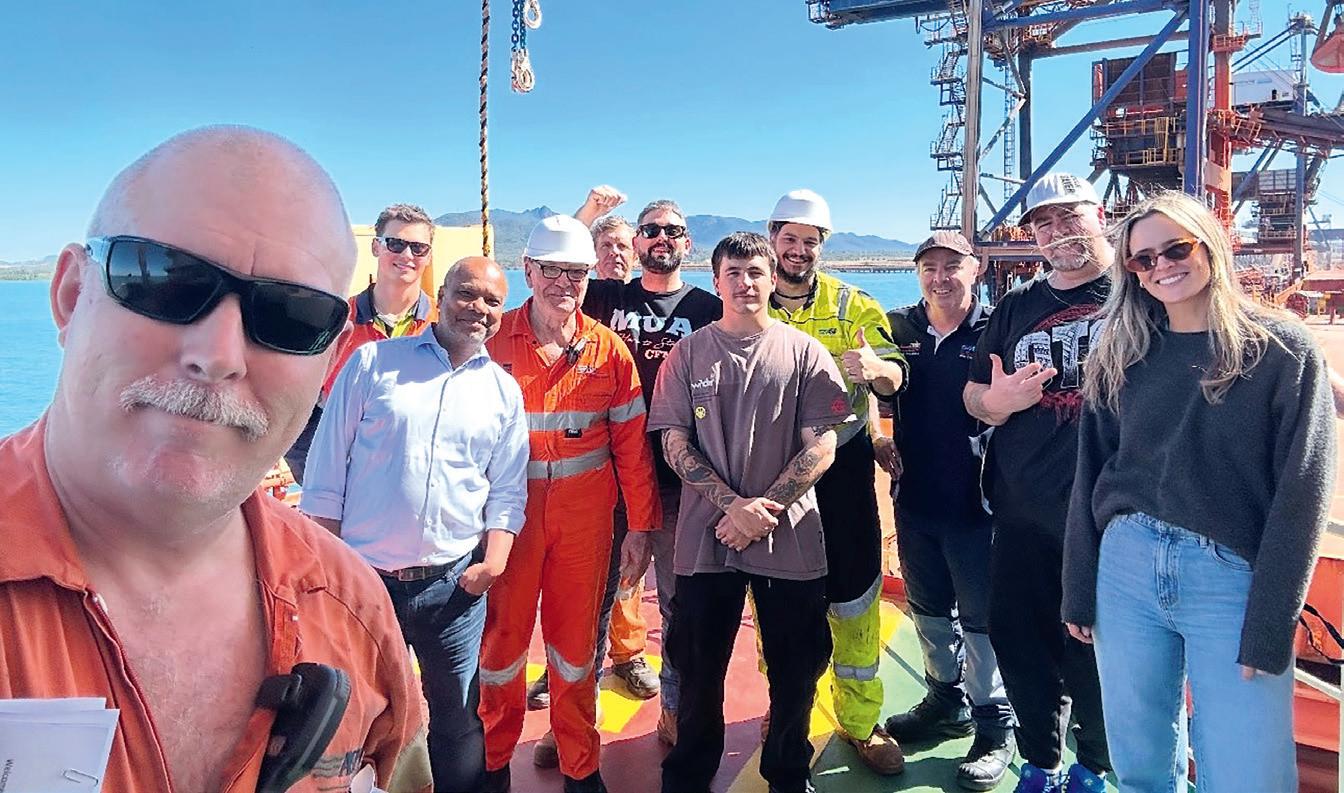
RIO TINTO CCTV PROPOSAL UNDER SCRUTINY
Meanwhile, crews aboard RTM Twarra and RTM Weipa discussed their concerns about Rio Tinto’s proposed rollout of CCTV systems aboard their ships and began discussions around the new EA negotiations that will soon recommence.
The company had initially proposed 28 cameras, but QLD Deputy Branch Secretary Paul Gallagher knocked this down to just eight. The company also wanted the implementation to be subjected to a Memorandum of Understanding, but the MUA insisted it be a legally enforceable Deed of Undertaking. MUA, AMOU and AIMPE have engaged further with the company to ensure the eight cameras will all point outwards and don’t subject workers to invasive surveillance.
“The draft Deed, to be signed in cooperation with the other two maritime unions, includes terms that prohibit the company from using the footage from new CCTV systems in any disciplinary or HR matters,” Ms Macmaster explained to MWJ
In Townsville, Teekay crews aboard the Reliant discussed the ongoing Fleet United campaign for a fresh, national EBA. This has been a massive undertaking by the national bargaining team, and a protected action ballot has been lodged as MWJ goes to print.
“This catch up was a good opportunity for new members to ask questions and seek support and reassurance from the branch as we tackle the stalled negotiation process with management and get ready to take industrial action,” said Macmaster. •
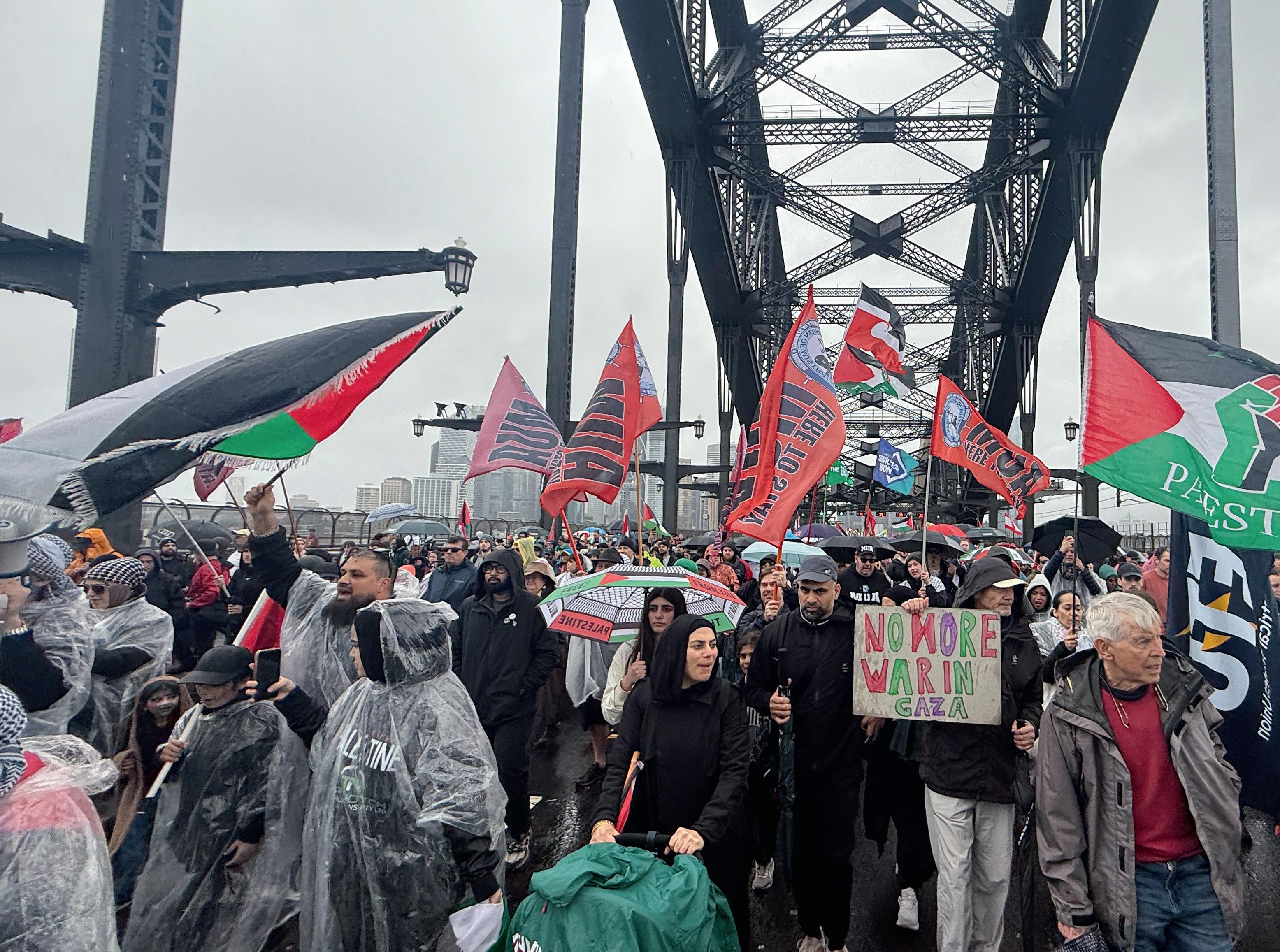
The Maritime Union of Australia expresses its deepest alarm at the catastrophic situation in Gaza and across the Occupied Palestinian Territories.
We join our comrades throughout the Australian trade unjon movement and the International Transport Workers Federation in issuing this statement in accordance with international law and based on the findings of UN institutions, particularly the UN Office of the High Commissioner for Human Rights (OHCHR) and the UN Special Rapporteur on the situation of human rights in the Occupied Palestinian Territory.
Unfolding catastrophe: mass killings, starvation and forced displacement
Since the end of the ceasefire on 18 March 2025, Israel’s military offensive has killed thousands, the majority of them civilians. These operations have included the targeting of people queueing for food and attacks on hospitals, shelters and aid convoys.
Food and aid distribution is increasingly being outsourced to the Gaza Humanitarian Foundation (GHF) which operates outside international humanitarian standards, without UN oversight and in violation of international law. This undermines impartial humanitarian efforts and places lives at risk.
Israel’s continued blockade of key border crossings and attacks on relief infrastructure constitute a deliberate policy of starvation. UN agencies and humanitarian organisations have warned of the risk of a statesanctioned famine.
While we welcome Israel’s decision to support a one-week scale-up of aid, UN agencies and humanitarian organisations have made clear that this grossly insufficient of what is needed. The weaponisation of food, including the targeting of people seeking to survive, must be unequivocally condemned.
According to the UN and OHCHR, Israeli military operations in Gaza
may constitute collective punishment – a clear violation of international humanitarian law. The scale and pattern of attacks on civilians, infrastructure and aid convoys are consistent with the characteristics of genocide.
Evacuation orders and forced displacement have reached new extremes. Over 1.7 million people have been displaced, many multiple times. UN experts warn that proposals to confine the population of Gaza into “closed zones” or “humanitarian islands” resemble a form of mass internment where displaced Palestinians would be held indefinitely under military control. Humanitarian legal experts and aid organisations have condemned these plans as an alarming escalation and a flagrant violation of the Geneva Conventions. The escalation is not limited to Gaza. In the West Bank, Israeli forces and settler militias continue to conduct violent raids, demolish homes and infrastructure and forcibly displace
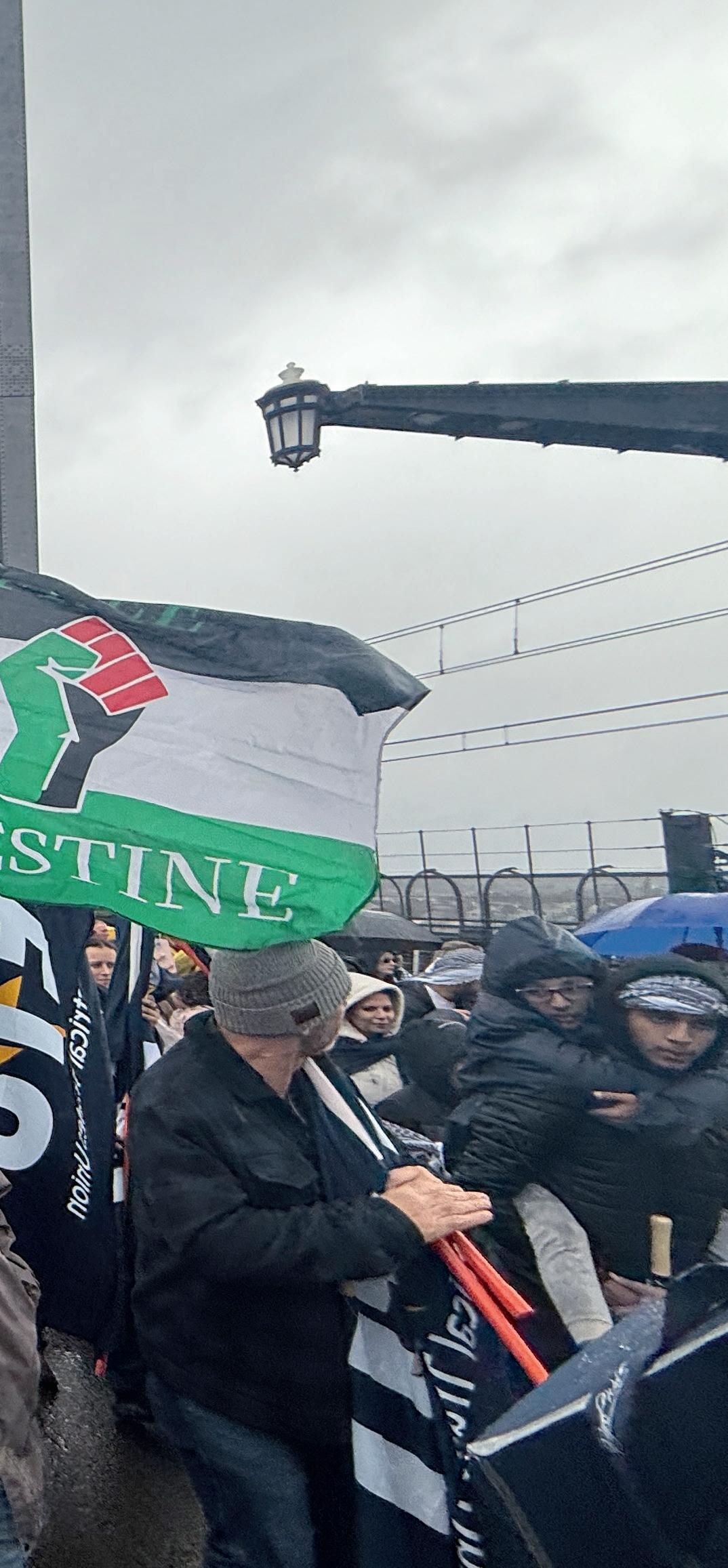
residents – over 40,000 Palestinians since January 2025 alone.
Silencing of accountability and global repression
We are alarmed by intensifying efforts to suppress accountability and silence those advocating for Palestinian rights. The imposition of sanctions by the United States on UN Special Rapporteur Francesca Albanese, following her report exposing the “economy of genocide” and the complicity of businesses in sustaining the war, is a direct assault on international legal mechanisms. Such reprisals target mechanisms of justice rather than the perpetrators of injustice.
At the same time, governments around the world are cracking down on pro-Palestinian speech, including targeting trade unionists, students and civil society groups.
“We are witnessing the deliberate starvation of a people,” said MUA National Secretary and ITF President Paddy Crumlin. “Palestinians are being
bombed, displaced and starved into submission. This is not collateral damage – it is a policy of inhumanity. Food has been weaponised, children, women, men, the elderly, even aid workers – people who have dedicated their lives to helping others – are dying from hunger and aid is being obstructed.”
This crackdown has extended to peaceful humanitarian efforts. Civil society-led convoys, including the Madleen and Handala, were forcibly intercepted by Israeli forces in international waters, despite their publicly declared and lawful mission to deliver lifesaving aid to starving civilians in Gaza. UN Special Rapporteurs have reaffirmed that the people of Gaza have the right to receive aid through their own territorial waters, and that Israel must not interfere with the freedom of navigation protected under international law. They have made clear that Israel must adhere to international law and comply with orders from the International Court of Justice (ICJ) to ensure unimpeded access for humanitarian aid. The interception of these missions violates international law, criminalises solidarity and only prolongs the denial of aid to Gaza’s besieged population. The 17-year blockade must end.
“The global labour movement cannot look away. Our values demand that we speak out. We cannot accept a world where international law is trampled and starvation is being inflicted on civilians,” said Paddy Crumlin.
Global transport workers taking action
Transport workers are standing up.
International Transport Workers Federation affiliated and non-affiliated dockworker unions have taken direct action to block weapons shipments to Israel. Meanwhile, transport workers including seafarers and aviation workers remain at risk: attacks on commercial vessels in the Red Sea and strikes on Yemeni aircraft endanger maritime and aviation workers.
“These acts of solidarity uphold the core values of our movement, and we call for the protection of all transport workers and an immediate de-escalation of regional conflict,” said Paddy Crumlin.
The MUA reiterates its calls for:
• An immediate and permanent ceasefire;
• The unconditional release of all hostages and prisoners held without due judicial process;
• An end to the illegal occupation of Palestinian and Arab territories, occupied since 1967;
• Implementation of UN Security Council Resolutions 242 and 338 and a two-state solution based on justice and peace;
• Full accountability for all international crimes, including through the International Criminal Court;
• An end to the impunity of companies profiting from the occupation and war;
• An immediate opening of all borders to enable convoys of food and humanitarian aid to all parts of Gaza;
• All states to implement the ICJ decisions without any delays.
The way forward: peace, justice and accountability
We welcome the decision of the International Labour Conference to recognise Palestine as a non-member observer state at the International Labour Organization. The ITF also calls on countries to recognise the State of Palestine, as a meaningful and necessary step towards achieving a lasting peace through a two-state solution.
The MUA and the ITF fully endorse the UN’s urgent call for immediate and decisive action to halt the ongoing atrocities. We urge the global trade union movement to mobilise all means at its disposal to hold companies to account and to ensure that they are not complicit in international and atrocity crimes, but instead uphold justice, human rights and international law.
“We must uphold international law, protect civilian life and push for a just resolution rooted in dignity and rights for all,” said ITF General Secretary Stephen Cotton. “Now is the time for global solidarity. The lives, dignity and future of the Palestinian people – and of peace in the region – depend on it.” •

Palestinian aid chief and union aid partner calls for international solidarity as 2 million lives now at risk. Words and photos by Zoe Reynolds, retired editor of Maritime Workers Journal
Sami Khader, Director General of the MA’AN Development Centre, speaks from his head office in Ramallah, West Bank, Palestine, as a genocide unfolds around him. People are dying in their hundreds each day –by bombardment, by starvation.
Unlike Jerusalem, Ramallah remains relatively calm. No Israeli occupation soldiers patrol the streets or aim rifles down from towers onto people. Its buildings are intact; its museums, poets, and history still alive, its streets lined with cafes, trees, and parks. But illegal Israeli settlements encircle the city. Israeli military night raids escalate.
Sami speaks with urgency. Facing the greatest war crime of this century, he calls on the world to act.
“What we need is political solidarity, not just food, water, and hygiene kits,” he says. “We need to preserve our people’s dignity. We need pressure on Israel to stop their war. We need to have all people around the world, all countries, to stand with the people of Gaza. Because standing with Gaza is standing with humanity.”
MA’AN is a partner of Union Aid Abroad – APHEDA, which has raised over $1 million for Gaza since the bombardment began. The MUA alone raised $50,000 in one night at its national conference in Adelaide in March 2024.
Dockworkers in Australia, Belgium, the USA, Canada, Italy, Tunisia, Morocco, Sweden, and South Africa have joined global protests against Israeli shipping. (See next page.)
When Sami spoke in March, Israel had killed 48,000 Palestinians in Gaza. By June, the official death toll had risen to 55,000. The Lancet medical journal in January estimated the real figure is 40 per cent higher. Around 70% of the dead are women and children—18,000 of them children. Another 17,000 children have been orphaned.
“The majority of those killed are
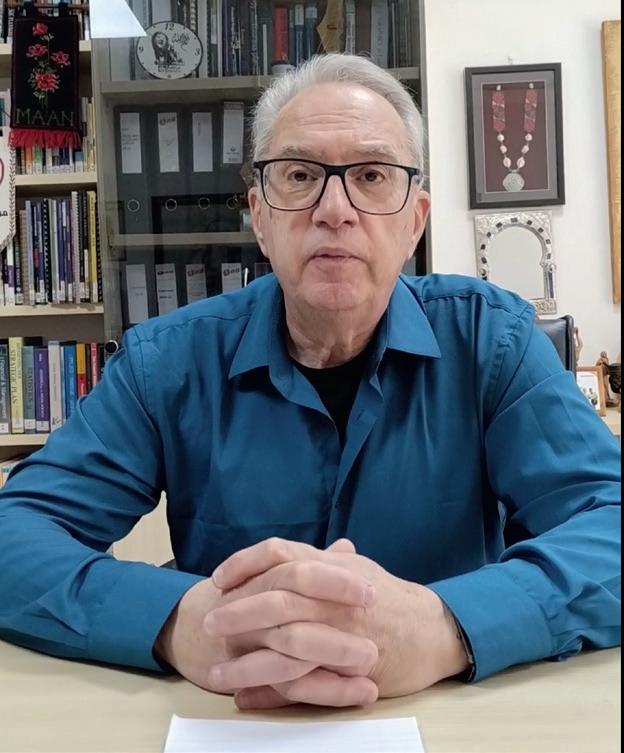
“Now Israel is also using hunger as a weapon to force Palestinians to leave,” he says. “There’s no clean water, no food, no electricity. Nothing remains but for us to try to save lives by providing food and water.”
People queue hours for toilets. Women shave their heads due to lack of soap. Doctors amputate children’s limbs without anaesthetic.
Sami worked 18-hour days for eight months after the war broke out in October 2023, taking time off only after he suffered a heart attack and underwent surgery.
The majority of those killed are civilians. Another 140,000 more are injured, 15,000 are homeless without even a tent.
civilians,” says Sami. “Another 140,000 more are injured, 15,000 are homeless without even a tent.”
What is more alarming, is that over two million Palestinians now face imminent death or forced displacement.
Israel has dropped 100,000 tonnes of US-supplied bombs on Gaza—more than were dropped on Dresden, Hamburg, and London combined in WWII. Gaza is just 365 square kilometres - smaller than the Thai resort island of Phuket.
The mega bombs are so destructive that people write the names of loved ones on their arms and legs to help identify them when they are blown apart.
“Nothing is left,” says Sami. “Eightyfive percent of homes are destroyed. Most hospitals are non-functional. All 12 universities, over 500 schools, mosques, churches, museums, libraries —gone. Even Gaza’s beautiful hotels on the foreshore have been flattened. Israel has slaughtered 92% of farm animals.”
“At least I received medical care,” he says. “We’ve lost 11 staff—all under 30.”
MA’AN employs over 270 people in Gaza and 100 in the West Bank.
One of the last worker killed was a young mother, mortally wounded while preparing food parcels at the warehouse. Her husband begged in vain for her to get urgent medical treatment in Egypt.
In May, another MA’AN worker, Zarifa Abu Ghazaleh, was killed along with her four children, husband, father-inlaw, and brother-in-law—massacred in their tent.
“They are not statistics,” he said. “This is the systematic erasure of humanity.”
As of May 2025, 437 humanitarian workers—many deliberately targeted—have been killed, making this the deadliest war for aid workers in recorded history.
“Eighty-five percent of our staff lost their homes,” says Sami. “Some lost over 60 relatives.”
Yet amidst the bombardment, MA’AN distributed 205,000 food parcels (enough for six people for two weeks), 25,000 sacks of flour, 100,000 kg of bread, 25,000 kg
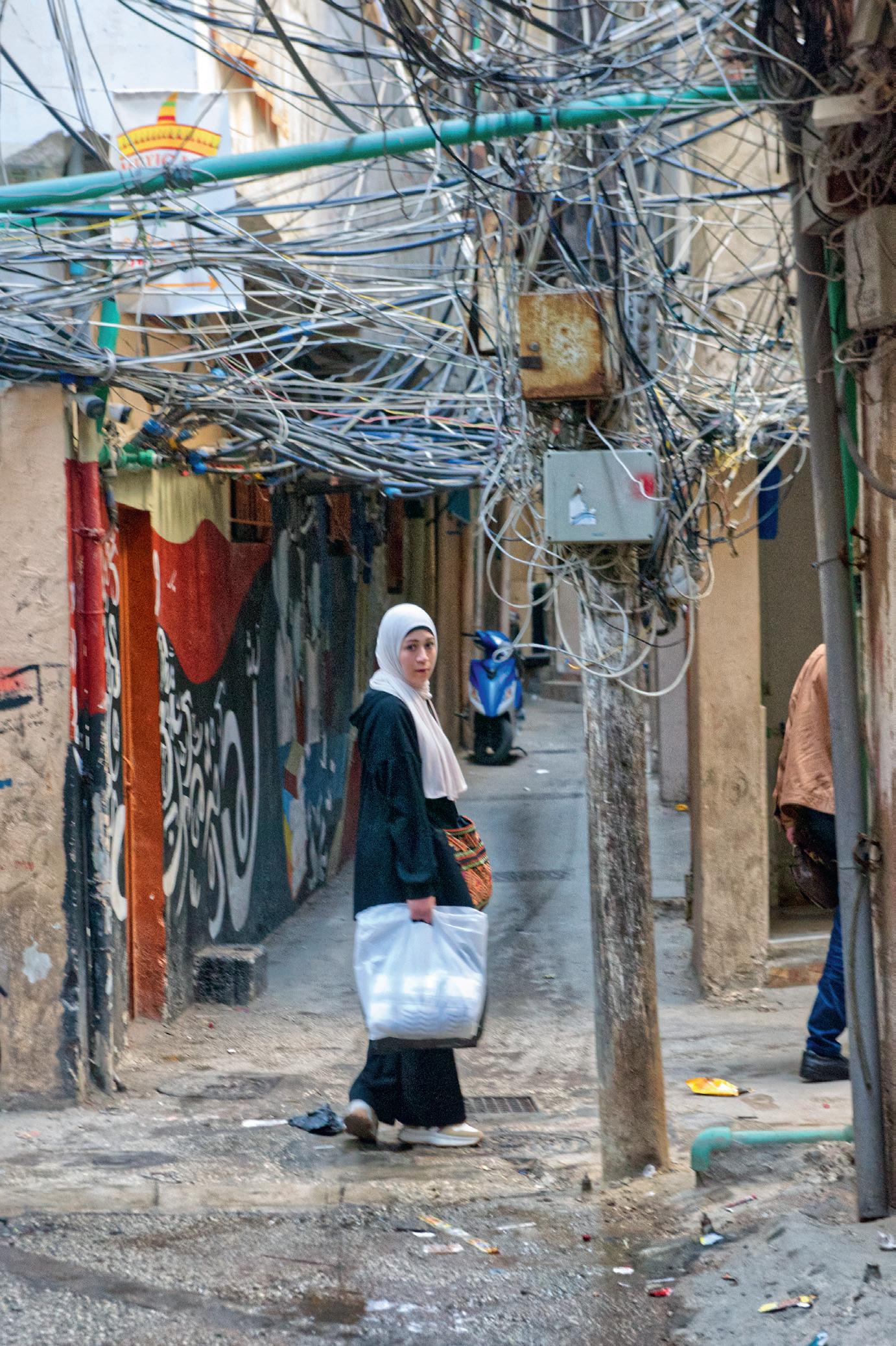
of vegetables, 3,200 sacks of milk, children’s clothing, 3,360 tents, 28,000 hygiene kits, 30,000 nappies, 8,000 blankets, 72 million litres of drinking water for hospitals, shelters and neighbourhoods, while also cleaning 30 shelters daily and helping people grow crops as of March.
“We reached over a million people,” he says. “We also served 195,000 hot meals each for a family of five – meals of rice with chicken, half a chicken if they are lucky. Now it’s just rice.”
“We built 183 toilets. People wait in line for three hours or more to go to the toilet or have a shower, if there is enough water for a shower,” says Sami. “You can reach London before you reach the toilet.”
MA’AN has provided psychosocial support for 18,000 mothers and children each month and distributed US$3 million in cash.
“But it’s not enough,” he says. “What
enters Gaza does not meet more than 20 per cent of what is needed. (For three months) nothing was entering Gaza. Water is down to one working pipeline.”
Only one branch of one bank is still working online. Israel has allowed no cash to reach Gaza. To cash your salary you have to pay money changers or grocers a 40 per cent commission.
Once the borders were closed to all international aid, MA’AN relied on buying food from markets at very high prices for their Gaza kitchens.
Yet even into the 10th week of the Israeli aid blockade in June, MA’AN workers on the ground were providing hot meals to displaced families in Gaza and fresh fish meals to Al Rantisi hospital in Gaza City.
By May, most shelves were bare, kitchens closed, water cut off. Ninetyfive percent of homes were gone.
People surviving bombs face starvation. UNICEF reports 9,000 children hospitalised with acute malnutrition this year; the UN warned on May 21, 14,000 babies could die within days if no aid reached them. All 2.3M Palestinians face imminent starvation or ethnic cleansing, but the children die first.
On social media, images of living skeletons join those of the dead pulled from the rubble. Grown men clutch their children and cry, begging, “Stop! Don’t scroll.”
Palestinians post farewell messages to be shared after their deaths.
“This might be the last night of my life,” writes Omar Hamad. “Maybe I’ve already died and I’m just an angel watching what’s left of my body and the last dream I had—of buying a bag of flour. I can’t tell life from death anymore except for the little bird that sings in fear after every explosion.”
Under international pressure on 20 May, Israel allowed a trickle of aid into Gaza. A private contractor headed by a former CIA officer now controls distribution, often by herding people into cages. Wikileaks reports the company has connections with the Israeli military and intelligence. ‘Aid workers’ fire on people seeking food, according to hospital and eye witness reports.
Despite relentless bombardment, resistance fighters emerge from rubble, wielding homemade rifles and RPGs, engaging in close combat before vanishing.
They are recycling 5–10 tonnes of unexploded US bombs to ambush tanks. In retaliation, Israel bombs tents sheltering civilians.
Far-right Israeli ministers and ultraOrthodox rabbis invoke scripture to justify killing women and children— including babies who breastfeed— citing Torah verses 1 Samuel 15:3 and Psalm 137:9.
This genocide is the first in history to be live-streamed. Courageous Palestinians film their own deaths. Israeli soldiers post selfies of their war crimes.
Despite UN condemnation, no action has been taken. In November 2024, the International Criminal Court found grounds to charge Israeli leaders Netanyahu and Gallant—as well as a now-deceased Hamas figure—with war crimes.
Western democracies, led by the US, are complicit. The US has sent Israel $22 billion in military aid and slapped sanctions on the ICC judges.
Justice is now left to groups like the Hind Rajab Foundation, named after a six-year-old girl shot 335 times, while her pleas for help were broadcast worldwide. Her killer has been identified as Lt. Col. Beni Aharon of the IDF’s 401st Armored Brigade.
Despite a 2024 International Court of Justice ruling declaring Israel’s West Bank occupation illegal, settler raids continue, backed by military force to seize homes and farmland. Israel military closures of villages and roads cripple Palestinians society. Denial of revenue to the Palestinian Authority means nurses, teachers and other public sector workers are unpaid.
Since Trump’s re-election, Israel has resumed full-scale bombardment of Jenin and Tulkarem. Netanyahu has offered Trump Gaza as real estate. Trump also received $100 million in election funding from American Jewish billionaire Miriam Adelson, reportedly in exchange for Israeli annexation of the West Bank.
The creation of Israel itself was a colonial pact: a transaction between banking tycoon Rothschild and British colonialist Lord Balfour in 1917. Palestinians had no say. Some 760,000 people were forced out or killed to make room for the Jewish state. The United Nations recognised Israel in 1948 as part of a two-state solution in sympathy with the Jewish people after the Holocaust of WWII. But the UN has yet to recognise Palestine as the US wields its veto in the security council.
Amid the violence, treachery and western complicity, MA’AN continues its work. In Jenin, they provided

blankets, water tanks, and sewer infrastructure. In Tulkarem, $700,000 in pipes and fittings.
“Now the Israelis have bulldozed the streets and the infrastructure,” says Sami. “We face aggression and humiliation daily.”
Are you safe?
“No one is safe,” he said. “They have come to this office in the past. Our people have been arrested, our projects destroyed.
“They bulldoze the homes we renovate, they confiscate materials we provide farmers, they are ethnic cleansing families in the south where we work with shepherds. They are destroying their homes and animal shelters we provided. Whatever you build, they destroy. Then we have to build it again and again.”
USAID funding cuts have frozen 42 projects, costing MA’AN $250 million, 400 jobs, and 600 contractors.
“We’ve been told to expect 10–20% cuts across the West Bank and Gaza,” says Sami.
Some projects are frozen. Others cancelled. Some donors in countries
This is no longer a humanitarian crisis. It is a war on humanity itself. To stand with Gaza is not to take sides in a conflict. It is to defend the core values of civilisation.
backing the genocide have pulled out completely.
In May, as Israel publicly announced its endgame was full annexation of Palestine, Sami issued a final plea:
“We reach out to you with hearts shattered by grief, suffocated by injustice, and inflamed by the unbearable silence of the world. A genocide is unfolding—relentless, systematic, deliberate—before our eyes in Gaza.
“Every single day, more than 120 lives are violently extinguished, most of them women and children. Entire families are being annihilated, buried beneath the rubble of makeshift tents they believed would provide shelter. There are no safe spaces. There are no sanctuaries. There is only the chilling anticipation of the next airstrike.
“We issue this urgent call to every conscience that has not yet surrendered:
Do not look away.
Raise your voice.
Pressure your governments.
Demand an end to this genocide.
“This is no longer a humanitarian crisis. It is a war on humanity itself.
“To stand with Gaza is not to take sides in a conflict. It is to defend the core values of civilisation.” •
The MUA strongly condemned the attack on the humanitarian ship The Conscience, which was struck twice by drones in international waters off Malta, putting the lives of thirty human rights defenders and seafarers at grave risk and violating international law.
Such acts threaten the fundamental rights of seafarers and dockworkers everywhere and undermine the principles of safe navigation and humanitarian solidarity that our industry upholds.
The mission of the Peace Flotilla – to deliver life-saving aid to Gaza’s besieged population –reflects the core values of maritime workers: solidarity, justice, and the right to safe passage.
The delivery of vital humanitarian aid must not be obstructed. •
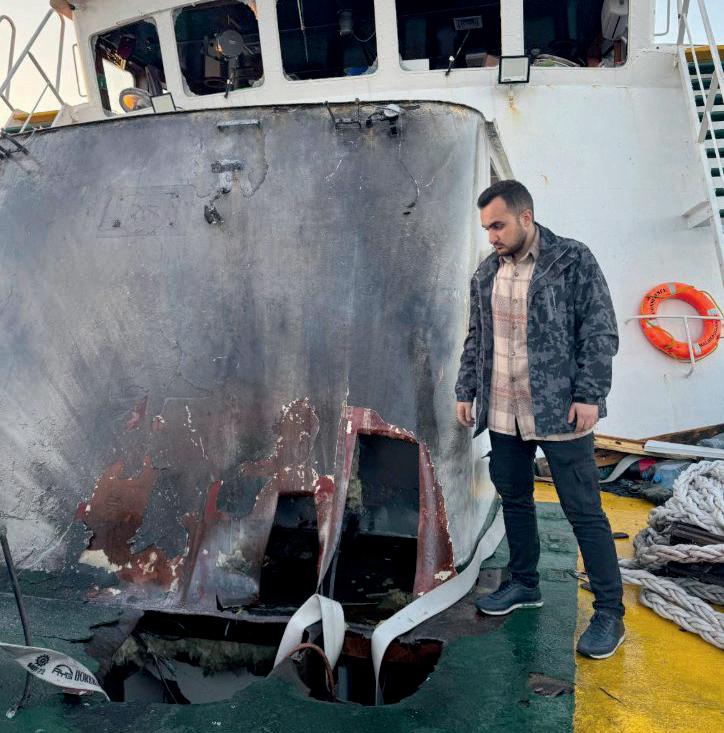
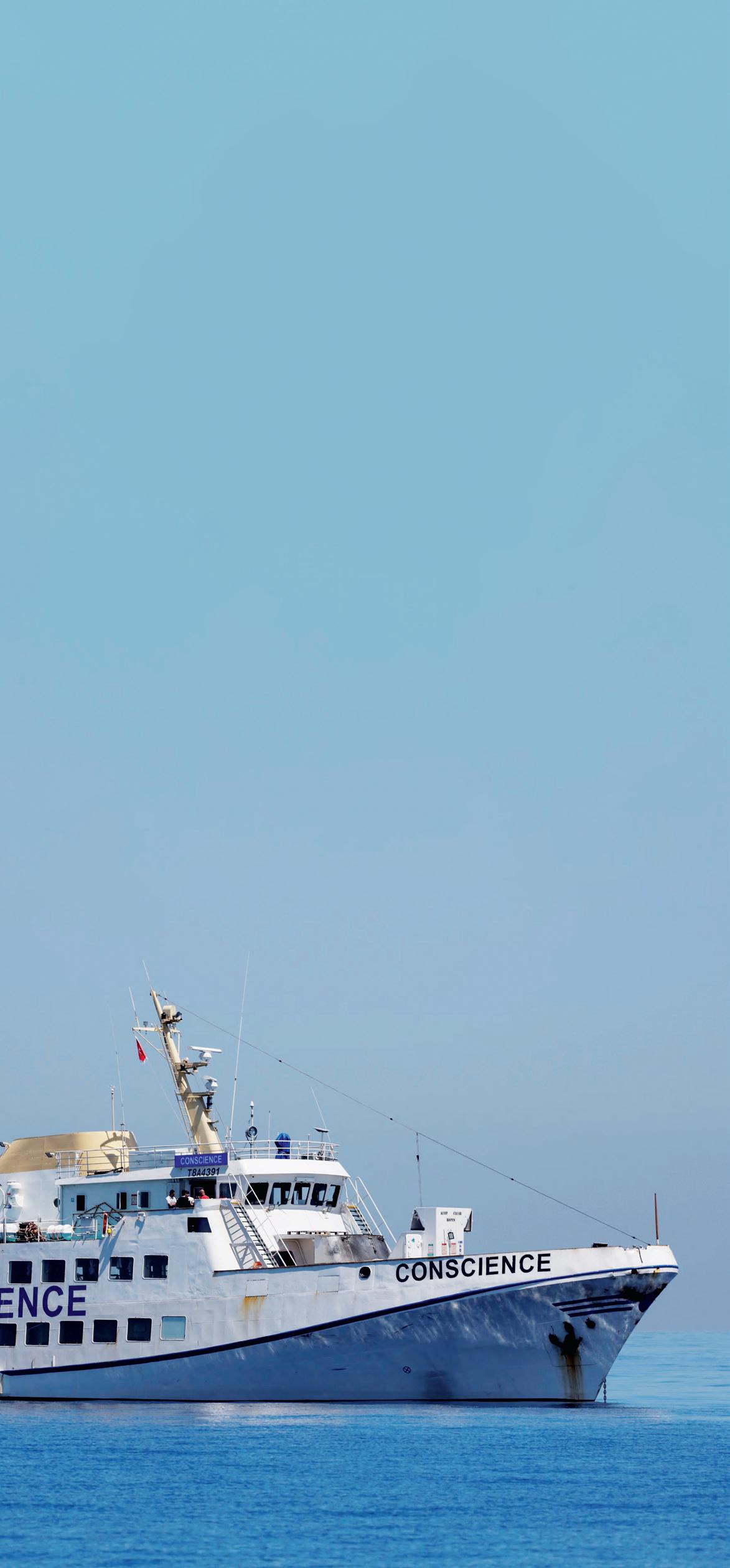
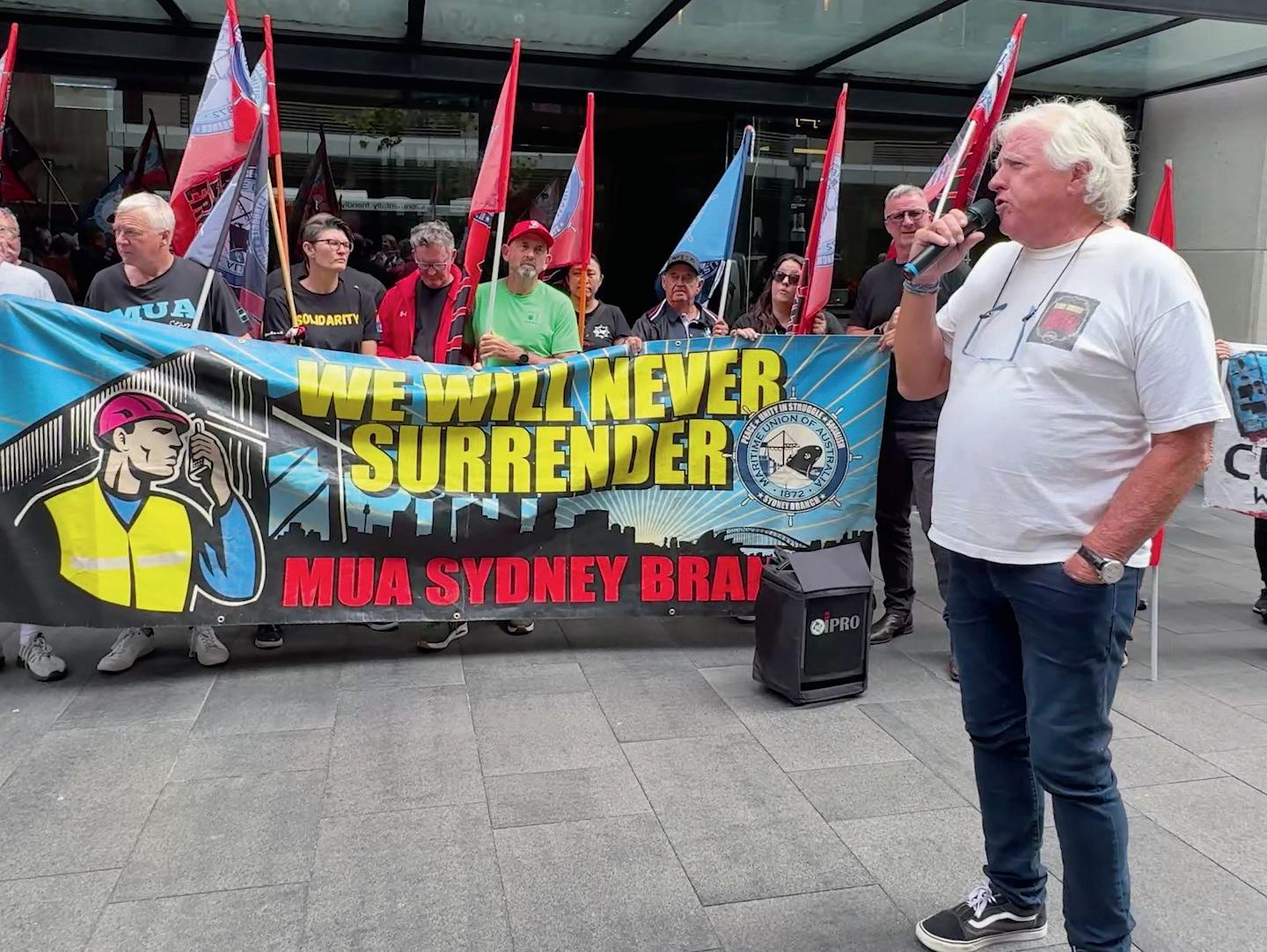

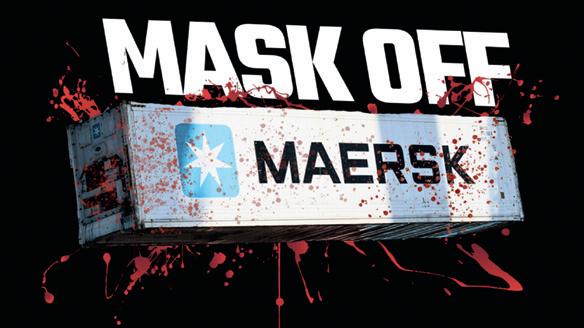
The MUA converged on the Sydney offices of Maersk Shipping in March to call out the company’s commercial ties with the bombardment of innocent Palestinians in Gaza. Research presented to the MUA shows Maersk has carried at least 2000 shipments of arms from the US to Israel since 2023.
At the rally outside Maersk’s offices, MUA National Secretary Paddy Crumlin said, “This company must stop putting profit before moral value. They have a responsibility in their business to have balance and transparency and to take ownership for their actions.
“Massive international transport companies like Maersk must accept their moral responsibility to use their enormous power and wealth within the supply chain to be accountable for what they move and their methods of doing business around the world,” Crumlin explained.
“We need a lasting peace and recognition for the Palestinian people who are facing constant horrors and violence in their own country. They deserve sovereign rights, democracy and security – things the rest of us take for granted,” he added.
MUA Assistant National Secretary, Jamie Newlyn, told the rally: “We must ensure Maersk and other major global transport companies do not further participate in trade and profiteering arising from the bloodshed and violence that is being wrought upon families and communities in Palestine”. •